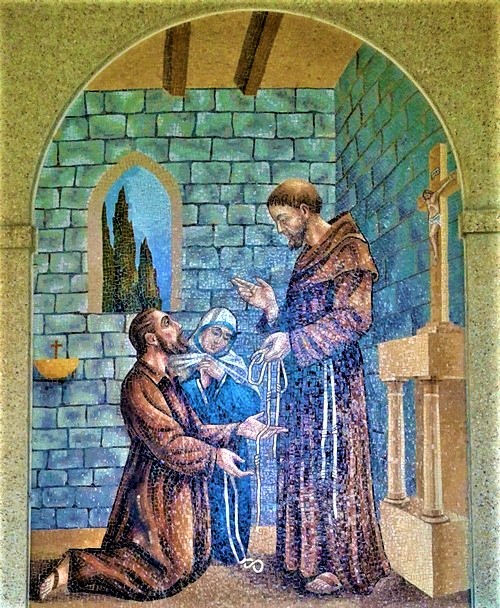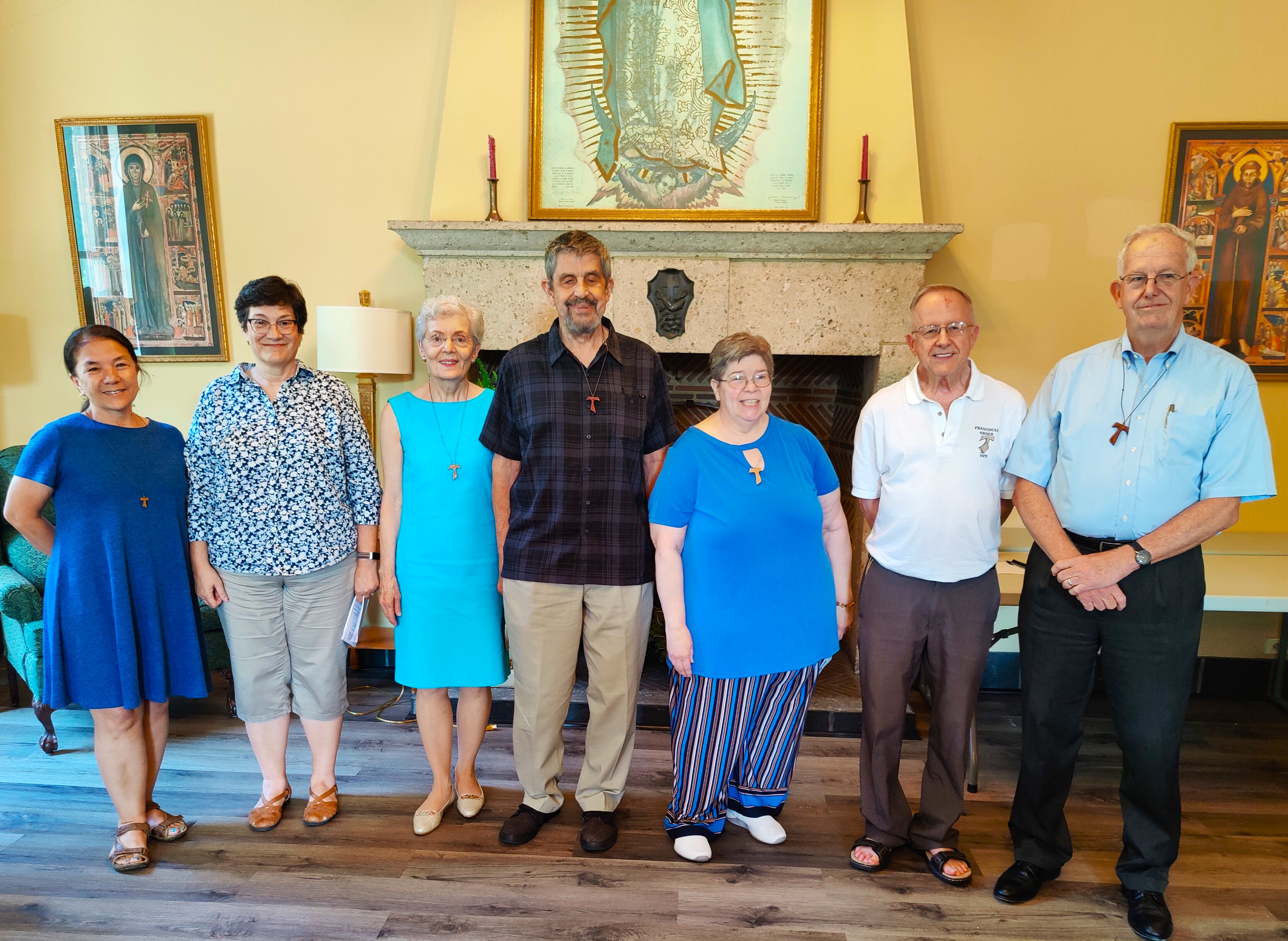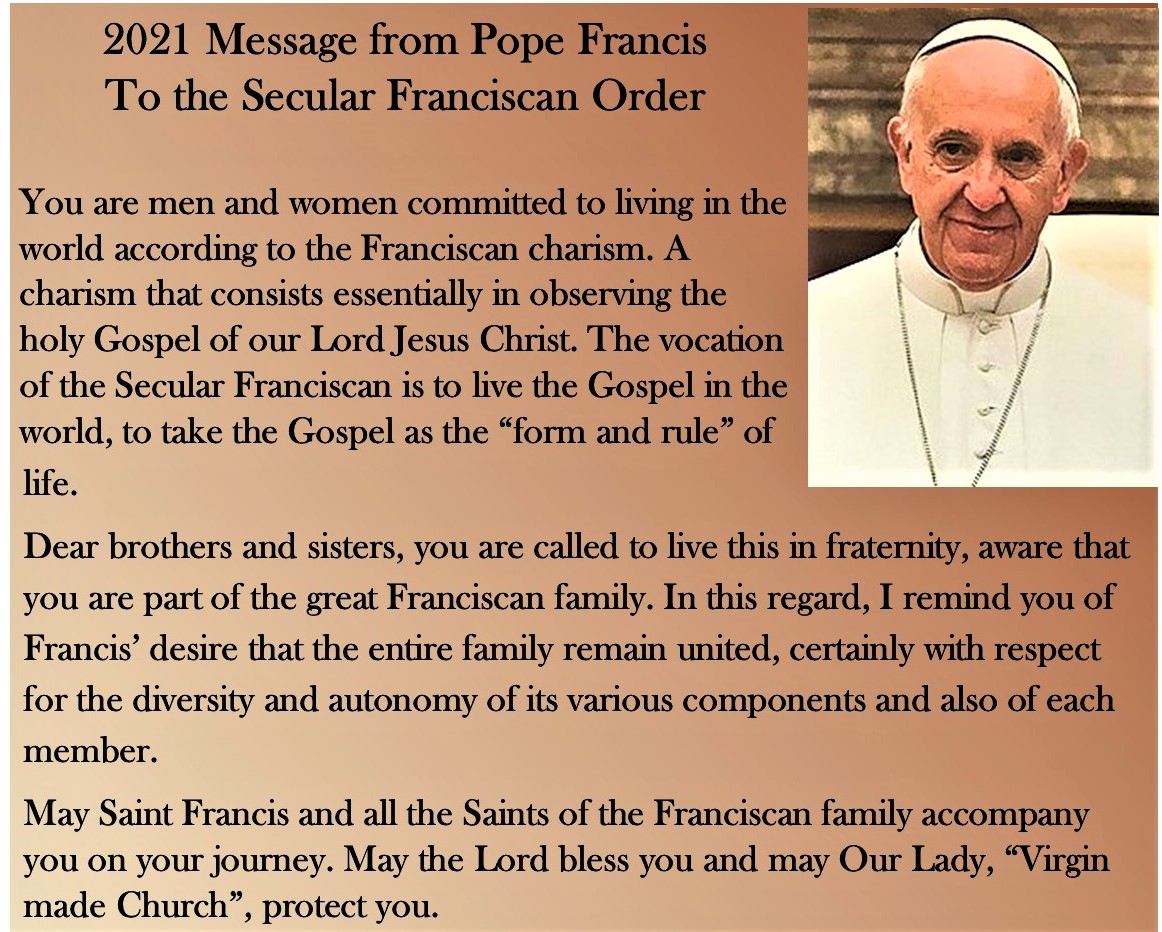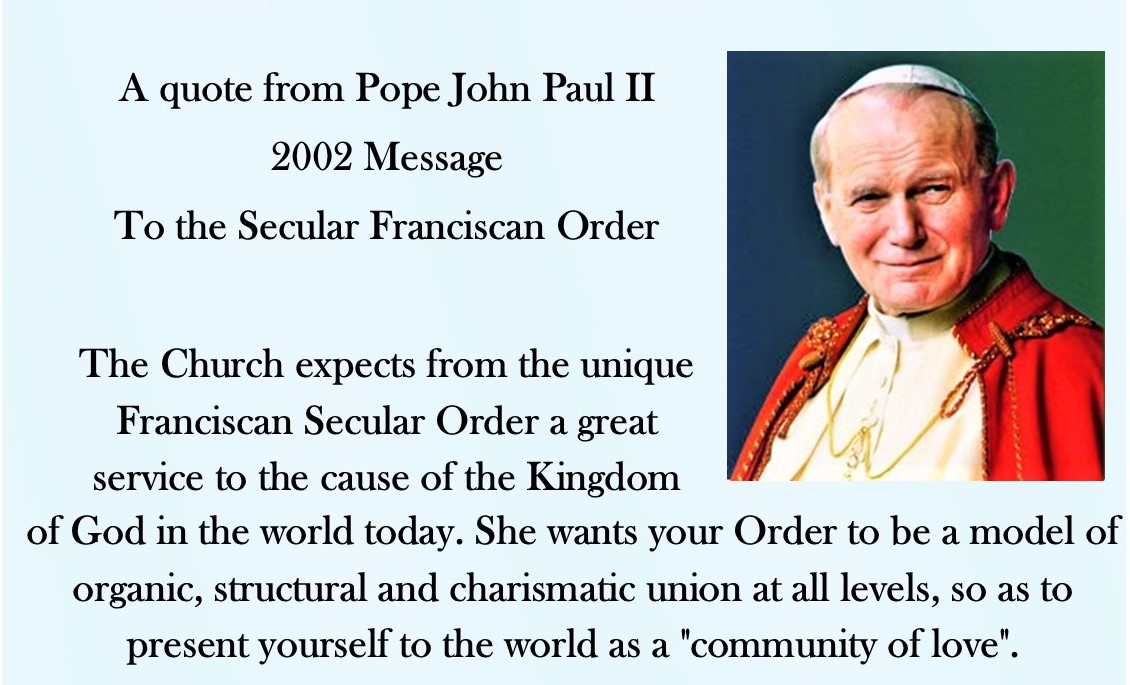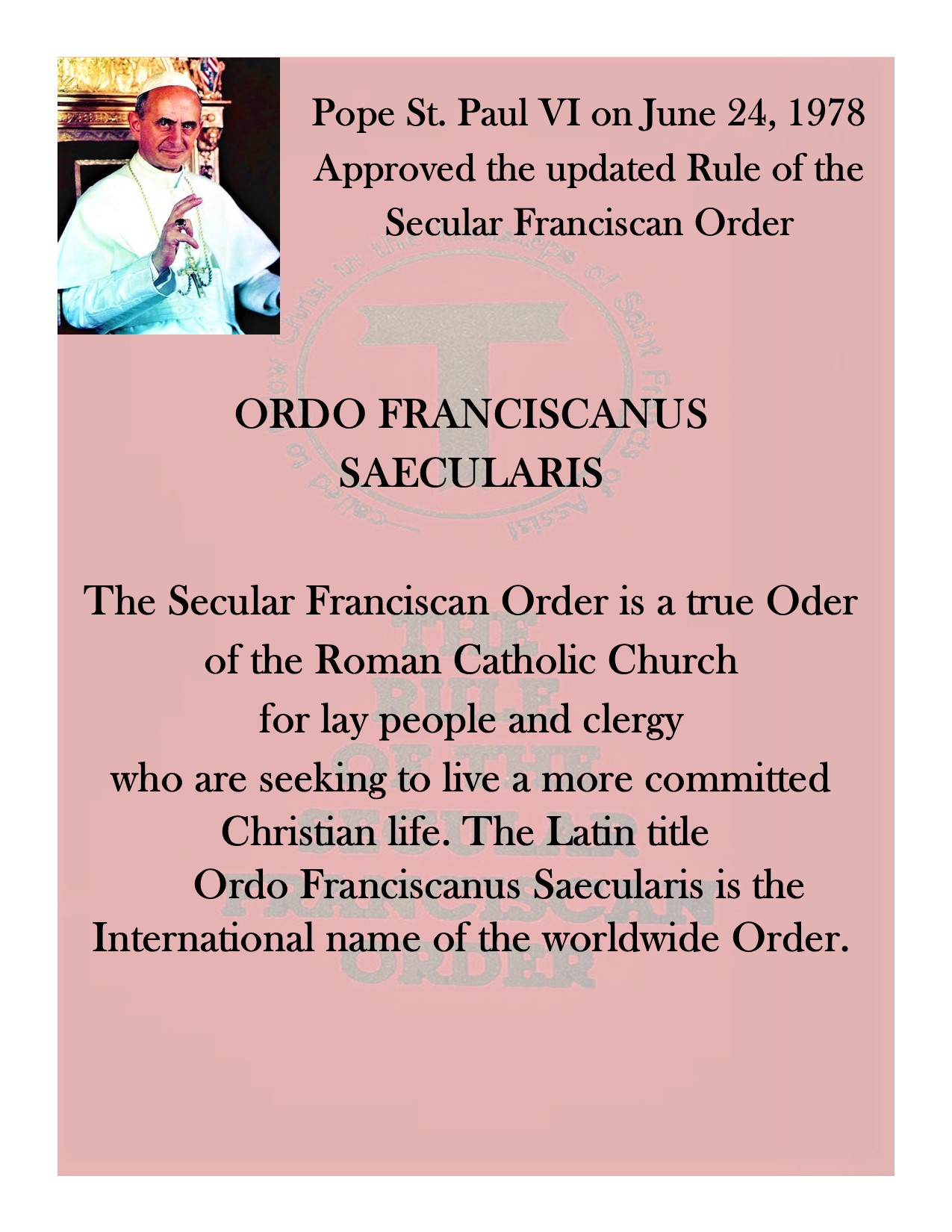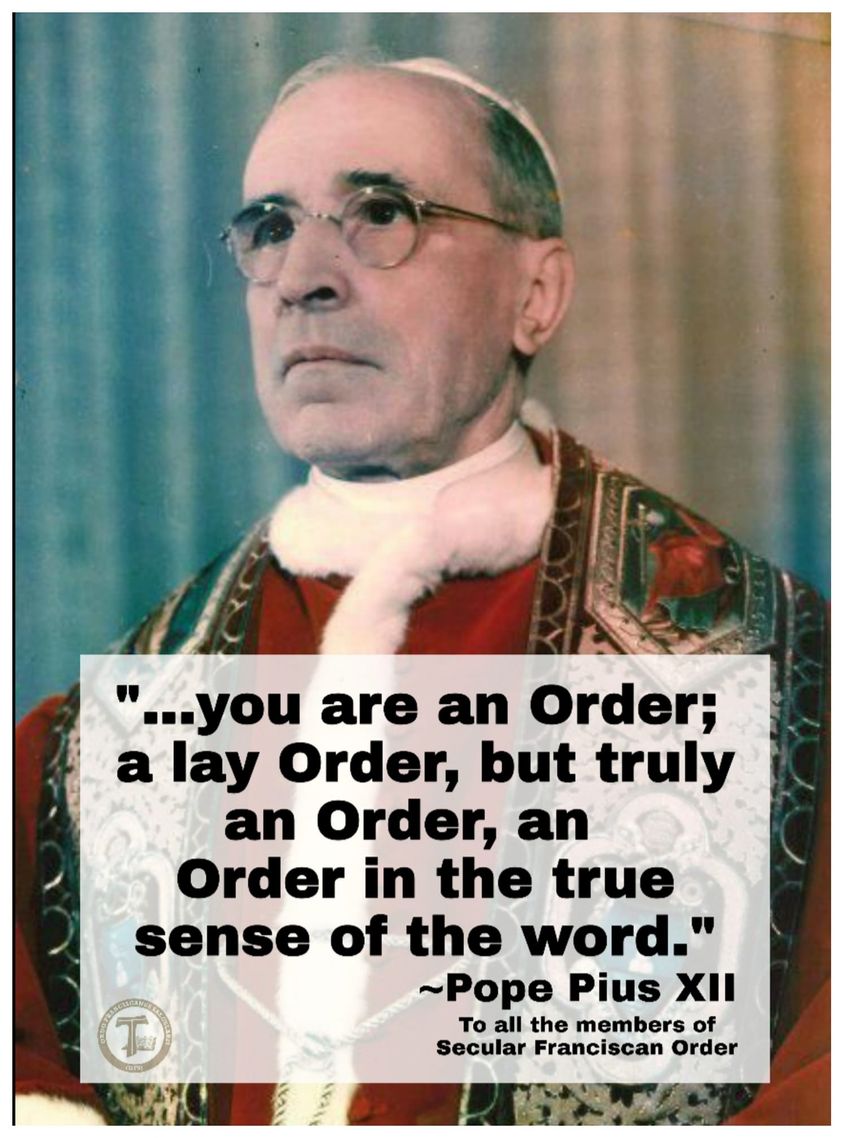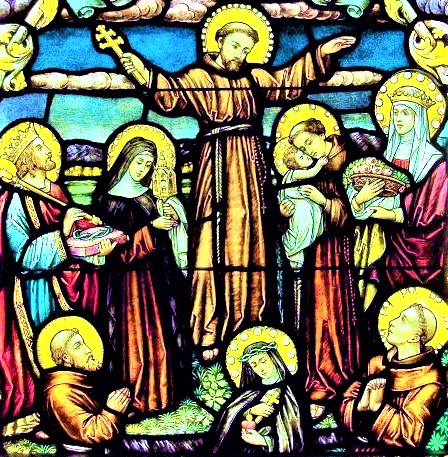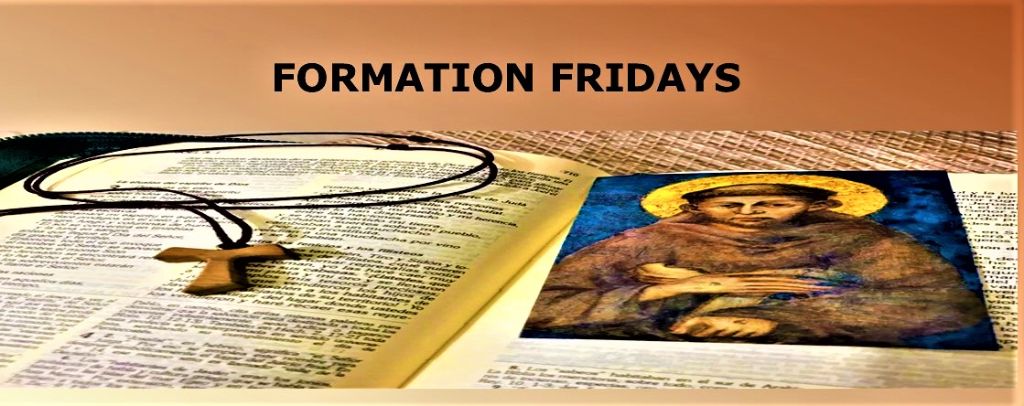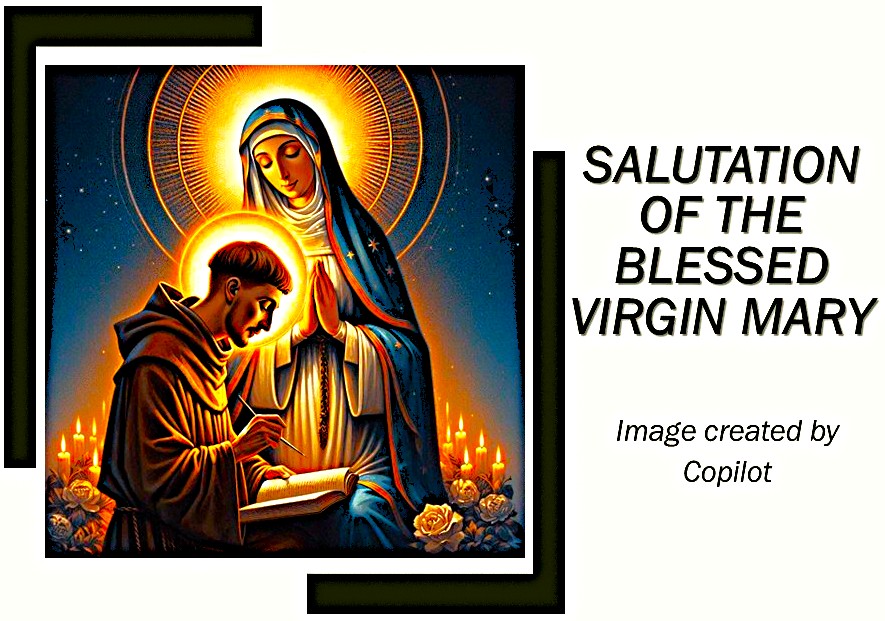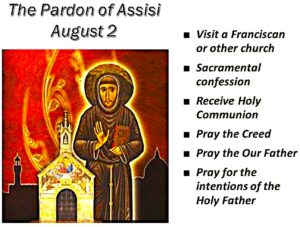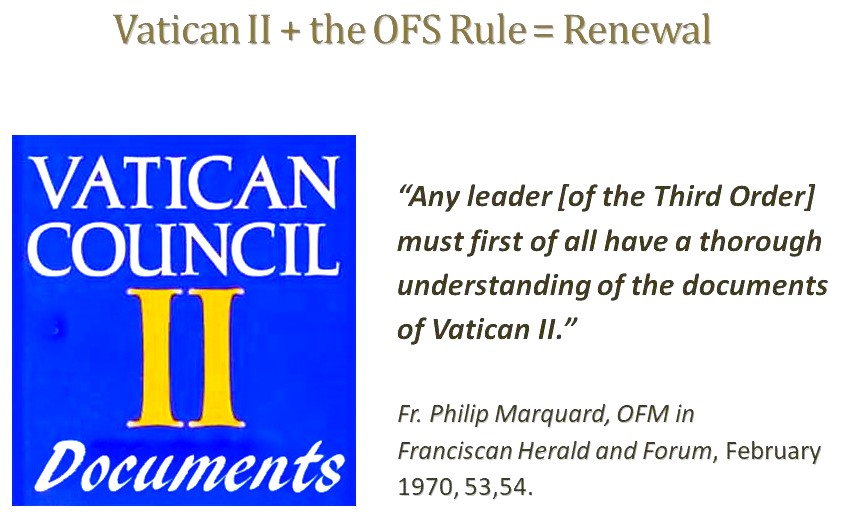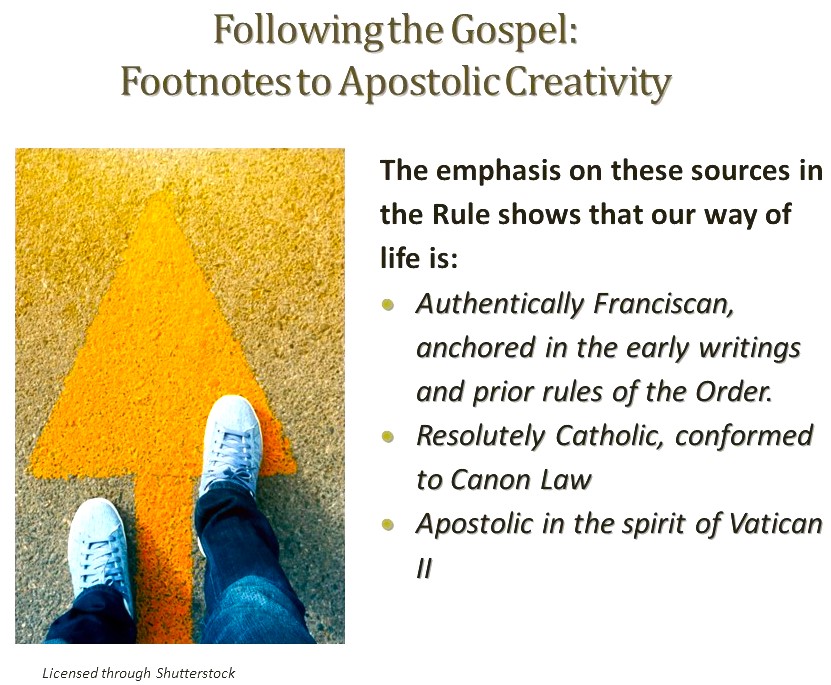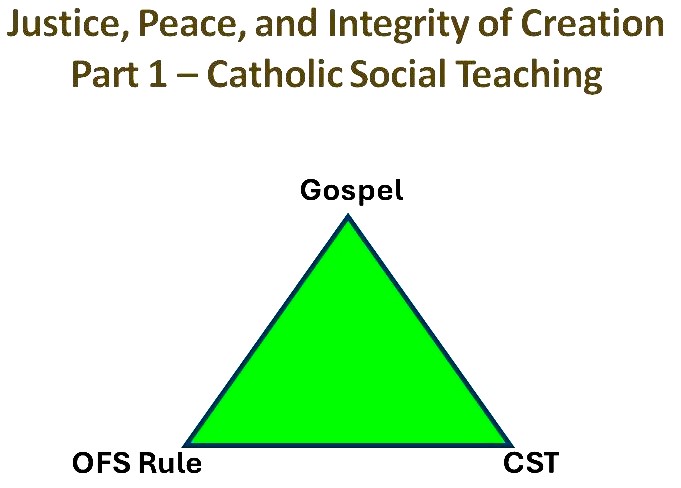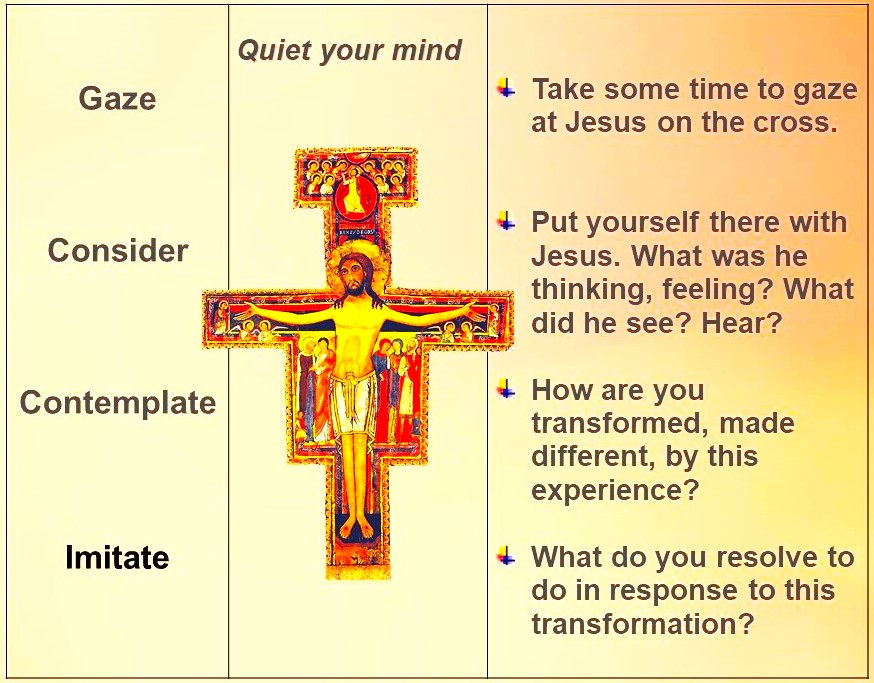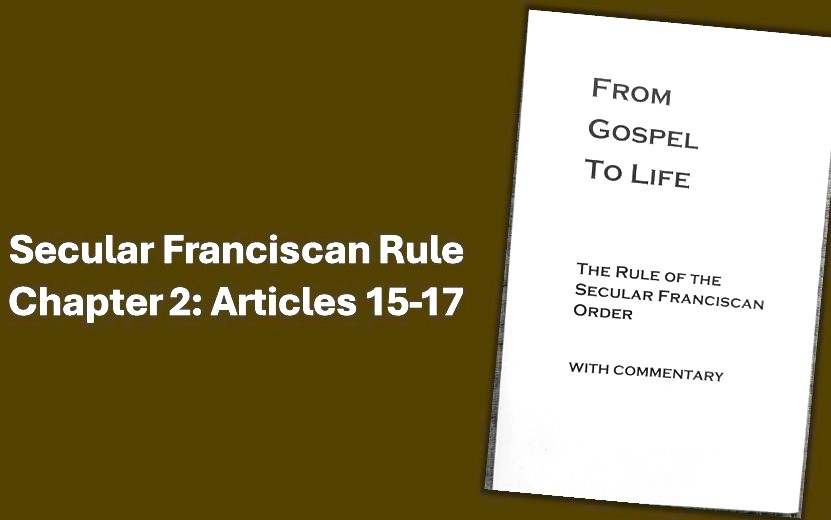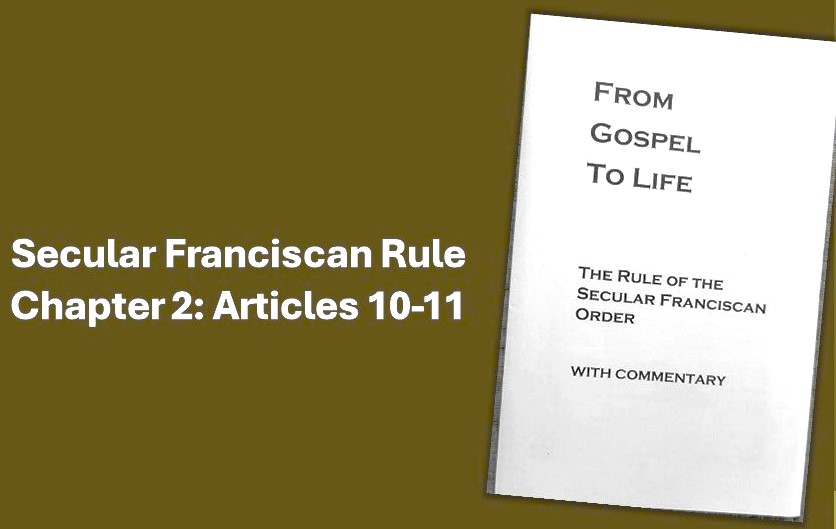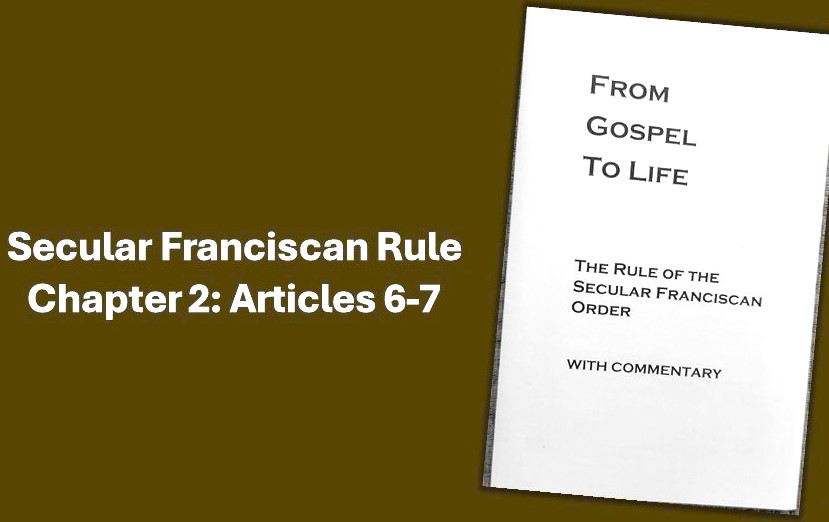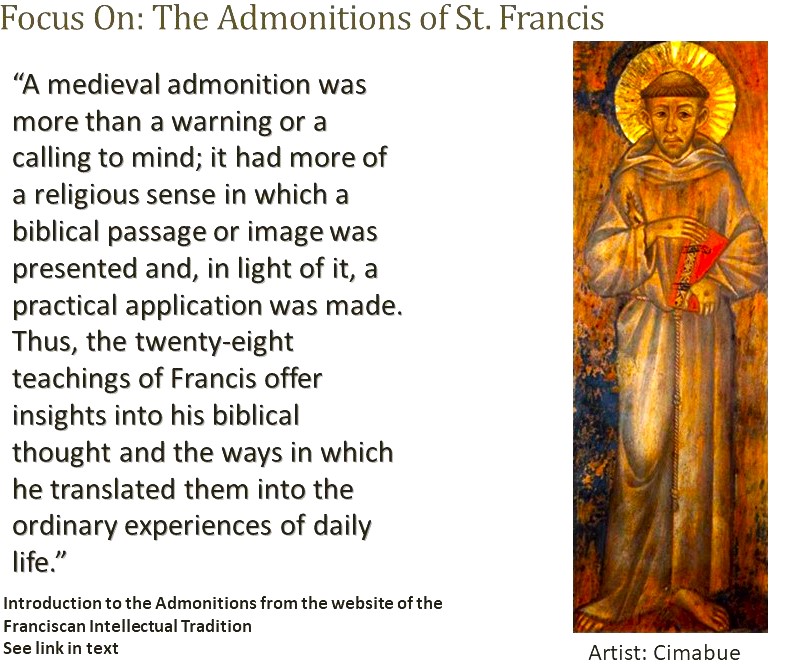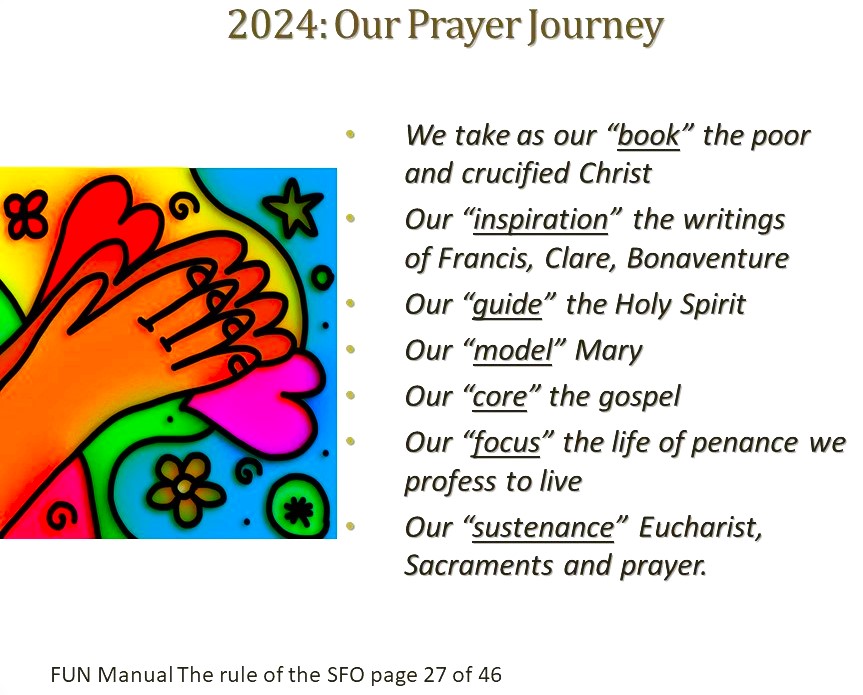To view past Formation Fridays
(Click on the Icon below)
***********************************
Formation Friday May 9, 2025
Please share with your local fraternity
t. Francis had great devotion to the Blessed Virgin Mary because of her role in the Incarnation and the example she set for us. He made her the protectress of the Order and thereby of the entire Franciscan family.
“This simple collection of titles forms a litany of greetings describing Mary’s role in the plan of salvation. The manuscript tradition suggests a close tie between this piece and the following, the A Salutation of the Virtues, and, therefore, presents the Virgin Mary as the model for every Christian who responds to God’s virtuous presence in his or her life.”
A Salutation of the Blessed Virgin Mary
1Hail, O Lady,
Holy Queen,
Mary, holy Mother of God,
Who are the Virgin made Church,a
2chosen by the most Holy Father in heaven
whom he consecrated with His most holy beloved Son
and with the Holy Spirit the Paraclete,
3in whom there was and is
all fullness of grace and every good.
4Hail His Palace!
Hail His Tabernacle!
Hail His Dwelling!
5Hail His Robe!
Hail His Servant!
Hail His Mother!
6And hail all You holy virtues
which are poured into the hearts of the faithful
through the grace and enlightenment of the Holy Spirit,
that from being unbelievers,
You may make them faithful to God.b
Please read the references to Mary above. Read through once. Then prayerfully consider each word and sentence a second time.
- According to the phrases St. Francis used to describe the Blessed Mother, what do we learn about how he thought of her?
- Choose four words or phrases that touch you deeply. Spend some time thinking about why you chose those words.
- What does this Salutation, tell us about how St. Francis prayed?
- How do you include the Blessed Mother in your prayers each day? What do you say to her?
- Personal challenge: See if you can write some short phrases/praises of the Blessed Mother that are personal to you.
*************************
Formation Friday May 2, 2025
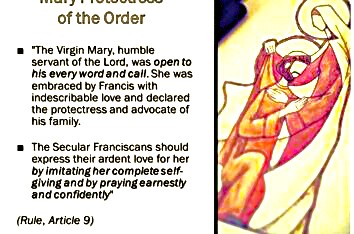
Please share with your local fraternity
Mary Protectress of the Order
To begin the month of May, we turn our eyes to the Blessed Mother who was so important to St. Francis. Our Rule and Constitutions guide us.
Rule: Article 9: “The Virgin Mary, humble servant of the Lord, was open to his every word and call. She was embraced by Francis with indescribable love and declared the protectress and advocate of his family.
The Secular Franciscans should express their ardent love for her by imitating her complete self-giving and by praying earnestly and confidently“
Mary’s self-giving and prayer are set up as the primary example of gospel living. Devotion to her has always been a hallmark of the Franciscan calling, both as a way of expressing love for her and as an important way of finding Jesus himself. (Commentary on the Rule—white booklet)
OFS Constitutions: Article 16.1, .2: Mary, Mother of Jesus, is the model of listening to the Word and of faithfulness to vocations. We, like Francis, seek all the gospel virtues realized in her.
The brothers and sisters should cultivate intense love for the most holy virgin, imitation, prayer, and filial abandonment. They should manifest their own devotion with expressions of genuine faith, in forms accepted by the Church.
Mary is the model of fruitful and faithful love for the entire ecclesial community. Secular Franciscans and their fraternities should seek to live the experience of Francis, who made the Virgin the guide of his activity. With her, like the disciples at Pentecost, they should welcome the Spirit to create a community of love.
Questions for Sharing and Discussion
- What qualities of Mary are attractive to you?
- What is Mary’s role in our lives and in the life of the Church?
- What is the goal of devotion to Mary? How do you discern whether your devotion to Mary supports your Franciscan life?
- What example does Mary set for us as Secular Franciscans?
*************************
Formation Friday April 25, 2025
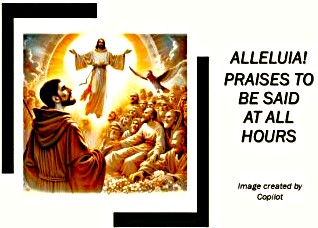
Please share with your local fraternity
Aleluia! Let us praise our Risen Lord using the words of St. Francis.
Three sets of rubrics or directives which accompany this text in the manuscript tradition suggest that the praises below were biblical passages used by the brothers before each hour of the Office.
The Praises To Be Said at All the Hours1
Holy, holy, holy Lord God Almighty, Is 6:3
Who is, and Who was, and Who is to come: Rv 4:8 a
And let us praise and glorify Him forever. Dn 3:57
2O Lord our God, You are worthy to receive
praise, glory and honor Rv 4:11 and blessing.
And let us praise and glorify Him forever. Rv 4:8
3The Lamb Who was slain is worthy to receive
power and divinity, wisdom and strength,
honor and glory and blessing. Rv 5:12
And let us praise and glorify Him forever. Rv 4:8
4Let us bless the Father and the Son with the Holy Spirit:b
And let us praise and glorify Him forever. Rv 4:8
5Bless the Lord, all you works of the Lord. Dn 3:57
And let us praise and glorify Him forever. Rv 4:8
6Sing praise to our God, all you His servants
and you who fear God, the small and the great. Rv 19:5
And let us praise and glorify Him forever. Rv 4:8
7Let heaven and earth praise Him Who is glorious. Ps 69:35 [Vulgate, Ps 68:35]
And let us praise and glorify Him forever. Rv 4:8
8Every creature in heaven, on earth and under the earth;
and in the sea and those which are in it. Rv 5:13
And let us praise and glorify Him forever. Rv 4:8
9Glory to the Father and to the Son and to the Holy Spirit.
And let us praise and glorify Him forever. Rv 4:8
10As it was in the beginning, is now, and will be forever.
And let us praise and glorify Him forever. Rv 4:8
Please read the praises above. Read through once. Then prayerfully consider each word and sentence a second time.
- What do the words and phrases that St. Francis wrote about God tell you about his relationship with Him?
- What do they tell you about his relationship with all of creation?
- Choose four words or phrases that touch you deeply. Spend some time thinking about why you chose those words.
- What do these praises, prayed daily, tell us about how St. Francis prayed?
- How do you praise God each day? When do you praise him?
- Personal challenge: See if you can write some praises of God that are personal to you.
*************************
Formation Friday April 18, 2025
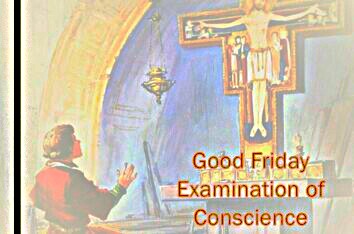
Please share with your local fraternity
Thank you to Layna Maher, OFS, Chair of the OFS USA National Formation Commission
An Examination of Conscience with St. Francis of Assisi’s Prayer before the Crucifix
Most High,
glorious God,
enlighten the darkness of my heart
and give me
true faith,
certain hope,
and perfect charity,
sense and knowledge,
Lord,
that I may carry out
Your holy and true command.
Most High, glorious God,
+Have I doubted or denied God?
+Have I treated people, events, or things as more important than God?
+Have I been ashamed of or denied my faith in front of others?
+“But whoever denies me before others, I will deny before my heavenly Father.” Matthew 10:33
Enlighten the darkness of my heart
+Do I acknowledge my total dependence on God with humility?
+What dark corners of your heart could use some light?
+Do I pray and seek God’s presence?
+“I came into the world as light, so that everyone who believes in me might not remain in darkness.” Jn 12:46
And give me true faith,
+Do I place complete trust and faith in God’s wisdom, goodness, and plan, even when facing challenges or uncertainty?
+Do I seek God’s guidance and direction in my life?
Do I strive to keep Christ at the center of my life?
+Be faithful unto death, and I will give you the crown of life (Rev. 2:10)
Certain hope,
+Do I place my desire for the kingdom of heaven above other desires?
+Do live my life with peace and joy having confidence in God’s plan?
+Do I trust in God’s love even in the midst of injustice and uncertainty?
+ Now hope that is seen is not hope. For who hopes for what he sees? But if we hope for what we do not see, we wait for it with patience (Rom. 8:24-25).
And perfect charity,
+Have I offered help to those in need or turned away?
+Do I treat those on the margins of society with dignity and respect?
+Do I promote peace and justice by working to resolve conflict?
+Does my lifestyle respect, protect and care for our Sister, Mother Earth?
+“For where your treasure is, there also will your heart be.” Luke 12:34
Sense and knowledge,
+Do I recognize God’s will and purpose in my life?
+Am I making choices in my life that bring me closer to God?
+Do I take time to read the Gospel and scriptures?
+Draw near to God, and he will draw near to you. Cleanse your hands, you sinners, and purify your hearts, you of two minds. James 4:8
Lord, that I may carry out Your holy and true command.
+Have I loved God with all my heart with all my soul and with all my mind?
+Have I loved my neighbor as myself?
+Do I live a Gospel centered life?
+Whoever has my commandments and observes them is the one who loves me. And whoever loves me will be loved by my Father, and I will love him and reveal myself to him.” John 14:21
*************************
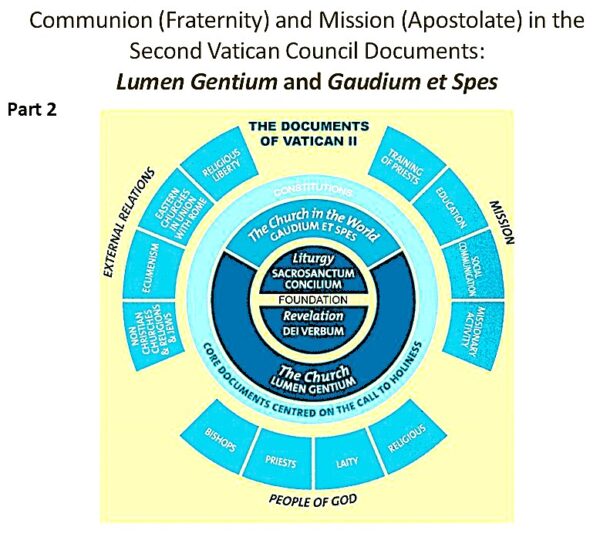
Formation Friday March 14, 2025
lease share with your local fraternity
Communion (Fraternity) and Mission (Apostolate) in the Second Vatican Council Documents: Lumen Gentium and Gaudium et Spes Part 2
Thank you to Anne Mulqueen, OFS, National Formation Commission
Communion and mission are inseparable. Communion provides the love and support necessary for the mission of evangelization. An example of the complementary nature of communion and mission can be found in the Gospel of Matthew. The disciples, as a united body, were commissioned to… go and make disciples of all nations. (Matthew 28:19)
A careful reading of these documents will show that communion and mission go hand in hand.
Mission is a vital aspect of the Church’s identity. Lumen Gentium emphasizes that the Church exists to evangelize and witness to the Gospel, while Gaudium et Spes asserts that the Church should be a transformative presence in the world. These documents encourage us to participate in apostolic activities and spread the Gospel in all areas of life, including family, work, and society. They emphasize the Church’s deep concern for all people, their joys, hopes, and anxieties, especially the poor and afflicted. Mission is rooted in the conviction that we are all created in God’s image and share a common destiny. Therefore, the Church, the People of God, is called to be a sign of unity and a promoter of human dignity and justice.
Communion and mission are two sides of the same coin. The gospel’s transformative teachings demand that we be actively involved in our secular circumstances and obey Christ’s call to serve. However, if we become so deeply involved in mission that we neglect communion (fraternity), we may experience burnout and discouragement. Communion provides the love and support necessary to fulfill the Church’s mission in the world.
If you decide to read and study these documents, I suggest you pay particular attention to these elements. The Church as a sacrament, a sign of communion with God and others:
- The People of God
- The Laity
- The Universal Call to Holiness
- Mary and a Pilgrim Church
- Zeal for evangelization
- Dialogue between the Church and the World
- Human Dignity
- The Role of the Family
- Social Justice
- The Role of the Church in the Modern World
As members of the Church and the Secular Franciscan Order, we continue to live and work in the modern world. The insights of these Vatican II documents are relevant and guide our efforts to build a more just and compassionate society. We strive to build a fraternal and evangelical world and bring about the Kingdom of God (Paraphrase of Article 14, OFS Rule).
If you are interested in reading these documents, you can do so on the Vatican website:
For discussion: In light of these two documents and our Rule, how can you and your fraternity promote a more fraternal and evangelical world?
*************************
Formation Friday March 7, 2025
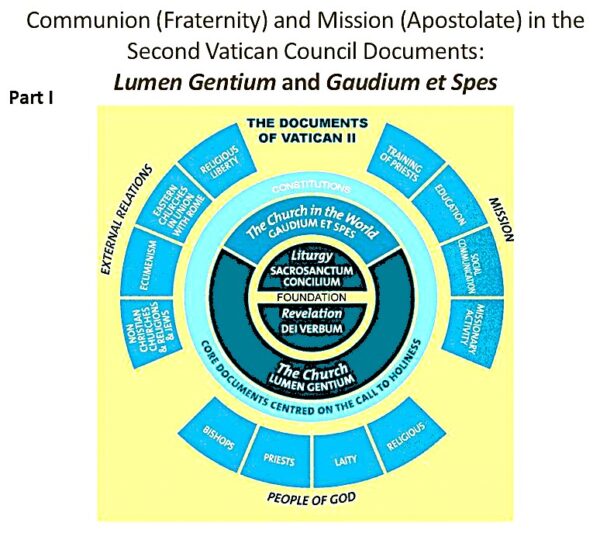
se share with your local fraternity: Part I
Communion (Fraternity) and Mission (Apostolate) in the Second Vatican Council Documents: Lumen Gentium and Gaudium et Spes
Thank you to Anne Mulqueen, OFS, National Formation Commission
The Second Vatican Council was a pivotal event in the history of the Roman Catholic Church. During the Council, two significant areas of Christian living—communion and mission—were addressed, resulting in a renewed interpretation of the ecclesiology of the Church and the role of the laity in the Church.
Lumen Gentium and Gaudium et Spes address communion and mission in detail. How many of us are familiar with these two key Council documents? We can learn so much by reading and reflecting on them. You’ll notice that many Articles of our Rule came from these two documents. Read them with our Rule in mind and see if you can find comparable passages.
The Second Vatican Council, convened by Pope John XXIII and continued under Pope Paul VI, produced several documents that have significantly shaped the Catholic Church today. Lumen Gentium and Gaudium et Spes stand out for their insights into the nature of the Church and its mission in the world. For this article, I will focus on these two points: (1) our communion (relationship) with God and others and (2) our mission (apostolate).
Lumen Gentium, the Dogmatic Constitution on the Church, presents a vision of the Church’s identity and structure. Central to this vision is the concept of communion. The document emphasizes that the Church is a “sacrament,” a sign and instrument of communion with God and unity among all people.
Gaudium et Spes, the Pastoral Constitution on the Church in the Modern World, complements Lumen Gentium by addressing the Church’s relationship with society. The theme of communion is central to our engagement with the world.
Communion in Lumen Gentium is rooted in the Trinity. The Church is described as a people brought into unity from the unity of the Father, the Son, and the Holy Spirit. The Trinity is the source and the model for the Church’s communion. We are called to participate in the divine life and reflect the unity and love of the Trinity in our relationships with God and each other.
Lumen Gentium also introduces the concept of the Church as the “People of God,” a community of believers bound together by faith. This inclusive vision emphasizes the dignity and equality of all baptized people, regardless of their roles within the Church. The document emphasizes that all members are called to holiness and mission.
The Church is a mystical body that finds unity in a community of believers, the People of God, united in faith.
In Part II, we will reflect on the call to mission as it appears in these two Council documents.
If you are interested in reading these documents, you can do so on the Vatican website:
For discussion with your fraternity or a small group:
+Read the above documents individually or as a group.
+List the articles of the Rule that were influenced by both documents. Explain your choices to your group.
+How are we as Secular Franciscans called to holiness?
*************************

Formation Friday, February 28, 2025
Please share with your local fraternity
The Canticle of the Creatures
In 2025 we celebrate the 800th Anniversary of the Canticle of the Creatures. As we begin this year, we offer St. Francis’s own words as they appear in the Canticle. Composed in 1225 during his last illness, St. Francis gives glory to God through all of creation in the first portion of the canticle. Ever the peacemaker, he added verses 10 and 11 at a time when the political and religious authorities of Assisi were in conflict. Then, right before his death, he added two verses praising God for “Sister Bodily Death,” calling us to penance and conversion.
The Canticle of the Creatures
1Most High, all-powerful, good Lord,
Yours are the praises, the glory, and the honor, and all blessing, Rv 4:9 Rv 4:11
2To You alone, Most High, do they belong,
and no human is worthy to mention Your name.d
3Praised be You, my Lord, with all Your creatures,Tb 8:7
especially Sir Brother Sun,
Who is the day and through whom You give us light.e
4And he is beautiful and radiant with great splendor;
and bears a likeness of You, Most High One.
5Praised be You, my Lord, through Sister Moon and the stars, Ps 148:3
in heaven You formed them clear and precious and beautiful.a
6Praised be You, my Lord, through Brother Wind,
and through the air, cloudy and serene, and every kind of weather,
through whom You give sustenance to Your creatures.
7Praised be You, my Lord, through Sister Water, Ps 148:4 Ps 148:5
who is very useful and humble and precious and chaste.
8Praised be You, my Lord, through Brother Fire, Dn 3:66
through whom You light the night, Ps 78:14 [Vulgate, Ps 77:14]
and he is beautiful and playful and robust and strong.
9Praised be You, my Lord, through our Sister Mother Earth, Dn 3:74
who sustains and governs us,
and who produces various fruit with colored flowers and herbs. Ps 104:13 [Vulgate, Ps 103:13] Ps 104:14 [Vulgate, Ps 103:14]
10Praised be You, my Lord, through those who give pardon for Your
love, Mt 6:12
and bear infirmity and tribulation.b
11Blessed are those who endure in peace
for by You, Most High, shall they be crowned.
12Praised be You, my Lord, through our Sister Bodily Death,
from whom no one living can escape.c
13Woe to those who die in mortal sin.
Blessed are those whom death will find in Your most holy will,
for the second death Rv 2:11 Rv 20:6 shall do them no harm.d
14Praise and bless my Lord Dn 3:85 and give Him thanks
and serve Him with great humility.
After reading the Canticle, go back and look at the Scripture sources indicated—read the passages—see how Francis was influenced by his intimate knowledge of Scripture.
+What part does Scripture play in your daily life? What does “going from Gospel to life and life to the Gospel” (Article 4 of our Rule) mean to you?
The Canticle speaks of St. Francis’s love for all of creation.
+Using St. Clare’s advice to “Gaze, Contemplate, Meditate, and Imitate, think about your relationship to God’s creation.
+How does your relationship with creation affect your relationship with God and your brothers and sisters?
Reread verses 10 and 11 of the Canticle.
+How do you serve as a peacemaker in your family, job, or community?
+In what ways is it difficult for you to “forgive” those who don’t agree with you?
+Verse 10 calls to mind the story of Perfect Joy. What is Francis telling us in that story and in this canticle?
Verses 12 and 13 talk about the end of life and how we are to prepare.
+Give some thought to the qualities it takes to accept our eventual death or the death of someone we love.
+Reread the Prologue to the Rule of 1978, especially “Concerning Those Who Do Not Do Penance.” Why are penance and conversion so important to us?
*************************
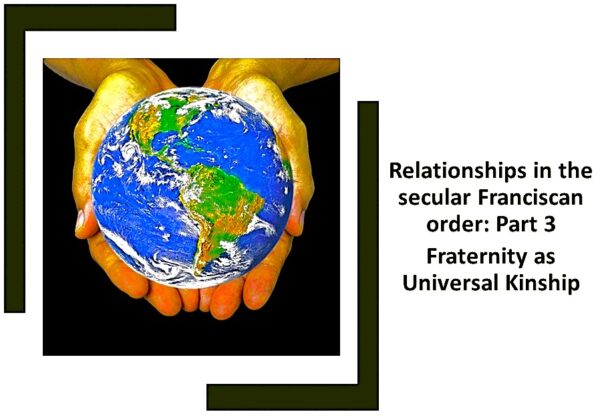
Formation Friday February 21, 2025
Please share with your local fraternity.
At our National Chapter in October 2022, the National Fraternity Council decided that the priorities for 2022-2025 would be Vocations, Communications, and Relationships. For several weeks, Formation Friday has been exploring each of these priorities.Relationships in the Secular Franciscan Order: Part 3
Fraternity as Universal Kinship
Prepared by Francine Gikow, OFS, Member, National Formation Commission
Relationship, or what we describe as “fraternity,” is foundational for living our Secular Franciscan charism and is the way we evangelize, going from gospel to life and life to the gospel. In this series of “Relationships in the Secular Franciscan Order,” we discussed:
- Love between each person of the Holy Trinity is our model for fraternity living; to love one another.
- Francis understood that we are all sons and daughters of the same Father and so we are all brothers and sisters, in a kinship relationship, with each other in fraternity.
- Our local fraternity is a school of love where we learn how to develop and sustain relationships. We live “fraternity” with our brothers and sisters within our fraternity, with others with whom we interact, those in our ministries, in our higher fraternities, in our relationships with the members of other Franciscan religious orders and to the whole world.
Francis’ concept of “fraternity,” however, expands even further to encompass all of creation- both animate and inanimate- which we call “universal kinship.” Our Rule, Article 18, states:
“Moreover they should respect all creatures, animate and inanimate, which bear the imprint of the Most High, and they should strive to move from the temptation of exploiting creation to the Franciscan concept of universal kinship.”
Francis saw God reflected in what He created- or in the words of our Rule- the imprint of the Most High who created all things; animate and inanimate. Since we are all created by the same Father in heaven, we are united as brothers and sisters to all creation and thus must treat creation with loving and fraternal care.
We are further instructed by our General Constitutions (Art. 18):
“Following the example of Francis, patron of ecologists, they should actively put forward initiatives that care for creation and should work with others in efforts that both put a stop to polluting and degrading nature and also establish circumstances of living and environment which would not be a threat to a human person.”
Francis’ legacy to us in his “Canticle of the Creatures,” is a song of praise, glory, honor and thanksgiving to God for Brother Sun, Sister Moon and all creation. The Canticle shows reverence for every “thing” created by God- a “kin” relationship. To honor that reverence, we are charged at profession to “build a more fraternal and evangelical world” (in our relationships with creation too) “so that the kingdom of God may be brought about more effectively.”(Rule, Art. 14)
In summary, our former, beloved, National Minister, Tom Bello, OFS, said of our fraternal relationships:
“Fraternity is a call to unity and harmony with all our brothers and sisters, all of whom are children of the same living God.
Fraternity is a call to unity and harmony with all of creation, plant and planet, all created by the same loving God.
Fraternity is a call to build a community of love that reflects Love back to the God of Love: Father, Son and Holy Spirit.” (FUN: Fraternity, p.7)
Reflection Questions:
- Read OFS General Constitutions, Article 18 “For a Just and Fraternal Society” and share what you have learned.
- What inspired you from this article? What drew your attention?
- What description of fraternal relationships challenged you and why. Share your thoughts with another person or in a spiritual journal.
- Bring to prayer the ideas of this article and ask God to help you discern how to use these ideas in your life and in the life of your fraternity.
*************************
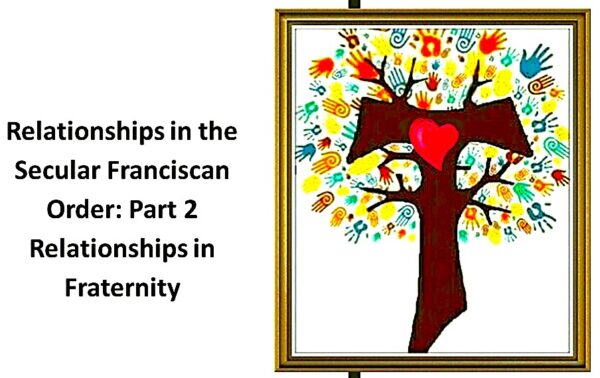
Formation Friday February 14, 2025
Please share with your local fraternity.
At our National Chapter in October 2022, the National Fraternity Council decided that the priorities for 2022-2025 would be Vocations, Communications, and Relationships. For several weeks, Formation Friday has been exploring each of these priorities.
Relationships in the Secular Franciscan Order: Part 2
Relationships in Fraternity
Prepared by Francine Gikow, OFS, Member, National Formation Commission
“The vocation of the OFS is a vocation to live the Gospel in fraternal communion. For this purpose, the members of the OFS gather in ecclesial communities which are called fraternities.” (GC. 3.3)
Fraternal communion, commonly described as “relationships” within a fraternity, identifies a key element in our spiritual Franciscan charism- for we cannot be a Secular Franciscan without a fraternity. We are meant to be in relationship with each other and it is how we “do” our mission of building up the church. It takes the concrete experience of living in fraternity to teach us what true “communion” really means.
Here are some key concepts in Franciscan relationships within a fraternity:
- As discussed last week, the model of our relationships is the Holy Trinity– the relational love between the Father, Son and Holy Spirit. This unity of the Trinity should be reflected in our own relationships.
- We are all mothers, brothers, sisters and spouses of the same God (1LtF:8-11) and our relationships (in fraternity) should be reflective of our God of LOVE.
- Fraternity, then, is a call to unity as a model of Christ’s love to the whole world, all of whom are children of the same loving God.” (Rule Article 13)
- It is a privileged place for us- a place that nourishes ongoing conversion (GC.13) and imitates Christ’s relationship with his disciples and Francis and Clare’s relationship with their followers. This privileged place includes our different “levels” of participation and relationship: local, regional, national and international fraternities.
- Our relationships within the wider Franciscan Family (Friars, Poor Clares, and Religious Sisters) provide “vital reciprocity:” a life giving union with each other to make present the charism of their common Seraphic Father in the mission of the church.(Rule Article 1) Each branch of the Franciscan family brings to the greater Franciscan family their own experiences to enrich and enliven the other branches leading to greater unity.
- Fraternity is “an ecclesial community” for a lived experience of being “church” and a visible sign of the Church, a community of faith and love.(Rule Article 22)
- Fraternity is also, a “school of love.”(GC40, 2-3) It is how we learn about relationships: giving and receiving, learning and teaching, forgiving and asking for forgiveness. It is a sign of Christ’s love to the whole world which is a “call to unity and harmony with all our brothers and sisters, all of whom are children of the same loving God. (Rule Article 13)
- Our purpose of our relationships in Fraternity is: “together with all people of good will, to be called to build a more fraternal and evangelical world as Franciscans, so that the kingdom of God may be brought about more effectively.” (Rule Arrticle 5). We do this through our relationships.
In summary, Franciscans are all about relationships and fraternal communion. However, relationships do not end with just our experience within our fraternities and the Franciscan family- they extend into viewing all of creation and the world in which we live, while being in a “relationship and community of love.” This is called “Universal Kinship,” and in Part 3, the last of our series in “Franciscan Vocation as Relationship,” we will meditate on what it means to extend our concept of relationship to creation and the world.
Questions for reflection in your journal or to discuss with a prayer partner or small group:
- Look up the full references from the above citations of the OFS Rule, General Constitutions and the First Letter to the Faithful and discuss with a partner, what you have learned.
- What struck you from this article? Identify what drew your attention.
- What description of fraternal relationships challenged you and why? Share your thoughts with another.
- Bring to prayer the results of this review and ask God to enrich your relationships in fraternity.
*************************

Formation Friday February 7, 2025
Please share with your local fraternity.
At our National Chapter in October 2022, the National Fraternity Council decided that the priorities for 2022-2025 would be Vocations, Communications, and Relationships. For several weeks, Formation Friday has been exploring each of these priorities.
Relationships: Part 1
Prepared by Francine Gikow, OFS, Member, National Formation Commission
Relationships in the Secular Franciscan Order: Part 1
The Holy Trinity As Our Model in Relationships: “Perfect Trinity, Simple Unity”
For Francis, the Holy Trinity, has been the model for all relationships within and outside of the Order. Francis understood and proclaimed the Trinitarian perspective. O how glorious it is to have a holy and great Father in heaven! Oh, how holy, consoling to have such a beautiful and wonderful Spouse! O, how holy and how loving, gratifying, humbling, peace-giving, sweet, worthy of love, and above all things, desirable: to have such a Brother and such a Son, our Lord Jesus Christ….(1LtF)
The Catechism of the Catholic Church (259-260) describes some key characteristics of the Holy Trinity which are also common themes in Francis’ writings. They are:
- Unity: God has revealed himself to us as the Father, Son and Spirit- commonly known as the Holy Trinity. The Trinity expresses a unified love relationship among each person of the Trinity, and as Francis describes it in the FUN Manual, “Perfect Trinity, Simple Unity As Secular Franciscans, we are to share this love relationship of unity among ourselves (family and fraternity), our church (since “we are more intimately united with the Church by profession,”(OFS Rule Article 6) all people, creation, and the world.
- Love: Since God is pure Love, this love should permeate all who we are and do as Secular Franciscans, and be evident in all of our relationships. For “Christ, the gift of the Father’s love, is the way to him, the truth into which the Holy Spirit leads us, and the life which he has come to give abundantly. (Rule Article 4)
- “ Sonship:” Since we are all sons and daughters of the living God, “the Franciscan approach in prayer, is to lead us to imitate Jesus for the purpose of entering and deepening our relationship with Our Father, the Source of Love unimaginable.”(FUN Manual) In addition, the OFS Rule urges us to “conform their thoughts and deeds to those of Christ by means of that radical interior change which the gospel itself calls “conversion.”
Therefore, “…the whole Christian life is a communion with each of the divine persons, without in any way separating them…[and with] the ultimate end… the entry of God’s creatures into the perfect unity of the Blessed Trinity.”(CCC, 259-260)
O, happy and blessed are these men and women while they do such things and persevere in doing them because the Spirit of the Lord will rest upon them (cf. Is 11:2) and make Its home and dwelling place among them (cf. Jn 14:23) and they are children of the heavenly Father (cf. Mt 5:45) Whose works they do, and they are spouses, brothers, and mothers, of our Lord Jesus Christ (cf. Mt 12:50)(1LtF 5-7).
Wouldn’t you like to be a spouse, brother, mother and home for God?
Reflection Questions:
- Describe, in your own words, what unity, love and sonship mean to you as a Secular Franciscan.
- Identify how you can incorporate each of these characteristics of the Holy Trinity into your life as a Secular Franciscan.
- Do you see yourself as a “home for God?” If so, how? If not, why not?
*************************
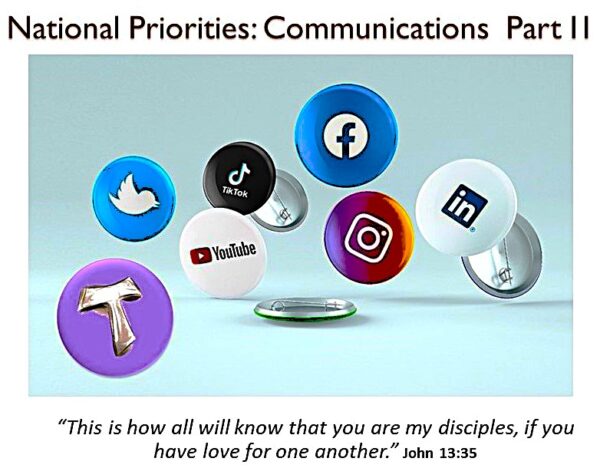
Communications Part 2: Social Media
uary 31, 2025 Please share with your local fraternity
The OFS USA National Priorities for 2022 to 2025 are, “Vocations, Communications and Relationships.“
#OFS, #Francis, #Justice, #Peace, #Love
Thank you to Layna Maher, OFS, Chair, National Formation Commission for preparing this piece.
This Formation Friday looks at Social Media communications and offering an opportunity to reflect on our posts and perspective as Catholics and Secular Franciscans.
Imagine if St. Francis had a Facebook page. What do you think he would he be posting? How would St. Francis give praise to God and creation? How would he show solidarity with the poor and marginalized? How would he respond to injustice? It can be easy to be kind and loving as we go along with those that think like we do. When it comes to those we disagree with, however, we may also find it easy to justify lashing out with anger or condemnation. St. Francis once again gives us clear guidance on how we should go about things.
The Earlier Rule, [Chapter XI: The Brothers Should Not Revile or Detract, But Should Love One Another] 1Let all the brothers be careful not to slander or engage in disputes; 2let them strive, instead, to keep silence whenever God gives them the grace.
From the Later Rule 10I counsel, admonish and exhort my brothers in the Lord Jesus Christ not to quarrel or argue or judge others when they go about in the world; 11but let them be meek, peaceful, modest, gentle, and humble, 2 Tm 2:14 speaking courteously to everyone, as is becoming.
Pope Francis counsels us “It is necessary to overcome the tendency to “discredit and insult opponents from the outset [rather] than to open a respectful dialogue” in his Message for the 57th World Day of Social Communications. Let us move from the potential for negativity and embrace the positive potential as we’re guided in the Encyclical Letter Fratelli Tutti 205“In today’s globalized world, the media can help us to feel closer to one another, creating a sense of the unity of the human family which in turn can inspire solidarity and serious efforts to ensure a more dignified life for all…”
Let us stop and think before we post or comment. Or maybe decide it’s best to not comment or reply, but respond with a silent prayer. We can choose to use social media for good. Social media can help those in isolation feel connected. It can also be a great platform to share spiritual resources and come together in prayer. We can evangelize and share the Good News with how we show respect for all of God’s creation and cultivate the Franciscan spirit of peace. We can also use social media to show love and solidarity with our brothers and sisters in the world.
From the Gospel of John 13:35 “This is how all will know that you are my disciples, if you have love for one another.”
From the OFS Rule Article 14 Secular Franciscans, together with all people of good will, are called to build a more fraternal and evangelical world so that the kingdom of God may be brought about more effectively. Mindful that anyone “who follows Christ, the perfect man, becomes more of a man himself,” let them exercise their responsibilities competently in Christian spirit of service.
Reflect and discuss in your fraternity or comment in your journal.
+ Is the face of Christ visible on my Facebook or social media page?
+ How much love and peace am I sowing?
+ Are my posts and comments building a more fraternal world?
*************************

Formation Friday January 24, 2025
Please share with your local fraternity
At our National Chapter in October 2022, the National Fraternity Council decided that the priorities for 2022-2025 would be Vocations, Communications, and Relationships. As we enter 2025, Formation Friday will offer an opportunity to review these priorities and see “how we are doing” so far. Communications is our second priority.
Communications: Part 1
Prepared by Layna Maher, OFS, Chair, National Formation Commission
This week Formation Friday is taking a look at communication from our perspective as Catholics and Secular Franciscans.
As Franciscans, we are called to share the Good News by the way we live and communicate with others. We first look to the way St. Francis lived as described to us by Thomas of Celano in The Life of Saint Francis.
The brothers who lived with him know
that daily, constantly, talk of Jesus was always on his lips,
sweet and pleasant Ez 33:32 conversations about Him,
kind words full of love.
Out of the fullness of the heart his mouth spoke. Mt 12:34
So the spring of radiant love that filled his heart within
gushed forth.
He was always with Jesus:
Jesus in his heart,
Jesus in his mouth,
Jesus in his ears,
Jesus in his eyes,
Jesus in his hands,
he bore Jesus always in his whole body.
Jesus and St. Francis are perfect models of gentleness. Jesus teaches us that gentleness reconciles and heals. St. Francis teaches us that gentleness opens the possibility for something radical and positive and holy. As Secular Franciscans we follow in the footsteps of St. Francis following Jesus. When we do this and live our Rule, we live with gentleness rooted in humility.
We also look to the Holy Spirit as a model of gentleness. During a 2017 visit to a parish in Rome, Pope Francis said, “The language of the Holy Spirit is sweet, and the Church calls him the ‘sweet guest of the soul’ because he is sweet and gives us sweetness. And respect. He always respects others. He teaches us to respect others.”
Gently and humbly seeking first to understand, then to be understood helps us to be respectful and see others as a gift of the Lord. As Franciscans, we open our hearts to be filled with the same radiant love that filled the heart of St. Francis. When our hearts are full, others will hear Jesus from the words of our mouths and see Jesus in the work of our hands.
From the OFS Rule: Article 13. As the Father sees in every person the features of his Son, the firstborn of many brothers and sisters, so the Secular Franciscans with a gentle and courteous spirit accept all people as a gift of the Lord and an image of Christ. A sense of community will make them joyful and ready to place themselves on an equal basis with all people, especially with the lowly for whom they shall strive to create conditions of life worthy of people redeemed by Christ.
Discuss with your fraternity or a prayer partner or comment in your journal.
Proverbs 15:1 A mild answer turns back wrath, but a harsh word stirs up anger
+ Reflect on your attitude and actions when you encounter someone with a different opinion or position. Is it an attitude of gentleness, or of wrath?
+ How do you seek to encounter Christ in those you do not agree with?
+ Think of a time you may not have reacted with gentleness to another. What could you have done differently? Is there an opportunity for reconciliation?
************************
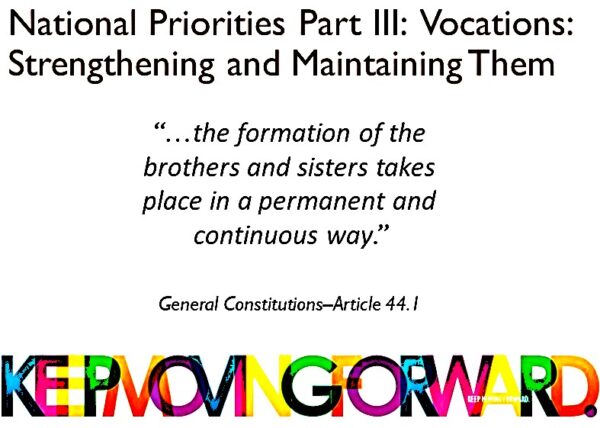
Formation Friday January 17, 2025
Please share with your local fraternity
Vocations, Communications, Relationships: How do we strengthen and maintain our vocation? (Part 3 of 3)
At our National Chapter in October 2022, the National Fraternity Council decided that the priorities for 2022-2025 would be Vocations, Communications, and Relationships. As we enter 2025, Formation Friday will offer an opportunity to review these priorities and see “how we are doing” so far. Vocations is also one of the priorities chosen by the General Chapter at the November meeting in Rome.
For those of us who are newly professed and for those of us who are long-professed, attention to our vocation does not stop at the moment of profession. This special gift we have been given, Profession in the Secular Franciscan Order, needs to be nurtured and cared for throughout our lives as Franciscans.
We are all responsible for keeping our vocations strong. Initial formation should not be the last time we think deeply about the Franciscan Charism and all that it means to our lives as Secular Franciscans. Our Constitutions are specific about the need for Ongoing Formation—also called Continuing or Permanent Formation. Take note of what the General Constitutions expect will be the content of our ongoing formation programs:
CONTINUING FORMATION – ARTICLE 44 GC
- Begun by the preceding stages, the formation of the brothers and sisters takes place in a permanent and continuous way. It should be understood as an aid in the conversion of each and every one and in the fulfillment of their proper mission in the Church and in society.
- The Fraternity has the duty to give special attention to the formation of the newly professed and of the temporarily professed, to help them become fully mature in their vocation and develop a true sense of belonging.
- Ongoing formation – accomplished by means of courses, gatherings, and the sharing of experience – aims to assist the brothers and sisters:
— Rule: Article 4 in listening to and meditating on the Word of God, “going from Gospel to life and from life to Gospel,”
— in reflecting on events in the Church and in society in the light of faith and with the help of the documents of the teaching Church, consequently taking consistent positions;
— in discerning and deepening the Franciscan vocation by studying the writings of Saint Francis, Saint Clare and Franciscan authors.
There are four aspects to ongoing formation
- Franciscan topics (our governing documents; writings of Francis and Clare; writings by Franciscan authors)
- Contemporary topics (How we live our lives as Secular Franciscans; writings of Catholic authors; documents like Laudato Sì; The Joy of the Gospel etc.)
- Prayer (Franciscan prayer life; praying the Scriptures; learning about the Scriptures)
- Teaching about the Catholic Church
Here are some suggestions for ongoing formation resources, click on title to view:
- Franciscan Intellectual Tradition video lectures
- Custodians of the Tradition (Excellent)
- The writings of and about Francis and Clare
- CD Contents from the FUN Manual
- Ongoing formation resources on our website (including Formation Fridays)
- Gospel Life of St. Francis from St. Bonaventure University FREE DOWNLOAD WITH VIDEOS
- Videos of excellent keynote talks given at the 2022 Quinquennial
Suggestions for discussion in a group, with a prayer partner, or to comment on in your journal.
+How does the ongoing formation program in your local fraternity follow what is requested in the General Constitutions? Is it focused on Franciscan/Gospel/Church themes? Why or why not?
+How is the ongoing formation program carried out in your fraternity? Here are some possibilities. Which ones can be used on a rotating basis?
+A talk at the gathering (by fraternity member, spiritual assistant, or guest speaker)
+A talk followed by small group discussions followed by sharing with the entire group
+A presentation or a reading selection followed by discussion with a partner
+View a video (formation team prepares a few questions given out beforehand). Questions are discussed in small groups or with a partner after viewing the video.
+Members read a short scripture passage at home. Make a list of 3 main ideas. Some of the readings are shared at the gathering along with the ideas the person has listed.
+Take a look at the links provided above. What looks interesting for your fraternity? Make suggestions to your formation team.
*************************

Formation Friday January 17, 2025
Please share with your local fraternity
Vocations, Communications, Relationships: How do we recognize a vocation and call it forth? (Part 2 of 3)
At our National Chapter in October 2022, the National Fraternity Council decided that the priorities for 2022-2025 would be Vocations, Communications, and Relationships. As we enter 2025, Formation Friday will offer an opportunity to review these priorities and see “how we are doing” so far. Vocations is also one of the priorities chosen by the General Chapter at the November meeting in Rome.
There are certain characteristics that can help us to recognize a vocation to the Secular Franciscan Order (Material for this portion is taken from the FUN Manual, and The Franciscan Journey.)
“So, let us go out into the world and remind everybody by example as well as word to turn to God.” St. Francis—The Legend of the Three Companions
In the Franciscan Journey, pp. 15-116, we find the signs that a person MAY have a vocation to the Secular Franciscan Order. On pp. 17-18 the signs that a vocation may not be present are listed. Here we repeat the affirmative signs:
They are practicing Catholics and wish to deepen their faith commitment; Have a personal faith-relationship with Jesus; Desire to follow Jesus and his Gospel; Recognize that we are all imperfect sinners
Have concern and compassion for others; Are willing to have dialogue in discussions
Are service oriented but not dominating; Enjoy learning from others; Have good listening skills/communication skills; Are willing to grow as a person; Are able to deal with life issues; Are willing to collaborate and share creative ideas.
We cannot know what God has planted in the hearts of our brothers and sisters. But, we can reach out to them to help them recognize their specific vocation. Our General Constitutions exhort us to promote vocations in Article 45.1, .2.
Here are some suggestions for personal and fraternity outreach and promotion of vocations:
- Wear your TAU! Some of the most interesting conversations arise when folks ask about that “T” you are wearing. Wearing the TAU also helps us to remember that our example is probably the most powerful outreach to those who are searching.
- Let others know about the good work your fraternity is doing. Write an article for your parish newsletter or diocesan magazine; ask for parish and community collaboration on your projects; participate in activities that include all ages in the parish community; don’t hesitate to mention the Order and your fraternity.
- Check out the Vocations Toolkit available on our national website
Here you will find: Prayer resources; the “Come and See” brochure in English, Spanish, and Korean; Outline for a “Come and See” session in 3 languages; Come and See Digests (brief materials on key topics); “Come and See” PowerPoint presentation with notes and talking points.
- You can also ask the National Formation Commission for other ideas and help in implementing any outreach you wish to try.
Questions for discussion or to answer in your journal:
+ How did you come to recognize your vocation? Was there a special person who influenced you?
+ Have you ever recognized a vocation to the OFS in someone else? How did you approach it with them?
+ What is one thing you would say to people who are searching for their (specific) personal vocation?
+ What suggestions could you make to your fraternity to help promote vocations?
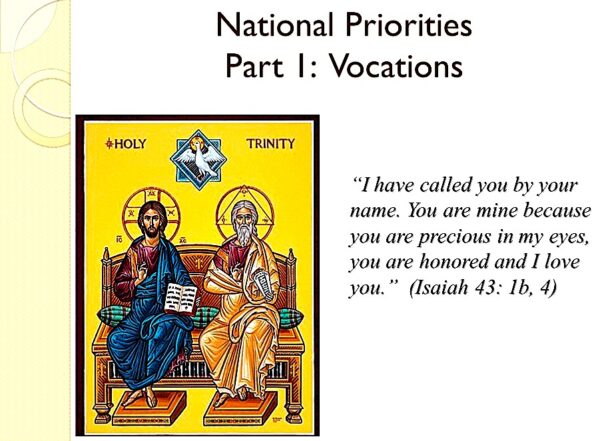
Formation Friday January 3, 2025
Please share with your local fraternity
Vocations, Communications, Relationships: What is Vocation? (Part 1 of 3)
At our National Chapter in October 2022, the National Fraternity Council decided that the priorities for 2022-2025 would be Vocations, Communications, and Relationships. As we enter 2025, Formation Friday will offer an opportunity to review these priorities and see “how we are doing” so far. Vocations is one of the priorities chosen by the General Chapter at the November meeting in Rome.
Before we can discover and attract vocations, we need to have a good idea of what a vocation is. Part 1 looks at what our formation materials stress about the nature of vocation in general. (Material for this portion is taken from the FUN Manual, The Franciscan Journey, and materials being developed for the OFS USA formation program.)
“I have called you by your name. You are mine because you are precious in my eyes, you are honored, and I love you.” (Isaiah 43: 1b, 4)
— Vocation is an invitation to all people to share in the life of the Trinity.
— We all receive three “calls” from God
— Primary call—to all people
— Personal call—personal vocation
— Specific call—vocation to the Secular Franciscan Order
The Primary Call is a call to all people to love—God loves us and we, in turn, are called to love God. Because of love, God the Father created us, made a covenant with us, and sent the prophets to communicate with us. God loves each one of us personally and unconditionally. Vatican II tells us that we are not called because of our good works but by God’s design and grace. (Documents of Vatican II. The Laity, p. 58)
The Personal Call is initiated by God (or by God through another person). He never forces us to respond. God deals with each of us in a unique, personal way. For example, the Apostles were called to be the first witnesses to Christ’s divinity. They were called to preach and act in Jesus’s name. This was their PERSONAL VOCATION.
We are called to PERFECTION (See the story of the Rich Young Man in Matthew 19:16-30—“Sell what you have…Come, follow me.”); WITNESS (See the story of the Gerasene Demoniac in Mark 5: 1-20; Luke 8:26-29—“Tell what God has done for you.”); TOTAL AVAILABILITY (See the story of Zacchaeus in Luke 19: 5-7—“I must come to your house today.”)
Of course, there are many other examples that we can cite from Scripture.
The Specific Call—As professed Secular Franciscans, many of us have answered this call. However, for those who are searching to find what their Specific Call is, it takes many hours, days, and sometimes years to discern in what specific way the Lord is calling us to serve him and spread the good news of his life, death, and resurrection. Here are some general tips for discernment.
Discernment is a decision-making process that honors the place of God’s will in our lives. To discern well in the context of religion, start with prayer to know God’s will. Perhaps the Prayer Before the Crucifix:
Most High,
glorious God,
enlighten the darkness of my heart
and give me
true faith,
certain hope,
and perfect charity,
sense and knowledge,
Lord,
that I may carry out
Your holy and true command.
Trust that God has a plan for your life. Find quiet time; tell God what you desire and what you fear; allow God to speak to you; talk to a mentor or someone you respect. Continue to pray and be open to the Holy Spirit, but do not be afraid to explore the options open to you.
Questions for discussion or to answer in your journal:
+ Have you discovered your specific call? If yes, how have you answered it?
+ What gifts and talents given to you by God have helped you to make that decision?
+ How do you think you can help others to recognize and answer their call?
Next week we will have more on the Specific Franciscan Vocation: How to recognize it and how to call it forth in others.
*************************
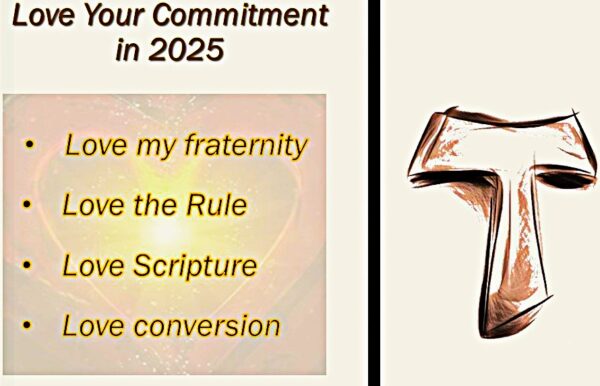
*************************
Formation Friday December 27, 2024
Please share with your local fraternity
2025—Time to Examine our Love and Commitment
- CONVERSION: the letting go of one’s ego…”
- “One is dying to a false self that tries to BE God, that tries to always be in control.”
- This is a reversal, a “TURNING TOWARD” the Holy Spirit at work within us.
—Francis and Jesus by Murray Bodo, OFM
+What can I do to make some beneficial changes in my attitude about fraternity and fraternal life?
1-Prayerfully participate in electing and supporting my local Council.
- Pray for them every day.
- Use my God-given talents to collaborate on and assist with all projects.+What are some ways I can support my Council?
+Do I have talents and abilities that call me to serve on the Council?
2– Love my fraternity
- Be present at gatherings.
- Listen to my brothers and sisters.
- Offer to help out.
- Reach out to excused members or to anyone who has missed a meeting. (Phone, email, card).
- Pray for our deceased members and for all those listed on your fraternity prayer list or prayer line
- Take note that for Franciscans, fraternity is a way of life (not just another “thing to do”).+What talents do I have to offer my fraternity?
+Do I participate willingly in fraternity activities?
3– Love our Rule
- Be sure that I am aware of what I promised at profession.
- Read, pray and meditate on the Rule—perhaps one or two articles each day.
- Think about how the Rule leads me closer to Christ.
+When was the last time I read the Rule?
+Do I make the effort to relate the Rule to my everyday life?
4– Love Scripture
- Be aware that St. Francis based everything he said or wrote on Scripture.
- Resolve to read a little Scripture each day.
- Pray the Liturgy of the Hours because it helps us to pray in fraternity (with the entire Church) and is filled with Scripture.
+How can I make time to read Scripture every day, or most days?
+ How would I explain “Going from Gospel to life and life to the Gospel,” it to someone new or to a non-Secular Franciscan? (What examples can I give of how I do this?)
5– Strive for daily conversion
- Welcome the Holy Spirit into our hearts to help us to change for the better each day.
- Make use of the Sacrament of Reconciliation.
- Remember that we are the “Brothers and Sisters of Penance.”
+Do I review my actions and relationship with God each day? (What methods do you use?)
+How have I changed since I first became a Franciscan? How have I changed since last week?
BEST FOR LAST
6– Love the Eucharist and be changed by it
- Attend Mass on Sundays and Holy days and every day if I can
- Take advantage of opportunities for Adoration—holy hours or just a visit to the tabernacle
+What is my relationship to Jesus in the Eucharist?
+Do I often visit with Jesus when there is an opportunity to attend Adoration?
As we enter 2025, ask the Holy Spirit to guide you in everything you do!
The questions above are to answer in your journal and then to discuss in fraternity.
*************************
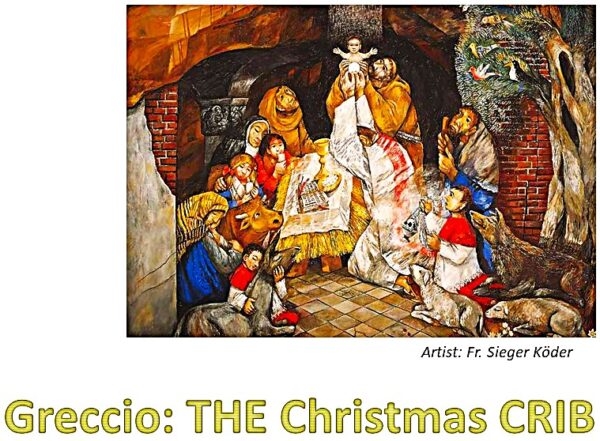
Formation Friday – December 20, 2024
Please share with your local fraternity
It is said that Christmas is a time for children, but I say Christmas is a time for all who have not lost the wonder, joy and delight in celebrating the gift of the birth of a baby, human and divine, who came to earth to be one of us. On Christmas eve, 1223, our Father Francis made his ardent love for the Incarnation of God tangible through the reenactment of Bethlehem in a cave in Greccio.
In the First Life of St. Francis, Thomas of Celano writes that Francis wanted the birth of Christ to come alive, presenting anew the birth of the baby Jesus in a cave in Greccio. Francis wanted this event to be, noted and recalled with reverent memory. It is almost eight hundred years later, and we continue to display the Christmas creche in our homes and in our churches. And so during this Christmastide, let us set aside time to recall with reverent memory the wonder of the Incarnation as we gaze on the crib that holds Mary’s baby.
What prompted St. Francis to create this scene? St. Bonaventure would say he wanted to rouse the hearts of those weak in the faith. Thomas of Celano would say the child had been forgotten in the hearts of many; but by grace he was brought to life again through St. Francis.
St. Francis was a man of action. So what did he do? He invited his brothers and the people in the village to a cave, filled with animals, straw and a feeding trough, that served as a crib for the infant savior. Francis wanted everyone to experience the humility and poverty of a tender God who was born into the world as a poor and helpless baby. He wanted everyone to experience the love of God poured out in the Incarnation. At the appointed time the people arrived, carrying torches and candles. And their hearts were no longer cold, but filled with love. Everyone gathered in joy around this divine baby, lying in a manger.
While gazing at the crib of the infant Jesus, ponder this quote from Pope Francis. “When, at Christmas, we place the statue of the Infant Jesus in the manger, the nativity scene suddenly comes alive. God appears as a child, for us to take into our arms. Beneath weakness and frailty, he conceals his power that creates and transforms all things. It seems impossible, yet it is true: in Jesus, God was a child, and in this way he wished to reveal the greatness of his love: by smiling and opening his arms to all.” [Admirabile Signum 8]
It is always best to read the original sources on a subject in addition to a reflection or commentary. Therefore, please go to the Moral Vision of Pope Francis, pray first, then read and meditate on the following accounts of Francis’ reenactment of the nativity at Greccio. For those without access to the Internet, please read the account of the first Nativity in any biography of St. Francis you have or in the printed resource Volume 1 The Saint.
- The Life of Saint Francis by Thomas of Celano, Chapter XXX, [FA:ED, vol. 1, 254-257]
- The Life of Blessed Francis, Legenda Maior, by St. Bonaventure, Chapter 10, [FA:ED, vol. 2, 610-611]
Just one question to discuss or to comment on in your journal:
Has anything you read or meditated upon reawakened your imagination about the WORD made flesh—the invisible God made visible in a baby and has it changed your understanding of the nature of God?
Thank you to Anne Mulqueen, OFS
Please share with your local fraternity.
*************************
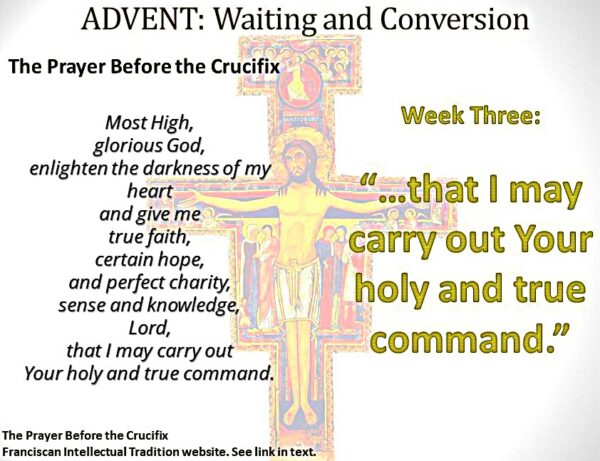
Formation Friday – December 13, 2024
lease share with your local fraternity
(All three parts together will work well for fraternity ongoing formation at any time of year.)
During Advent we wait for the coming of our Lord Jesus Christ. We know that he walked on this earth. We know that he is always with us in the Eucharist. But now, we wait for Him to come again.
For three weeks we will focus on the prayer that St. Francis prayed as he knelt before the Crucifix of San Damiano. Each part of it has significance during this time of waiting and conversion.
Most High,
glorious God,
enlighten the darkness of my heart
and give me
true faith,
certain hope,
and perfect charity,
sense and knowledge,
Lord,
that I may carry out
Your holy and true command.
Part Three: Living the Charism
“…that I may carry out Your holy and true command.”
CONSIDER:
+Our Rule: Article 2—”The Secular Franciscan Order holds a special place in this family circle. It is an organic union of all Catholic fraternities scattered throughout the world and open to every group of the faithful. In these fraternities the brothers and sisters, led by the Spirit, strive for perfect charity in their own secular state. By their profession they pledge themselves to live the gospel in the manner of St. Francis by means of this rule approved by the Church.”
+Our Rule: Article 10— “Uniting themselves to the redemptive obedience of Jesus, who placed his will into the Father’s hands, let them faithfully fulfil the duties proper to their various circumstances of life17. Let them also follow the poor and crucified Christ, witness to him even in difficulties and persecutions18.”
+Our Rule: Article 14—”Secular Franciscans, together with all people of good will, are called to build a more fraternal and evangelical world so that the kingdom of God may be brought about more effectively. Mindful that anyone “who follows Christ, the perfect man, becomes more of a man himself”, let them exercise their responsibilities competently in Christian spirit of service25”
+Admonition XVII: The Humble Servant of God
“1Blessed is that servant Mt 24:46 who no more exalts himself over the good the Lord says or does through him than over what He says or does through another.
2A person sins who wishes to receive more from his neighbor than what he wishes to give of himself to the Lord God.”
+ During Advent, we focus on how well we carry out what we are called to do in our lives as Secular Franciscans. Now is the time to ask ourselves how familiar we are with our Rule and with what we promised at Profession.
Questions for discussion or to answer in your journal
+As Franciscans, we are called to intensify our baptismal promises through our profession.
—What were the promises made for us at our Baptism?
—Which articles of our Rule present the greatest challenge to me?
—Do I read and pray some portion of Scripture each day? How do I carry out what I am being asked to do by Jesus in the Gospel?
*************************
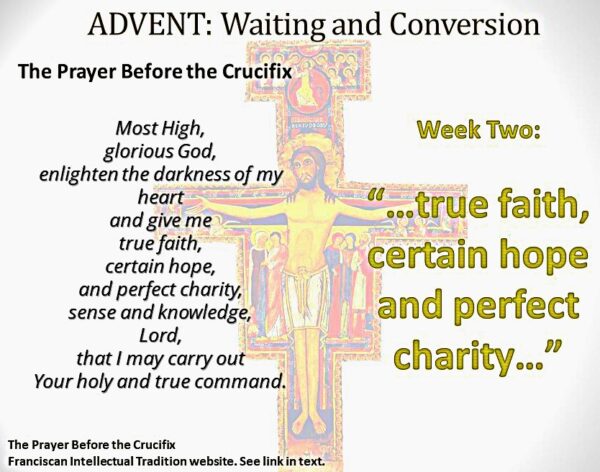
Formation Friday – December 6, 2024
Please share with your local fraternity
(All three parts together will work well for fraternity ongoing formation at any time of year.)
During Advent we wait for the coming of our Lord Jesus Christ. We know that he walked on this earth. We know that he is always with us in the Eucharist. But now, we wait for Him to come again.
For three weeks we will focus on the prayer that St. Francis prayed as he knelt before the Crucifix of San Damiano. Each part of it has significance during this time of waiting and conversion.
Most High,
glorious God,
enlighten the darkness of my heart
and give me
true faith,
certain hope,
and perfect charity,
sense and knowledge,
Lord,
that I may carry out
Your holy and true command.
Part Two: Faith and Hope
“…and give me true faith, certain hope, and perfect charity, sense and knowledge, Lord,”
CONSIDER:
+ Our Rule: Article 19—”Mindful that they are bearers of peace which must be built up unceasingly, they should seek out ways of unity and fraternal harmony through dialogue, trusting in the presence of the divine seed in everyone and in the transforming power of love and pardon.
Messengers of perfect joy in every circumstance, they should strive to bring joy and hope to others.”
+ Our Rule: Article 9—”The Virgin Mary, humble servant of the Lord, was open to his every word and call. She was embraced by Francis with indescribable love and declared the protectress and advocate of his family15. The Secular Franciscans should express their ardent love for her by imitating her complete self-giving and by praying earnestly and confidently16.”
+Admonition XXVII: Virtue Puts Vice to Flight
1Where there is charity and wisdom, there is neither fear nor ignorance.
2Where there is patience and humility, there is neither anger nor disturbance.
3Where there is poverty with joy, there is neither greed nor avarice.a
4Where there is restb and meditation, there is neither anxiety nor restlessness.
5Where there is fear of the Lord to guard an entrance, Lk 11:21 there the enemy cannot have a place to enter.
6Where there is a heart full of mercyc and discernment, there is neither excess nor hardness of heart.
+ During Advent, we strive to imitate our Blessed Mother who brought joy and hope to the world through her “YES.” Now is the time to ask ourselves if we are saying yes to what the Lord is asking of us and to what we promised at our Profession.
Questions for discussion or to answer in your journal
+ How do you build peace in your fraternity and in your family? What are the most challenging times/topics that you encounter during family or fraternity gatherings, and how do you handle them?
+Which characteristics of the Blessed Mother do you strive to imitate? Consider Mary’s role in the Incarnation. What does it take to say YES to God?
+The Prayer Before the Crucifix occurred before the Admonitions were written. According to Admonition XXVII, how did God answer Francis’s prayer?
Thank you to Anne Mulqueen, OFS, for her inspiration.
*************************
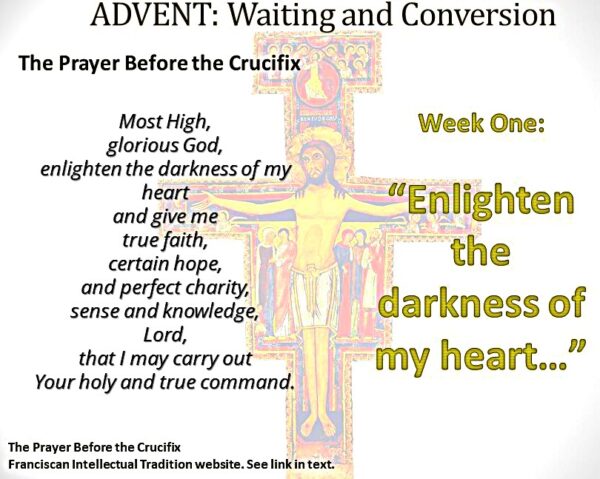
Formation Friday – November 29, 2024
Please share with your local fraternity
(All three parts, this week and the next two weeks, together will work well for fraternity ongoing formation at any time of year.)
Advent—Waiting and Conversion (Part 1)
During Advent we wait for the coming of our Lord Jesus Christ. We know that he walked on this earth. We know that he is always with us in the Eucharist. But now, we wait for Him to come again.
For three weeks we will focus on the prayer that St. Francis prayed as he knelt before the Crucifix of San Damiano. Each part of it has significance during this time of waiting and conversion.
Most High,
glorious God,
enlighten the darkness of my heart
and give me
true faith,
certain hope,
and perfect charity,
sense and knowledge,
Lord,
that I may carry out
Your holy and true command.
Part one: Daily Conversion
“Most High, glorious God, enlighten the darkness of my heart”
CONSIDER:
+Our Rule: Article 7— “United by their vocation as “brothers and sisters of penance”11, and motivated by the dynamic power of the gospel, let them conform their thoughts and deeds to those of Christ by means of that radical interior change which the gospel itself calls “conversion.” Human frailty makes it necessary that this conversion be carried out daily12. On this road to renewal the sacrament of reconciliation is the privileged sign of the Father’s mercy and the source of grace13.”
+Admonition 22: Correction
1Blessed is the servant who endures discipline, accusation, and reprimand from another as patiently as he would from himself.
2Blessed is the servant who, after being reprimanded, agrees courteously, submits respectfully, admits humbly, and makes amends willingly.
3Blessed is the servant who is not quick to excuse himself, and endures with humility, shame, and reprimand for a sin, when he did not commit the fault.
+During Advent, we examine our lives to prepare for the coming of Jesus. Now is a good time to see if we are living up to the call for daily conversion in our lives.
Questions for discussion or to answer in your journal
+ How do you live up to our call to daily conversion? During Advent, what spiritual improvements would you like to make in your life—even if they are little ones?
+ What were some of the key points of Francis’s conversion? How did he follow through? What can those moments teach us?
Thank you to Anne Mulqueen, OFS, for her inspiration.
*************************
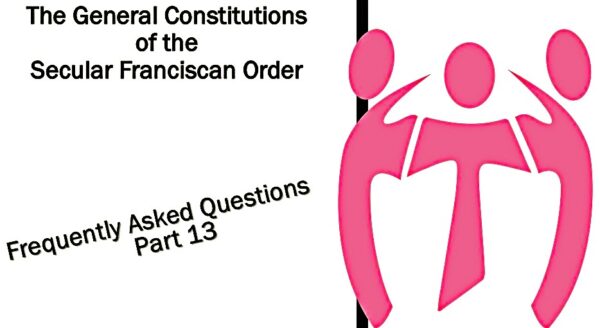
Formation Friday November 22, 2024
Frequently Asked Questions #13
Please share with your local fraternity
Frequently Asked Questions answered by our General Constitutions (GC): This week, and for several more, we continue to spotlight the questions given in the 2010 edition of the Handbook for Servant Leadership. Becoming familiar with the Constitutions is very helpful in addressing these questions and others that arise in fraternities at all levels. For the complete, latest translation of the entire document, visit: Ordo Franciscanus Saecularis or the National Website.
What is the spiritual and pastoral relationship between the First Order, TOR, and the OFS?
+Vital Reciprocity and role of the Spiritual Assistant [Articles 89-90] (For further and more complete information, please also see articles 85-88; the National Statutes, International Statutes, and the Handbook for Spiritual Assistance)
Articles 89-90 Role of the Spiritual Assistant
Article 89
- By virtue of the vital reciprocity between the religious and the secular members of the Franciscan Family and the responsibilities of Major Superiors, spiritual assistance to the Fraternities of the OFS at all levels must be assured as a fundamental element of communion.
- The Spiritual Assistant is the person designated by the competent Major Superior to carry out this service for a specific Fraternity of the OFS.
- To be a witness of Franciscan spirituality and of the fraternal affection of the religious towards the Secular Franciscans, and to be a bond of communion between his Order and the OFS, the Spiritual Assistant should be a Franciscan religious, member of the First Order or the TOR.
- When it is not possible to give such a Spiritual Assistant to the Fraternity, the competent Major Superior can entrust the service of spiritual assistance to: a) religious brothers or sisters of other Franciscan institutes;
- b) diocesan clerics or other persons, specially prepared for such service who are members of the OFS;
- c) other diocesan clerics or religious who are not Franciscan.
- Prior authorization of the Superior or the local Ordinary, when needed, does not exempt the Franciscan Major Superior of the responsibility for the quality of pastoral service and of spiritual assistance given.
Article 90
- The principal task of the Assistant is to communicate Franciscan spirituality and to co-operate in the initial and continuing formation of the brothers and sisters.
- The Spiritual Assistant is by right, a voting member of the Council of the Fraternity to which he or she gives assistance and collaborates with it in all activities. However, the Spiritual Assistant does not exercise the right to vote in financial questions*. (also See 90.3) [*or in elections seeStatutes for Spiritual and Pastoral Assistance]
After reading Articles 89 and 90, please discuss the following with a partner or in your fraternity
+Does your local fraternity have a Spiritual Assistant? Is he/she a member of a religious order, diocesan clergy, or OFS?
+What role does the Spiritual Assistant play in your fraternity?
+How does your fraternity’s Spiritual Assistant fulfill Article 90.1 above? How does this help you in your vocation as a Secular Franciscan?
*************************
Formation Friday November 15, 2024
Frequently Asked Questions #12
Please share with your local fraternity
Frequently Asked Questions answered by our General Constitutions (GC): This week, and for several more, we continue to spotlight the questions given in the 2010 edition of the Handbook for Servant Leadership. Becoming familiar with the Constitutions is very helpful in addressing these questions and others that arise in fraternities at all levels. For the complete, latest translation of the entire document, visit: Ordo Franciscanus Saecularis or the National Website.
Focus on the Pastoral Visit
+What is the focus of the Pastoral Visit? [Article 95]
Article 95 The Pastoral Visit
- The pastoral visit is a privileged moment of communion with the First Order and the TOR. It is carried out also in the name of the Church and serves to guarantee and promote the observance of the Rule and the Constitutions and fidelity to the Franciscan charism. The visit is carried out with respect to the organization and the law proper to the OFS itself.
- Having verified that the Fraternity was canonically erected, the Visitor will give attention to the relations between the Fraternity and its Spiritual Assistant and the local Church. The Visitor will meet the pastors (Bishop or parish priest) when this is opportune for fostering communion and service for building up the Church.
- The Visitor will promote collaboration and a sense of co-responsibility among the secular leaders and the Spiritual Assistants. The Visitor is to confirm the quality of spiritual assistance given to the visited Fraternity, encourage the Spiritual Assistants in their service and promote their continuing spiritual and pastoral formation.
- The Visitor will give special attention to programs, methods and experiences of formation, to liturgical and prayer life, and to the apostolic activities of the Fraternity.
After reading Article 95, please discuss the following with a partner or in your fraternity
+Why would it be the role of the pastoral visitor to guarantee fidelity to the Franciscan charism?
+How does the visitor determine if the local fraternity has been “canonically erected?” Have you ever seen your fraternity’s document of establishment?
+Number 2 above mentions the relationship between the fraternity and the local Church. Describe your fraternity’s relationship with the parish(es) of the fraternity members and/or the parish or monastery where the fraternity meets.
+The pastoral visitor is tasked with giving attention to the formation programs and spiritual life of the fraternity. Discuss how a pastoral visitor from outside your local fraternity would describe/evaluate your initial and ongoing formation programs and the prayer life of your fraternity. What suggestions do you think they would make, if any?
*************************
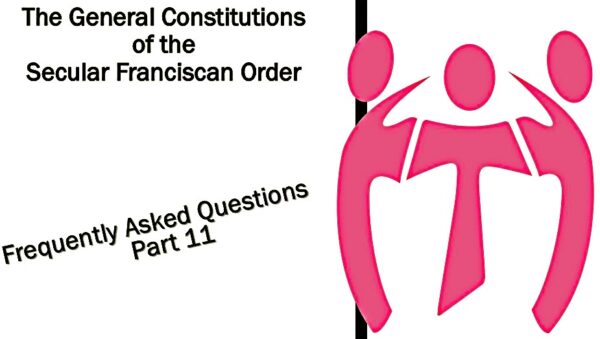
Formation Friday November 8, 2024
Frequently Asked Questions #11
Please share with your local fraternity
Frequently Asked Questions answered by our General Constitutions (GC): This week, and for several more, we continue to spotlight the questions given in the 2010 edition of the Handbook for Servant Leadership. Becoming familiar with the Constitutions is very helpful in addressing these questions and others that arise in fraternities at all levels. For the complete, latest translation of the entire document, visit: National Website.
Focus on the Fraternal Visit
+What is the focus of the Fraternal Visit? [Article 94]
Article 94 The Fraternal Visit
- The fraternal visit is a time of communion, an expression of the service and genuine interest of the secular leaders at the various levels, so that the Fraternity may grow and be faithful to its vocation (cf GC 51).
- Among the various initiatives to achieve the purpose of the visit, the Visitor will give special attention:
– to the validity* of the formation, both initial and permanent;
– to the relations maintained with other Fraternities at the different levels, with Franciscan Youth, and with the entire Franciscan Family.
– to the observance of directives and of the guidelines of the CIOFS and of the other Councils;
– to presence in the local Church.
- The Visitor will check the report of the latest audit or verification of the financial and asset management of the Council, the register of the accounts and every document pertaining to the assets of the Fraternity and, if applicable, the status of the juridical personality in the civil order, including the fiscal aspects. In the absence of the required audit of the financial and asset management of the Council, the Visitor can commission such an audit, by a professional who is not a member of the Council concerned, the cost of which will be borne by the Fraternity visited. Wherever he or she deems it opportune, the Visitor will obtain the assistance of a person competent in these matters.
- The Visitor will check the records of the election of the Council. He or she will evaluate the quality of the service offered to the Fraternity by the Minister, and by the other leaders, and will explore with them the solution to problems which may arise.
If, for whatever reason, he or she should find that their service does not meet the needs of the Fraternity, the Visitor will recommend appropriate actions to take. If circumstances require it, he or she can consider also provisions concerning resignation and removal from office (cf articles 83 and 84) .
- The Visitor may not carry out the visit of his or her own Local Fraternity, nor of the Council of another level of which he or she is a member.
*The “validity” of formation should also include appropriateness and completeness of the program to ensure that candidates are properly formed and that professed members continue to deepen their understanding of the Order and their place in the Order.
After reading Article 94, please discuss the following with a partner or in your fraternity
+What has been your experience with visitations of your local and/or regional fraternities?
+Paragraph 2 mentions four important aspects of the visit: formation, relationships, directives, and presence in the local Church. Why are each of these important for the life of the fraternity?
+Why is it important that the fraternal visitor check the fraternity’s financial records?
+The visitor also checks the records of the election. Why is this important?
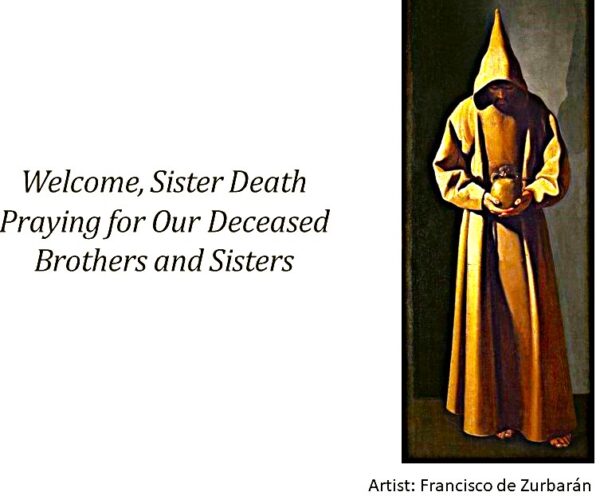
Formation Friday November 1, 2024
Welcome Sister Death
Please share with your local fraternity
During the month of November, the entire Church prays for the dead. St. Francis meditated on Sister Death throughout his life. Toward the end of his earthly life, he spoke of Sister Bodily Death in the Canticle of the Creatures.
“Praised be You, my Lord, through our Sister Bodily Death, from whom no one living can escape.
Woe to those who die in mortal sin.
Blessed are those whom death will find in Your most holy will,
for the second death shall do them no harm.” [FA: ED vol 1, p. 158]
Our Rule and Constitutions ask us to remain in communion with our deceased brothers and sisters.
Rule, Article 19: Since they are immersed in the resurrection of Christ, which gives true meaning to Sister Death, let them serenely tend toward the ultimate encounter with the Father.
Rule, Article 24: It should adopt appropriate means for growth in Franciscan and ecclesial life and encourage everyone to a life of fraternity42. This communion continues with deceased brothers and sisters through prayer for them.
GC, Article 27.2: Secular Franciscans should commit themselves to create in their environment and, above all, in their fraternities, a climate of faith and hope so that “Sister Death” may be regarded as a passage to the Father, and all may prepare themselves with serenity.
There is a tradition in the Catholic Church dating back to Pope Clement XII in 1736 who encouraged all Catholics to pray Psalm 130, also known as the “De Profundis” followed by the short prayer, “Eternal rest grant unto them, Oh Lord,…” for all of our deceased brothers and sisters in Christ.
Psalm 130 “De profundis clamavi ad te, Domine…”
I
I out of the depths I call to you, LORD;
2Lord, hear my cry! May your ears be attentive to my cry for mercy.
3If you, LORD, keep account of sins, Lord, who can stand?
4But with you is forgiveness and so you are revered.
II
5I wait for the LORD, my soul waits and I hope for his word.c
6My soul looks for the Lord more than sentinels for daybreak. More than sentinels for daybreak,
7let Israel hope in the LORD, For with the LORD is mercy, with him is plenteous redemption,
8And he will redeem Israel from all its sins. To ponder and discuss with a prayer partner or in fraternity throughout the month of November:
+How do you remember in prayer the deceased members of your family?
+How does your fraternity (local, regional, and national) remember our deceased members?
+Share some thoughts on how your local fraternity might celebrate a Rite of Remembrance for your deceased members.
Challenge: This month, pray the De Profundis (Psalm 130) for all those who have died, especially those who have no one to pray for them.
*************************
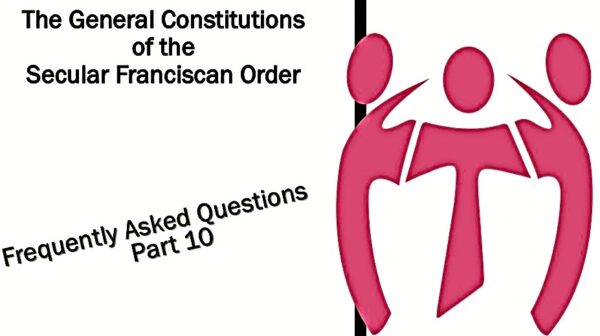
Formation Friday October 25, 2024
Frequently Asked Questions #10
Please share with your local fraternity
Frequently Asked Questions answered by our General Constitutions (GC): This week, and for several more, we continue to spotlight the questions given in the 2010 edition of the Handbook for Servant Leadership. Becoming familiar with the Constitutions is very helpful in addressing these questions and others that arise in fraternities at all levels. For the complete, latest translation of the entire document, visit Ordo Franciscanus Saecularis or the National Website.
+ What are the general guidelines and purpose for pastoral and fraternal visits? [GC Article 92]
Constitutions Article 92: The Fraternal and Pastoral Visits
Article 92
- Refers to Rule Art. 26. The purpose of both the pastoral and fraternal visits is to revive the evangelical Franciscan spirit, to assure fidelity to the charism and to the Rule, to offer help to fraternity life, to reinforce the bond of the unity of the Order, and to promote its most effective integration into the Franciscan family and the Church.
Paragraphs 2 and 3 speak of the request to the higher level of fraternity for a visitation and the request by a council member for an emergency visitation under special circumstances.
+After reading the above article [92]:
—Discuss with a partner or with your fraternity your experience with visitations of your local fraternity.
—If your fraternity has not experienced a visitation from the higher level recently, ask your Minister why this has not happened.
Article 93 (Summary)—Fraternal and Pastoral Visits Read the entire article here: The General Constitutions
- The visitor verifies the evangelical and apostolic vitality observance of the Rule and Constitutions; relationship with the Order and the Church.
- The visitor will contact council prior to the visit to determine expectations; at the visit will examine the register and records and the previous visitation report; the visitor will share a report with the fraternity visited and will share that report with the council of the higher level which has delegated him/her to do the visit.
- The visitor will meet with the entire fraternity; with those in formation; and those with special issues.
- If it benefits the service of the Fraternity, the two visitors, secular and religious, may make the visit at the same time, agreeing beforehand on the program, in a way most consistent with the mission of each of them.
- The fraternal and pastoral visits, carried out by the immediately higher level, do not prevent the visited Fraternity from having the right to appeal to the Council or to the Conference of Spiritual Assistants of a higher level.
+After reading the summary of Article 93 above and the complete article at the link provided, discuss:
—How can the visitor determine if the Rule and Constitutions are being followed?
—Why is the relationship with the Order and the Church so important to the life of a fraternity?
—Discuss why it is so important that everyone see the report that the visitors will write.
—At visitations, do you recall that the visitors met with the entire fraternity? What was the discussion?
—Why would they want to meet with those in initial formation?
Our next part of this series will look specifically at the tasks carried out by the fraternal and pastoral visitors. [Articles 94 and 95]
*************************
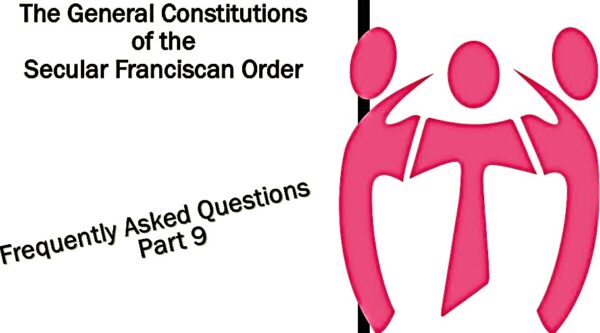
Formation Friday October 18, 2024
Frequently Asked Questions #9
Please share with your local fraternity
Frequently Asked Questions answered by our General Constitutions (GC): This week, and for several more, we continue to spotlight the questions given in the 2010 edition of the Handbook for Servant Leadership. Becoming familiar with the Constitutions is very helpful in addressing these questions and others that arise in fraternities at all levels. For the complete, latest translation of the entire document, visit Ordo Franciscanus Saecularis or the National Website.
+ What are the provisions for voluntary temporary withdrawal or suspension? [GC Article 57]
Constitutions Article 57: Voluntary withdrawal or suspension
- In the case of voluntary withdrawal or of suspension from the Fraternity, the Secular Franciscan may ask to be readmitted by submitting an appropriate written request to the Minister.
- After examining the reasons offered by the person involved, the Council evaluates whether the causes which led to the withdrawal or suspension can be considered resolved. If the conclusion is affirmative, the Council readmits him or her and the decision is recorded in the proceedings of the Fraternity.
+After reading the above article [57]:
—Discuss with a partner or with your fraternity what reasons a member might offer for wanting to return to the fraternity after a TEMPORARY (VOLUNTARY) WITHDRAWAL.
—Discuss why the Council should discuss and evaluate whether the person should return to fraternity life.
—Discuss what reasons a person might offer for wanting to return after SUSPENSION from the fraternity. [How might these reasons be different from those given for returning from temporary (voluntary) withdrawal?]
—Discuss what the Council might be looking for to make a decision regarding readmission of a member after suspension from fraternity life.
PLEASE KEEP IN MIND that both the member and the Council need to be open to the action of the Holy Spirit. These can be very challenging discussions. Discussing the circumstances before they ever occur can prepare everyone for what may be needed in the future.
Definitive Provisions (It is necessary to read the entire article 58 here: General Constitutions
Article 58 (highlights)
In 58.1 The member wants to withdraw definitively from the Order. Take note of the important steps:
—Inform Minister in writing; dialogue with the Minister and Spiritual Assistant; confirm in writing to the Council; Council acts and informs the member in writing; withdrawal is recorded in the register and database. (Keep in mind that “definitive provisions” are irrevocable.)
+What are some reasons why a member might decide to withdraw permanently from the Order?
+What kind of discernment should take place before this decision is made?
58.2 Dismissal from the Order (This portion of the article should be read carefully and prayerfully.)
It is to be noted that for dismissal, the reasons must be: “grave reasons, that are external, imputable and juridically proven.” [Endnote xix defines “external” as “external to the Order.”]
+According to Article 58.2, under what circumstances might a member be dismissed from the Order?
Please spend some time with the remainder of Article 58.3 and.4. If further clarification is needed, please contact your Region for assistance.
*************************
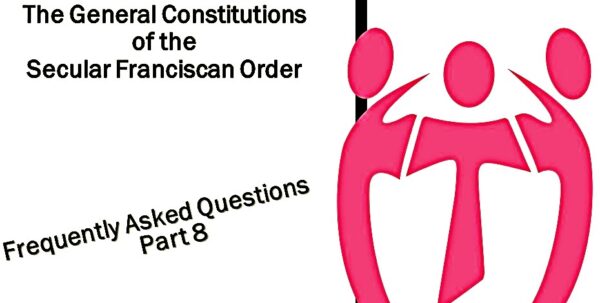
Formation Friday October 11, 2024
Frequently Asked Questions #8
Please share with your local fraternity
Frequently Asked Questions answered by our General Constitutions (GC): This week, and for several more, we return to the questions given in the 2010 edition of the Handbook for Servant Leadership. The same questions often arise on our councils and in our fraternities. Becoming familiar with the Constitutions is very helpful in addressing issues that arise in fraternities at all levels. For the complete, latest translation of the entire document, visit: Ordo Franciscanus Saecularis or the National Website.
+ How may an individual transfer from one fraternity to another? [GC Article 55]
Constitutions Article 55
If a brother or sister, for any reasonable cause, desires transfer to another Fraternity, he or she first informs the Council of the Fraternity to which he or she belongs and then makes the request, including the reasons for the transfer, to the Minister of the Fraternity to which he or she wishes to belong. The Council makes its decision after having received the necessary information in writing from the Fraternity of origin. (Please see the transfer form on the OFS-USA website. Print out and fill in the form—follow the instructions on page 1.) Transfer Form
—What are some reasons for wanting to transfer to another fraternity?
–After reading the transfer form, what questions do you have?
–Why would the transferring member need to attend gatherings of the new fraternity for a few months?
–Why do you think that the council of the receiving fraternity votes on acceptance of a transferee?
+What are the provisions for temporary or permanent withdrawal or removal from the Order? [GC Article 56]
56.1 Brothers and sisters who find themselves in difficulty may ask, with a formal act, temporary withdrawal from the Fraternity. The Council will evaluate the request with love and prudence, after a fraternal dialogue between the Minister and the Spiritual Assistant with the person concerned. If the reasons appear to be well founded, after the brother or sister in difficulty has been given time to reconsider, the Council agrees to the request.
–Under what circumstances would a member ask for temporary withdrawal from the fraternity?
–Have you ever thought of asking for temporary withdrawal? How was it handled in your fraternity?
56.2 Repeated and prolonged failure to fulfil the obligations required for the life of the Fraternity and other conduct in serious conflict with the Rule have to be discussed by the Council in dialogue with the person at fault.
Only in the case of obstinacy or relapse may the Council decide, with a secret vote, to suspend someone. It communicates its decision in writing to the person concerned.
–Which obligations would affect the fraternity in such a way as to have the Council consider suspension of a member?
–What conduct might be in serious conflict with the Rule?
–Why must the Council discuss this with the person? Why would dialogue be very important in this case?
–Why would the suspension only come after “obstinacy or relapse?”
56.3 Voluntary withdrawal or the provision for suspension must be noted in the registers of the Fraternity. It involves exclusion from the meetings and activities of the fraternity, including the right of active and passive voice, but membership in the Order itself is not affected.
–Why is it important for members to be clear about what voluntary withdrawal or suspension means to them with regard to the fraternity?
[More on withdrawals, suspensions, reinstatements, and permanent withdrawals in the coming weeks.]
*************************

HAPPY FEAST DAY!
Formation Friday October 4, 2024
Please share with your local fraternity
The Canticle of the Creatures
Today, on the Feast Day of our Seraphic Father St. Francis, we offer his own words as they appear in the Canticle of the Creatures. Composed in 1225 during his last illness, St. Francis gives glory to God through all of creation in the first portion of the canticle. Ever the peacemaker, he added verses 10 and 11 at a time when the political and religious authorities of Assisi were in conflict. Then, right before his death, he added two verses praising God for “Sister Bodily Death,” calling us to penance and conversion.
The Canticle of the Creatures
1Most High, all-powerful, good Lord,
Yours are the praises, the glory, and the honor, and all blessing, Rv 4:9 Rv 4:11
2To You alone, Most High, do they belong,
and no human is worthy to mention Your name.d
3Praised be You, my Lord, with all Your creatures, Tb 8:7
especially Sir Brother Sun,
Who is the day and through whom You give us light.e
4And he is beautiful and radiant with great splendor;
and bears a likeness of You, Most High One.
5Praised be You, my Lord, through Sister Moon and the stars, Ps 148:3
in heaven You formed them clear and precious and beautiful.a
6Praised be You, my Lord, through Brother Wind,
and through the air, cloudy and serene, and every kind of weather,
through whom You give sustenance to Your creatures.
7Praised be You, my Lord, through Sister Water, Ps 148:4 Ps 148:5
who is very useful and humble and precious and chaste.
8Praised be You, my Lord, through Brother Fire, Dn 3:66
through whom You light the night, Ps 78:14 [Vulgate, Ps 77:14]
and he is beautiful and playful and robust and strong.
9Praised be You, my Lord, through our Sister Mother Earth, Dn 3:74
who sustains and governs us,
and who produces various fruit with colored flowers and herbs. Ps 104:13 [Vulgate, Ps 103:13] Ps 104:14 [Vulgate, Ps 103:14]
10Praised be You, my Lord, through those who give pardon for Your love, Mt 6:12
and bear infirmity and tribulation.b
11Blessed are those who endure in peace
for by You, Most High, shall they be crowned.
12Praised be You, my Lord, through our Sister Bodily Death,
from whom no one living can escape.c
13Woe to those who die in mortal sin.
Blessed are those whom death will find in Your most holy will,
for the second death Rv 2:11 Rv 20:6 shall do them no harm.d
14Praise and bless my Lord Dn 3:85 and give Him thanks
and serve Him with great humility.
After reading the Canticle, go back and look at the Scripture sources indicated—read the passages—see how Francis was influenced by his intimate knowledge of Scripture.
+What part does Scripture play in your daily life? What does “going from Gospel to life and life to the Gospel” (Article 4 of our Rule) mean to you?
Reread verses 10 and 11 of the Canticle.
+How do you serve as a peacemaker in your family, job, or community?
+In what ways is it difficult for you to “forgive” those who don’t agree with you?
+Verse 10 calls to mind the story of Perfect Joy. What is Francis telling us in that story and in this canticle?
Verses 12 and 13 talk about the end of life and how we are to prepare.
+Give some thought to the qualities it takes to accept our eventual death or the death of someone we love.
+Reread the Prologue to the Rule of 1978, especially “Concerning Those Who Do Not Do Penance.” Why are penance and conversion so important to us?
Here is a short video about the Transitus of St. Francis celebrated on October 3rd.
*************************
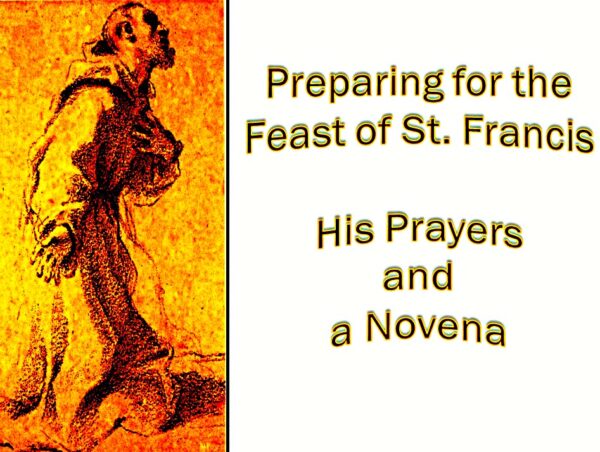
Formation Friday September 27, 2024
Preparing for the Feast of St. Francis–His Prayers and a Novena
(click on the Titles in Blue)
As the feast day of St. Francis approaches, we share a link to the Novena to St. Francis which started on September 25th. (If you have not started the novena yet, you can certainly catch up!)
Also, this week we provide links to the special prayers of St. Francis with some general questions for meditation.
Novena on the St. Anthony Shrine website started on 9/25: ST. FRANCIS NOVENA
Links to some of the prayers of St. Francis with which we should all be familiar: (Over the next few days, read the complete prayer and some background material on the Franciscan Intellectual Tradition website.)
THE TESTAMENT PRAYER
“We adore you, Lord Jesus Christ, in all your churches throughout the whole world, and we bless you, because by your holy cross you have redeemed the world.” TESTAMENT PRAYER
PRAYER BEFORE THE CRUCIFIX
“Most high, glorious God, enlighten the darkness of my heart. And give me true faith, certain hope, and perfect charity…” PRAYER BEFORE THE CRUCIFIX
PRAYER FROM THE LETTER TO THE ENTIRE ORDER
A PRAYER INSPIRED BY THE OUR FATHER
THE PRAISES TO BE SAID AT ALL THE HOURS
“Holy, holy, holy Lord God Almighty, Who is, and Who was, and Who is to come: And let us praise and glorify Him forever…”
THE PRAISES OF GOD AND THE BLESSING
“You are the holy Lord God Who does wonderful things. You are strong. You are great. You are the most high….”
THE CANTICLE OF BROTHER SUN
“Most High, all-powerful, good Lord, Yours are the praises, the glory, the honor, and all blessing,”
PRAYER AND THANKSGIVING (Chapter XXIII of the EarlierRule—Regula non Bullata)
“All-powerful, most holy, Almighty and supreme God,…”
SALUTATION OF THE BLESSED VIRGIN MARY
“Hail, O Lady, Holy Queen, Mary, holy Mother of God, Who are the Virgin made Church, chosen by the most Holy Father in heaven whom he consecrated with His most holy beloved Son and with the Holy Spirit the Paraclete, 3in whom there was and is all fullness of grace and every good….”
Some questions to think about, discuss, or to answer in your journal.
If you cannot read all of the prayers listed above in one sitting, choose 2 or 3 at a time. As you read and then pray, please think about the following:
+What are the common themes in all of Francis’s prayers?
+Where can these prayers fit into our prayer lives as Franciscans?
+As you consider the words of these prayers, what stands out as being important to St. Francis? How do these ideas and feelings affect us as Franciscans?
*************************
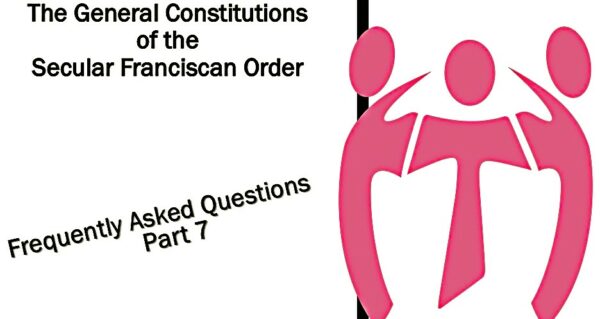
Formation Friday September 20, 2024
Frequently Asked Questions #7
Frequently Asked Questions answered by our General Constitutions (GC): For the next several weeks we will take a look at some questions given in the 2010 edition of the Handbook for Servant Leadership. The same questions often arise on our councils and in our fraternities. Becoming familiar with the Constitutions is very helpful in addressing issues that arise in fraternities at all levels. For the complete, latest translation of the entire document, visit: Ordo Franciscanus Saecularis or the National Website.
+ What provisions for life in fraternity should be made by the fraternity? [GC Article 53]
Please read each section and discuss the questions that follow. Also, read the article of the Rule mentioned.
Constitutions Article 53
- OFSRule Article 24.The Fraternity must offer to its members opportunities for coming together and collaborating through meetings to be held with as great a frequency as allowed by the situation and, with the involvement of all its members.
+ How often does your fraternity gather? How long are the gatherings? Do you wish you gathered more or less? Why?
+ Each time you meet, what is the pattern of the gatherings? (Prayer, announcements, ongoing formation, etc.)
+ What would you change about the gathering? (Your discussion group might want to share this with the council.)
+ How would you describe the environment of your fraternity gatherings? What suggestions would you make to the council?
- OFSRule Articles 6; 8.The fraternity should come together periodically, also as a Church community to celebrate the Eucharist in a climate which strengthens the fraternal bond and characterizes the identity of the Franciscan family. Where, for whatever reason, this particular celebration may not be possible, they should participate in the celebration of the larger Church community.
+ On what occasions does your fraternity attend mass together?
- To belong to the OFS, it is essential to be attached to a local Fraternity and be actively involved in the life of that Fraternity. Appropriate initiatives should be adopted according to the directives of the National Statutes, to keep those brothers and sisters united to the Fraternity who — for valid reasons of health, family, work, or distance — cannot actively participate in community life.
+ Does your fraternity have members who only attend occasionally? How can you encourage them to participate?
+ Does you fraternity have members who are excused from gatherings for good reason? How does the fraternity maintain contact with them? How do you personally maintain contact with one or more of these members?
- The Fraternity remembers with gratitude its brothers and sisters who have passed away and continues its communion with them by prayer and in the Eucharist.
+ How does your fraternity remember those who have passed away?
+ Is there anything special that you do as a fraternity when someone passes?
+ What is done for those who have died in past years as part of fraternity life?
- The National Statutes can provide special ways of associating with the Fraternity for those who, without becoming a member of the OFS, want to participate in its life and activities.
You can read the Statues at National Statutes
*************************
Formation Friday September 13, 2024
The Stigmata of St. Francis September 17th (800th Anniversary)
We interrupt our series on the frequently asked questions answered by our General Constitutions to highlight
the 800th Anniversary of St. Francis being marked with the wounds of Christ. (The Stigmata)
+ St. Francis received the Stigmata around the feast of the Triumph of the Holy Cross in
September of 1224—two years before his death.
+He was praying on Mt. La Verna preparing for the feast of St. Michael the Archangel. Brother Leo was nearby.
+While praying, He asked God for two things. One, to let him experience the suffering Christ endured on the Holy
Cross and two, for him to experience the love in which He did it.
+ Shortly thereafter, Francis saw a Seraph with six wings. (Seraphs are angels of the highest order who are closest
to God and most passionate in praising Him.) Between the wings was the image of a crucified man. When the vision
disappeared, Francis was marked with the wounds of Christ. (St. Francis’s encounter with the Seraph and his
passion in praising the Father has caused the Franciscan Order to be called the Seraphic Order and St. Francis our
Seraphic Father.
+ We celebrate the Feast of the Stigmata on September 17th
+ St. Francis is the first person in recorded Christian history to receive the Stigmata.
The Stigmata: Inspiration for our spiritual lives as Franciscans
The marks in our lives:
—What does it mean to be marked?
—What marks us in our lives?
—As Catholics, how are we marked? How are we marked as Franciscans?
—How do the things that mark us, help us to move forward in our spiritual lives?
Now, Gaze at the Cross:
—As we gaze at the wounds of Christ, what comes to mind?
—As we consider what Jesus suffered for us, how do we respond?
—As we contemplate Jesus’s willingness to die for us, what are we willing to do for our brothers and sisters?
—As we imitate Jesus in our lives, how are we willing to use our lives in the service of others?
Prayer to the Five Wounds of the Lord prayed by St. Clare of Assisi
Prayer of Pope St. John Paul II (On a visit to Mt. La Verna in 1983)
O St Francis, stigmatized on La Verna, the world longs for you, that icon of the crucified Jesus.
It has need of your heart, open to God and to others; of your bare, wounded feet, of your pierced hands raised in
supplication. It longs for your voice so frail yet forceful with the power of the Gospel.
Francis, help the people of this age to recognize the evil of sin and to seek purification from it in penance.
Help them to become free from the very structures of sin that oppress today’s society.
Rekindle in the consciousness of those in government an urgent need for peace between nations and peoples.
Instill in young people your freshness of life that is capable of withstanding the snares of the many cultures of
death. To those injured by every type of evil teach, O Francis, the joy of being able to forgive.
To all those crucified by suffering, hunger and war, reopen the doors of hope. Amen.
*************************
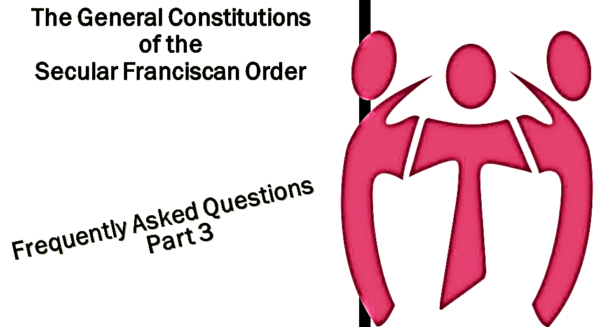
Formation Friday August 16, 2024
Frequently Asked Questions #3
Please share with your local fraternity
Frequently Asked Questions answered by our General Constitutions (GC): For the next several weeks we will take a look at some questions given in the 2010 edition of the Handbook for Servant Leadership. The same questions often arise on our councils and in our fraternities. Becoming familiar with the Constitutions is very helpful in addressing issues that arise in fraternities at all levels. For the complete, latest translation of the entire document, visit: Ordo Franciscanus SaecularisConsilium Internationale OFS (CIOFS) | Secular Franciscan Order or Secular Franciscan Order – USA
+ Who is responsible for formation and entrance into the Order? [GC Article 37]
1. Rule 23. Membership in the Order is attained through a time of initiation, a time of formation, and the Profession of the Rule.
2. The journey of formation, which should develop throughout life, begins with entrance into the fraternity. Mindful that the Holy Spirit is the principal agent of formation and always attentive to collaboration with Him, those responsible for formation are: the candidate, the entire Fraternity, the Council with the Minister, the Teacher of Formation (formator), and the Spiritual Assistant.
3. The brothers and sisters are responsible for their own formation, developing in an ever more perfect way the vocation received from the Lord. The Fraternity is called to help the brothers and sisters on this journey by means of a warm welcome, prayer, and example.
4. The National and Regional Councils, by common agreement, are expected to develop and adopt means of formation, adapted to the local situations and offered as a help to those responsible for formation in the individual Fraternities.
After reading Article 37, please discuss the following with your fraternity members.
+ What do you remember about your time of initial formation?
—If you are now an aspirant or a candidate, share the highlights of your formation with the professed members.
—If you are a professed member, how does the present initial formation program compare with what you experienced?
+ Explain why the Holy Spirit is the principal agent of formation.
+ What are some ways that we can be responsible for our own formation? Give examples of how the members of your fraternity help to “form” you?
+ Has your fraternity/region reached out to the regional or national formation teams for assistance? National and regional formation teams are happy to give help, talks, and general encouragement.
+ What are the conditions, process, and responsibilities for entrance into the Order? [GC Article 39]
1. Rule 23. The request for admission to the Order is presented by the aspiring member to the Minister of a local or personal Fraternity by a formal act, in writing if possible.
2. Conditions for admission are: to profess the Catholic faith, to live in communion with the Church, to be of good moral standing, and to show clear signs of a vocation.
3. The Council of the Fraternity decides collegially on the request, gives a formal answer to the aspiring member, and communicates this to the Fraternity.
4. The rite of admission is performed according to the Ritual27. The act is to be registered and preserved in the records of the Fraternity.
After reading Article 39, please discuss the following questions:
+ Why is #2 above so important for those who wish to be admitted to the Order (and also for professed members)?
+Read the Rite of Admission in the Ritual
—What stands out to you about the commitment we make when we are admitted to the Order?
Diane F. Menditto, OFS
Vice Minister, National Fraternity, Secular Franciscan Order USA
Listen – Discern – Go Forth National Theme 2022-2025
*************************
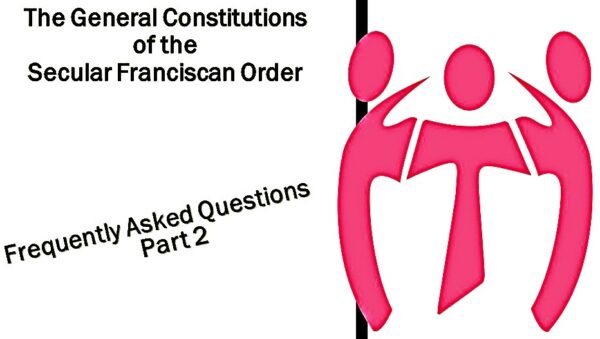
Formation Friday August 9, 2024
Frequently Asked Questions #2
Please share with your local fraternity
Frequently Asked Questions answered by our General Constitutions (GC): For the next several weeks we will take a look at some questions given in the 2010 edition of the Handbook for Servant Leadership. The same questions often arise on our councils and in our fraternities. Becoming familiar with the Constitutions is very helpful in addressing issues that arise in fraternities at all levels. For the complete, latest translation of the entire document, visit: Ordo Franciscanus Saecularis Consilium Internationale OFS (CIOFS) | Secular Franciscan Order or Secular Franciscan Order – USA
+ What is the purpose of fraternity? [GC Article 28]
1. The Fraternity of the OFS finds its origin in the inspiration of Saint Francis of Assisi…[See complete document]
2. Rule 20. “The OFS is divided into fraternities of various levels.” Its purpose is to promote, in an orderly form, union and mutual collaboration among the brothers and sisters and their active and communal presence in both the local and the universal Church. [See complete document]
3. [See complete document]
+ What responsibilities do members have to their fraternities? [GC Article 30]
1. The brothers and sisters are co-responsible for the life of the Fraternity to which they belong and for the OFS as the organic union of all Fraternities throughout the world.
2. The sense of co-responsibility of the members requires personal presence, witness, prayer, and active collaboration, in accordance with each one’s situation and possible obligations for the animation of the Fraternity.
3. Rule 25. In a family spirit, each brother and sister should make a contribution to the Fraternity fund, according to each one’s means, to provide the financial means needed for the life of the Fraternity and for its religious, apostolic, and charitable works. The brothers and sisters will also provide the means necessary for supporting the activities and the operations of the Fraternities at higher levels, both by their financial assistance and by their contributions in other areas as well.
+What kind of leadership is expected of the minister and councilors? [Articles 31 and 32]
Article 31
1. Rule 21. “On various levels, each Fraternity is animated and guided by a Council and Minister (or President).” [See complete document]
2. The office of Minister or Councilor is a fraternal service, a commitment to hold oneself available and responsible in relation to each brother and sister and to the Fraternity so that each one may realize his or her own vocation and each Fraternity may be a true community, ecclesial and Franciscan, actively present in the Church and in society.
3. The leaders of the OFS at every level must be perpetually professed, convinced of the validity of the Franciscan evangelical way of life, attentive to the life of the Church and of society with a broad and encompassing vision, open to dialogue, and ready to give and receive help and collaboration.
4. [See complete document.]
Article 32
1. The Ministers and Councilors should live and foster the spirit and reality of communion among the brothers and sisters, among the various fraternities, and between them and the Franciscan family. They should, above all, cherish peace and reconciliation in and around the fraternity.
2. Rule 21. The Ministers’ and Councilors’ task to lead is temporary. [See complete document.]
After having read the complete articles mentioned above, please comment on the following:
+How does your fraternity and its members “live up to” what is described in articles 28 and 30? What is most challenging?
+Describe the leadership in your fraternity. Do the Minister and Councilors exemplify articles 31 and 32? How?
+What would be the ideal servant leadership team for your fraternity?
Diane F. Menditto, OFS
Vice Minister, National Fraternity, Secular Franciscan Order USA
Listen – Discern – Go Forth National Theme 2022-2025
*************************
*************************
Formation Friday August 2, 2024
The Pardon of Assisi – The Porziuncola Indulgence
Celebrated on August 2
Share with your local fraternity
+ This chapel was one of the churches restored by St. Francis.
+ This is the spot where, while listening to the Gospel, Francis understood what he was called by God to do.
+ Here he founded the Order in 1209.
+ In 1216 as Francis prayed that everyone could be brought to heaven, he obtained from Jesus in a vision the PARDON OF ASSISI—a plenary indulgence, which was later ratified by Pope Honorius III.
+ This is where the friars’ early general chapters were held—the Chapter of Mats of 1221 was attended by 5,000 friars.
+ Here, on October 3, 1226, St. Francis welcomed Sister Death lying naked on the ground just outside the chapel.“See to it, my sons, that you never abandon this place. If you are driven out from one side, go back in at the other. For this place is truly holy and is the dwelling place of God. Here, when we were but a few, the Most High gave us increase; here he enlightened the hearts of his poor ones by the light of his wisdom; here he set our wills on afire with the flame of his love. Here he who prays with a devout heart will obtain what he prays for and he who offends will be punished more severely. Wherefore, my sons, consider this dwelling place of God to be worthy of all honor, and with all your, with voice of joy, and praise, give glory to the Lord in this place.” (Words of the dying St. Francis, Celano 1, n. 106)
The Conditions for Receiving the Pardon
+ Each year from vespers on August 1 through August 2 (Feast of Our Lady of the Angels) you should visit either a Franciscan church or your own church.(At first the indulgence was only given for the Porziuncola, but it has been widened over the years.)
+You may obtain the indulgence any day of the year upon visiting the Porziuncola itself.
CONDITIONS TO OBTAIN THE PARDON OF ASSISI
Plenary Indulgence–(for oneself or for a departed soul)
Sacramental Confession to be in God’s sanctifying grace *(to be received within eight days before or after initiate “appeal” for the Plenary Indulgence);
*Participation in the Holy Mass with reception of the Holy Eucharist. Visit to a Catholic Church, followed by the Profession of FAITH (Nicene Creed or Apostles Creed),
Recite the OUR FATHER, in order to reaffirm and give witness to one’s Christian dignity, as a child of God, that one received in Baptism;
Pray for the Pope’s intentions: as Vicar of Christ, Shepherd of the Universal Church, and visible sign of unity among the Faithful
THE PARDON OF ASSISI
Also, if you are able to read Spanish, the link below has a very interesting article about the Porziuncola.
For discussion and reflection
+ Read Matthew 10: 9-15. This is the gospel that Francis heard read at the Porziuncola. Reflect on its meaning to all Franciscans and to us as Secular Franciscans.
+ On August 1-2, visit a Franciscan or other church and follow the conditions to receive the indulgence.
+ While you are there, spend time with the Blessed Sacrament. Consider your vocation and what God is asking of you.
Diane F. Menditto, OFS
Vice Minister, National Fraternity, Secular Franciscan Order USA
Listen – Discern – Go Forth National Theme 2022-2025
*************************
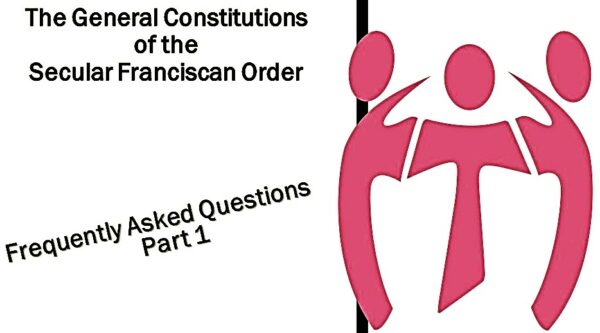
Formation Friday July 26, 2024
Please share with your local fraternity
Constitutions #1
Frequently Asked Questions answered by our Constitutions: For the next several weeks we will take a look at some questions given in the 2010 edition of the Handbook for Servant Leadership. The same questions often arise in our councils and in our fraternities. Becoming familiar with the Constitutions is very helpful in addressing issues that arise in fraternities at all levels. For the complete, latest translation of the entire document, visit: The General Constitutions of the Secular Franciscan Order (2000) or Consilium Internationale OFS (CIOFS) | Secular Franciscan Order
+ What official relationship does the OFS have within the Church? (See General Constitutions (GC) Article 1.5)
“The OFS is a public association in the Church. It is divided into fraternities at various levels: local, regional, national, and international. Each one has its own juridical personality within the Church.” [This is important because it tells us that we have official standing in the Church.]
+ Who may belong to the OFS? (See GC Article 2.1 and 2.2)
“The OFS is open to the faithful of every state of life. The following may belong to it:
– the laity (men and women);
– the secular clergy (deacons, priests, bishops).”
“…those who are bound by a perpetual commitment to another religious family or institute of consecrated life cannot belong to the OFS”
+ How is the OFS life different from religious life?” (See GC Articles 3.1 and 3.2)
1. The secular state characterizes the spirituality and the apostolic life of those belonging to the OFS.2. Their secularity, with respect to vocation and to apostolic life, expresses itself according to the respective state, that is:
– for the laity, contributing to building up the Kingdom of God by their presence in their life-situations and in their temporal activities.
– for the secular clergy, by offering to the People of God the service, which is properly theirs, in communion with the bishop and the clergy.
Both are inspired by the gospel options of Saint Francis of Assisi, committing themselves to continue his mission with the other branches of the Franciscan Family.
+ How is the OFS governed? What are its governing documents? (See GC Article 4)
1. The OFS is governed by the universal law of the Church, and by its own: Rule, Constitutions, Ritual, and particular Statutes iii
2. The Rule establishes the nature, purpose, and spirit of the OFS.
3. Rule 3. The Constitutions have as their purpose:
– to apply the Rule.
– to indicate concretely the conditions for belonging to the OFS, its government, the organization of life in fraternity, and its seat8.iv
For discussion in fraternity or to comment on in your journal
· When was the last time you read any part of our General Constitutions?
· How will the articles above help you to explain our Order to other people? (Perhaps to someone new who comes to the fraternity.)
· Challenge: Read the articles of the Constitutions above in their full form including the footnotes and the endnotes on our website or on the CIOFS website. Take special note of items you did not know before or had forgotten and share them in a discussion at a fraternity gathering.
Diane F. Menditto, OFS
Vice Minister, National Fraternity, Secular Franciscan Order USA
Listen – Discern – Go Forth National Theme 2022-2025
**********************
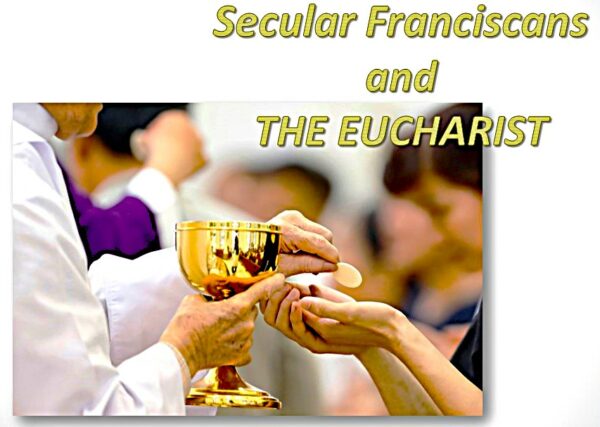
Formation Friday July 19, 2024
Secular Franciscans and the Eucharist
Please share with your local fraternity
Since July is the month of the Precious Blood, and we are also celebrating the three-year Eucharistic Revival, we repeat some of our previous posts on the Eucharist this month.
St. Francis was devoted to the Eucharist. In the first Admonition, he says. “This is my Body and the Blood of my new covenant [which will be shed for many];{snippet Mk 14:22} 11 and Whoever eats my flesh and drinks my blood has eternal life. {snippet Mk 14:24} 12 It is the Spirit of the Lord,{snippet Jn 6:55} therefore, That lives in Its faithful, That receives the Body and Blood of the Lord. 13 All others who do not share in this same Spirit and presume to receive Him eat and drink judgment on themselves. {snippet 1 Cor 11:29}”(The Admonitions: FA:ED, vol. 1, p. 129)
As we follow in the footsteps of our Seraphic Father, we, too, are devoted to the most precious Body and Blood of our Lord Jesus in the Eucharist. Let’s take a look at our Rule and Constitutions.
Rule Article 8: … “Let them participate in the sacramental life of the Church, above all the Eucharist….”
General Constitutions Article 14.2: (Refers to Art. 8 of the Rule) “The Eucharist is the center of the life of the Church. Christ unites us to himself and to one another as a single body in it. Therefore, the Eucharist should be the center of the life of the fraternity. The brothers and sisters should participate in the Eucharist as frequently as possible, being mindful of the respect and love shown by Francis, who, in the Eucharist, lived all the mysteries of the life of Christ.”
“The Holy Spirit builds up, animates, and sanctifies the Church. He prepares us to go out and bring others to Christ. He opens our minds to understand Christ’s death and Resurrection. He makes present for us the mystery of Christ, especially in the Eucharist, and brings us to communion with God that we may bear much fruit. (Cf. CCC – no. 737) United States Catholic Catechism for Adults – USCCB – Page 109
GC Article 53.2 & 4 (Refers to Articles 6 & 8 of the Rule) 2. ”The fraternity should come together periodically, also as a Church community to celebrate the Eucharist in a climate which strengthens the fraternal bond and characterizes the identity of the Franciscan family. Where, for whatever reason, this particular celebration may not be possible, they should participate in the celebration of the larger Church community.”
N.B. “The Eucharist, celebrated with parish members, draws us to the Church. It keeps us in touch with the local parish and diocesan community. The fraternity may periodically celebrate Eucharist at their fraternity gatherings.
This celebration is recommended for special occasions – e.g. Professions, jubilees of profession, a memorial Eucharist for the deceased of the SFO or other important occasions.” Cf. Benedict XVI’s quote from Sacramentum Caritatis on page 184-185 (Franciscan Journey p. 177) “Within the Church the Eucharist is the center of our lives. Attending a parish Eucharist is highly encouraged. We need to be consistently present at the gathering of the People of God. It reminds us of our union with the Church.” (Franciscan Journey p. 178)
A good video by Bishop Barron on the Eucharist: Real Presence and Visit the Eucharistic Revival website
Through our example, we help others to realize that Jesus is truly present in the Eucharist under the appearance of bread and wine. Please think about your relationship with Jesus in the Eucharist as you answer the questions below.
+Why is the Eucharist important to you as a Catholic? As a Franciscan?
+How do you prepare to receive the Body and Blood of Christ?
+How is the Eucharist tied to our Franciscan spirituality?
+Think about what our Rule and Constitutions say about the Eucharist. How are you opened up by these words to allow the Holy Spirit to transform you?
+In what ways can you show special reverence for the Eucharist?
*************************
Formation Friday June 21, 2024
Please share with your local fraternity
History of our Order: Use of the “habit” by Secular Franciscans
It is important for us to be aware of the history of our Order and why we do and do not do certain things. Here you can read the official document telling us that it was decided in 2011 that we are not to wear a habit. Many of us know this, some wonder about it, and new members hear about it and might not understand what we are talking about. So, here is a piece of our history.
For reference: Article 5.2 of the General Constitutions states, “The practical interpretation of the Constitutions, with the purpose of harmonizing its application in different areas and at the various levels of the Order, belongs to the General Chapter of the OFS.”
In the United States (and many other countries) the TAU cross is our distinctive sign of membership in the Order.
ORDO FRANCISCANUS SÆCULARIS
XIII. GENERAL CHAPTER
São Paulo, October 22-29, 2011
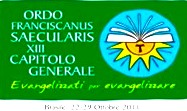
DECISION ON THE WEARING OF THE “HABIT” IN THE OFS
The General Chapter makes the following
DECISION
The practice of wearing a “habit” is not in conformity with the Rule and General Constitutions of the OFS, as already established.
As a practical interpretation (cf. Art. 5.2 GGCC) of Article 43 of the General Constitutions, the Chapter emphasizes and insists that the distinctive sign of membership in the Order is the “Tau or other Franciscan symbol”. (GGCC 43). A “Franciscan symbol” is a small and simple insignia that is worn on the person (for example, a San Damiano cross).
However, an OFS National Fraternity may determine in its National Statutes that the wearing a “uniform” is an acceptable sign of recognition for Secular Franciscans of their own country, providing that the following mandatory criteria is followed:
a) the uniform does not replace the TAU or the Franciscan symbol selected by the National Fraternity
b) the nature of the uniform is to be specified in the National Statutes, including a detailed description (preferably graphical) and be of a style that respects the secularity of the members of the Order;
c) the style of the uniform should not look like the habit worn by member of a religious Order, so as to avoid bringing confusion between religious and seculars;
d) the occasions during which this uniform may be worn must be precisely indicated and specifically excludes its use during the rites of admission and/or profession.
The Chapter states that the decision replaces all previous documents in this regard, and becomes in effect now and for the future.
São Paolo, October 29, 2011
![]()

Encarnación del Pozo, OFS
General Minister
Diane F. Menditto, OFS
Vice Minister, National Fraternity, Secular Franciscan Order USA
Listen – Discern – Go Forth National Theme 2022-2025
*************************
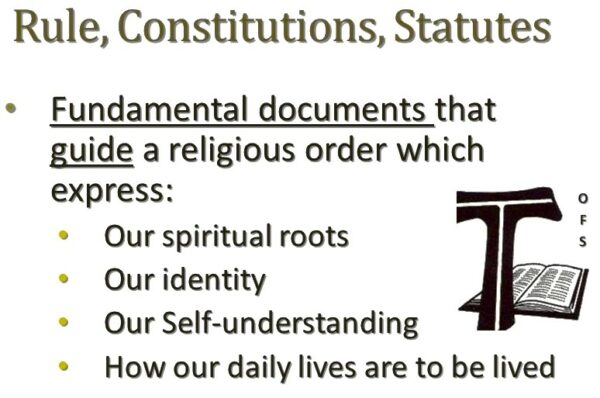
Formation Friday June 14, 2024
Please share with your local fraternity
Documents of the Secular Franciscan Order
We have recently completed a series of Formation Fridays delineating each section of our Rule and providing commentary. We hope that each local fraternity has been encouraged to use those posts as a basis for ongoing formation on the Rule. It is also very important for each member (especially those serving on Councils) to become familiar with our General Constitutions and National Statutes since they help us to live out the Rule and to navigate most (or many) of the situations (both good and challenging) we encounter in fraternity life.
+ We have one Rule with a Prologue and 26 articles (Calling the articles “rules” implies a restrictive list rather than a way of life!)
Religious orders and institutes follow the charism of their founders. Generally, the founder writes or inspires the Rule of a particular community. The intention of a Rule is that the members of the order will have the inspiration of the founder to live by when he or she is no longer among them. The Rules of religious communities, although requiring approval by the Holy See, are general, most of the time without the specifics that will be necessary to govern a religious community and to live out the Rule authentically.
“The word ‘rule’ (Latin: regula, Greek: kanon) literally means a standard by which something can be tested. In the case of religious or secular institutes it establishes the spiritual foundation and identity of the community. It is the norm which all the other documentation of the institutes – constitutions, statutes, etc. – are measured. Approbation of rules for religious and secular institutes in the Church is reserved to the Holy See.” (See Michael Higgins, TOR, “Importance of Familiarization with the Documents of the Secular Franciscan Order.”)
A Rule is not a list or set of “rules” but the outline of a plan or way of life to help us live out the vision of the founder. In our case the vision for Secular Franciscans is put forth in a Prologue and 26 articles.
+We have General Constitutions which help us to carry out the Rule and govern the Order.
The Constitutions (also approved by the Holy See) are much more specific about the way the Rule should be interpreted and carried out. Here is an explanation by Fr. Lester Bach, OFM Cap., in the Franciscan Journey p. 106:
“The SFO (OFS) Constitutions contain comments on the Rule and insights for understanding the Rule. The Constitutions point out structures to help the Rule come alive in community life. The Constitutions spell out things like canonical procedures and structural developments. They deal with issues of lukewarm members and the role of the servant leaders of fraternity life (councils). The Constitutions present ways and means to deal with issues that may arise in fraternity life.”
Ministers and Councils should take note that before difficult decisions are made about fraternity life or about individual members, the Constitutions should be consulted. Much confusion can be avoided if this suggestion is always followed.
+National Statutes are developed by the National Fraternity to aid in governing all levels of the National Fraternity.
Article 29.3 of the General Constitutions calls for each national fraternity to develop its own statutes. “National Statutes should indicate the criteria for the organization of the OFS in the nation. The application of these criteria is left to the prudent judgement of those responsible for the Fraternities concerned and of the National Council.” National Statutes are not approved by the Holy See but must be approved by the council of the higher level. (CIOFS) The statutes of a particular country take into account the culture and customs of that country and add further particulars to what is laid out in the Constitutions. Statutes may be more restrictive than the Constitutions, but not less restrictive.
Every member should have access to the Rule, Constitutions, and Statutes. You will find our documents in their latest translations on our national website and on the CIOFS website. (Links below)
OFS Governing Documents and Official CIOFS Documents of the OFS
Questions for discussion or to answer in your journal:
+When was the last time you read our Rule and Constitutions? Please take some time to read them: Choose two or three areas to focus on in the next week. Continue this practice until you have read both documents completely.
+List some of the items that stood out to you as you were completing the above “labor of love.”
+How does your fraternity use the Rule and Constitutions for ongoing formation? Make a list of ideas for their use and submit it to your local council or fraternity formation team.
+Resolve to pray one article of the Rule each day!
Diane F. Menditto, OFS
Vice Minister, National Fraternity, Secular Franciscan Order USA
Listen – Discern – Go Forth National Theme 2022-2025
*************************
May 31, 2024 Friday Formation
At the time of our Baptism, we are called to be Priest, Prophet, and King along with our Lord Jesus Christ. This applies to every Catholic. We find the following in the Catechism of the Catholic Church:
Baptism makes us members of the Body of Christ. … “to be a holy priesthood” (1 Peter 2:5). By Baptism they share in the priesthood of Christ, in his prophetic and royal mission. They are “a chosen race, a royal priesthood, a holy nation, God’s own people …” (1 Peter 2:9). Baptism gives a share in the common priesthood of all believers (CCC, 1267, 1268).
Christ, high priest and unique mediator, has made of the Church “a kingdom, priests for his God and Father” (Revelation 1:6, see 5:9–10; 1 Peter 2:5,9). … The faithful exercise their baptismal priesthood through their participation, each according to his own vocation, in Christ’s mission as priest, prophet, and king (CCC, 1546).
“Profession in the Secular Franciscan Order reinforces our Baptismal promises. Our call to the Franciscan way of life points out the path for us to follow. This baptismal source of unity reaches beyond the boundaries of states, languages, cultures, and social classes. We are one in Christ. We are called to spread the Gospel and influence the world and the Church with the Gospel of Jesus flavored by our Franciscan spirit.” (Franciscan Journey p.48)
How is our call to be Priest, Prophet, and King made clear by our Rule?
+Priest: the link between God and human beings; harmony; peacemaking; prayer and sacramental life; relationship with Christ; bring this to the larger community through example.
We find this in numerous places in our Rule and Constitutions–Rule : Article 5; Article 8; Article 10; Article 11; Article 12; Article 19 ; Constitutions : Article 2.1 ; Article 3.2, 3.3 ; Article 8 ; Article 10 ; Article 11 ; Article 12.3 ; Article 13 ; Article 14
+Prophet: speaks the truth about God in words, actions, and personal example; and speaks of the signs of the times—through a Catholic (and in our case Franciscan lens); We are responsible for our own ongoing formation as Catholics and Franciscans; Scripture, the writings of Francis, Clare, and Bonaventure; the writings of the great Catholic theologians; we also have the opportunity to learn within our fraternities.
Rule and Constitutions–Rule: Article 4; Article 6; Article 13; Constitutions: Article 8.2; Article 9.2; Article 12 ; Article 15
+King: sees the talents of the community and directs those talents toward God; is willing to be a servant leader; understands that we are all called and encourages those in his or her care to fulfill their vocation.
Rule and Constitutions–Rule : Article 15; Article 16; Article 17; Article 18; Article 21 ; Article 24 ; Constitutions : Article 1 5; Articles 17-27
As you can see, our Rule and Constitutions reaffirm and strengthen our call to fulfill the role of Priest, Prophet, and King in our daily lives as Secular Franciscans. Please read the articles mentioned above (you may be able to find even more that apply.) After reading the articles (available here in English: Ordo Franciscanus Saecularis Consilium Internationale OFS (CIOFS) | Secular Franciscan Order, answer the following in your journal or with a prayer partner:
+How do you live out the call to be “Priest, Prophet, and King?”
+In what ways does our Rule help us to move in the right direction?
+Which parts of this call are most comfortable for you? Which do you find most challenging?
Diane F. Menditto, OFS
Vice Minister, National Fraternity, Secular Franciscan Order USA
Listen – Discern – Go Forth National Theme 2022-2025
*************************
Formation Friday, May 24, 2024
Please share with your local fraternity.
Rule of the Secular Franciscan Order
Chapter 3 Articles 25-26
Article 25: Regarding expenses necessary for the life of the fraternity and the needs of worship, of the apostolate, and of charity, all the brothers and sisters should offer a contribution according to their means. Local fraternities should contribute toward the expenses of the higher fraternity councils.44
Article 26: As a concrete sign of communion and co-responsibility, the councils on various levels, in keeping with the constitutions, shall ask for suitable and well-prepared religious for spiritual assistance. They should make this request to the superiors of the four religious Franciscan families, to whom the Secular Fraternity has been united for centuries.
To promote fidelity to the charism as well as observance of the Rule and to receive greater support in the life of the fraternity, the minister or president, with the consent of the council, should take care to ask for a regular pastoral visit by the competent religious superiors as well as for a fraternal visit from those of the higher fraternities, according to the norm of the Constitutions.45
“And whoever observes these things let him be blessed in Heaven with the blessing of the Most High Father, and on earth with the blessing of His Beloved Son with the Most Holy Spirit the Paraclete.”
(Blessing of St. Francis found in The Testament of Francis)
Commentary
Article 25: Paragraph 25 points out that the voluntary contributions of the members finance the fraternity’s spiritual and temporal needs and activities. The fraternity, according to its means and agreed-upon arrangements, also contributes to the support of regional, national, and international fraternities. This paragraph is a contemporary application of the traditional Secular Franciscan values outlined in the very first rule, that the members are responsible for taking care of their own in whatever way is necessary.
Article 26: Finally, the rule speaks of the spiritual assistance of the clergy; it also refers to the need of the friars to share fellowship and their Franciscan vocation with the Secular Franciscans (26). Three important implications are drawn from this paragraph: First of all, since the Secular Franciscan Order is basically a lay order, the laity themselves are primarily responsible for their own spiritual growth and have the duty to get the proper assistance to achieve this end. Secondly, spiritual assistants should have a good background in Franciscanism and Vatican Council II (especially the role of the laity) and a willingness to share their own vocation with the Secular Franciscan community. Thirdly, the official visit to the fraternity is given a dual role; spiritual growth is ensured through pastoral visitation by a Franciscan friar. Organizational development is provided by the fraternal visitation of a higher lay leader.
For discussion with a partner, in a group, or to comment on in your journal:
+Re-read articles 25-26 and the commentary:
— Sharing in expenses
· What do you understand the monthly contribution to the fraternity to be?
· How would you explain this to a new member?
—Spiritual Assistance
· Does your fraternity have a spiritual assistant? If yes, is it a friar, sister, or a Secular Franciscan? If no, who takes care of the spiritual needs of your fraternity?
· In what ways does your spiritual assistant serve your fraternity? If you know your regional spiritual assistant, tell how he serves your region.
Diane F. Menditto, OFS
Vice Minister, National Fraternity, Secular Franciscan Order USA
Listen – Discern – Go Forth National Theme 2022-2025
*************************
Formation Friday, May 17, 2024
Please share
The OFS-USA National Fraternity has recently published “From Gospel to Life,” the OFS Rule with Commentary. This occasional series highlights the Prologue (See November 17th and 24th) and the articles of the Rule, the commentary, and questions based on this publication for fraternity discussion. You may order “Gospel to Life” by clicking on the blue font.
Rule of the Secular Franciscan Order
Chapter 3 Article 23-24
Article 23: Requests for admission to the Secular Franciscan Order must be presented to the local fraternity, whose council decides upon the acceptance of new brothers and sisters.
Admission into the Order is gradually attained through a time of initiation, a period of formation of at least one year, and profession of the Rule. The entire community is engaged in this process of growth by its own manner of living. The age for profession and the distinctive Franciscan sign are regulated by the statutes. Profession by its nature is a permanent commitment.
Members who find themselves in particular difficulties should discuss their problems with the council in fraternal dialogue. Withdrawal or permanent dismissal from the Order, if necessary, is an act of the fraternity council according to the norm of the constitutions.
Article 24: To foster communion among members, the council should organize regular and frequent meetings of the community as well as meeting with other Franciscan groups, especially with youth groups. It should adopt appropriate means for growth in Franciscan and ecclesial life and encourage everyone to a life of fraternity. This communion continues with deceased brothers and sisters through prayer for them.
Commentary
Article 23: Paragraph 23 points out the importance of the initial orientation, with elements of both instruction and experience directed toward a lifetime commitment in the Order. It also stresses the role of the council in the development of community, especially for new members and for errant members. A number of important implications develop from this paragraph: It is the responsibility of primarily the council (not just the president or the spiritual assistant) to lead new members to commitment and to exercise charity in particular difficulties. The life of the whole fraternity contributes to the growth of the new members and consolidates it. Furthermore, profession is highlighted as a mature and enduring decision to participate as fully as possible in the Church’s life and mission according to the manner of Francis.
Article 24: Paragraph 24 discusses the means to express a strong and lasting fraternity spirit. The regular and frequent meeting (ordinarily once a month) is the way to build fraternity with prayer, education, apostolic activity, dialogue, and leisure. Continuing education in Franciscanism and Church life is also stressed as a means of spiritual growth and community building.
For discussion with a partner, in a group, or to comment on in your journal:
+Re-read articles 23-24 and the commentary:
— Initial formation and entry into the order
· For professed members: Describe your experience during your time of discernment and initial formation.
· For those who have been admitted to initial formation: What is your experience with your fraternity’s formation program? How are you being prepared for fraternity life?
· What role has your fraternity played in helping you to discern or to maintain your vocation?
—The responsibility of the local fraternity
· Does your fraternity meet regularly in person?
· Describe a typical gathering. How does it help to strengthen you as a Secular Franciscan?
Diane F. Menditto, OFS
Vice Minister, National Fraternity, Secular Franciscan Order USA
Listen – Discern – Go Forth National Theme 2022-2025
*************************
Formation Friday, April 26, 2024
Justice, Peace, and the Integrity of Creation #3 (Our series on the Rule will continue next month.)
Thank you to Joe Makely, OFS, National JPIC Animator for contributing this piece.
What does it mean that our Rule is influenced by Vatican II? It means we experienced a renewal.
At the close of Vatican II, the friars led the tertiaries to follow long sought after reforms. Their guidelines included the major documents of Vatican II about the laity. It was a very exciting time for the Third Order, when we finally gained our autonomy and an affirmation of the lay charism. One of the luminaries was Fr. Philip Marquard, OFM, who wrote in 1970: “Any leader [of the Third Order] must first of all have a thorough understanding of the documents of Vatican II. They must be read and reread so that one understands their true direction. The Church is not looking for mere adaptation, but renewal. There was nothing Pope John stressed more strongly than this point.” (See note 1)
The process of renewal included a very serious study of the early penitents, as described by Mrs. Pamona Pefanis, a Third Order participant from Canada who attended the gatherings in Assisi: “The strongest impression I received from the entire historians’ congress was that the 13th Century Penitenti were deeply involved in the social and political problems of their period, and that we must emerge from our cocoon of pious devotions and embroil ourselves in the problems of our day, bringing to them the same evangelical fervor that motivated the 13th Century members of our order.” (See note 2)
So that’s a partial picture of how we got those lively apostolic phrases in our Rule, like “promoting justice [with] courageous initiatives” and how we eventually got the Apostolic Commissions, which became (in accord with the 1st Order) Justice, Peace and the Integrity of Creation. The “how” of JPIC, our emphasis on loving dialogue and obedience, is central to what we do and that goes back to Francis himself, who said of his friars: “… they should be gentle, peaceful, and unassuming, courteous and humble, speaking respectfully to everyone, as is expected of them.” (See note 3) It did not mean departure from the vision of the founder, but was a call to restudy, reembrace that vision and adapt it to the needs of the current generation.
For discussion or to answer in your journal:
Question 1. In what ways is my fraternity bringing evangelical fervor to the problems of society?
Question 2. Have I read the documents of Vatican II myself, more than once? After reading them again, write down any questions you have and see if your group (or an outside source) will answer them for you.
Question 3. Does my region/fraternity have a JPIC animator? Discuss with the group who might be gifted in this area.
Challenge: Consider initiating a fraternity formation or workshop based on Article 14.1 of the General Constitutions: “They should commit themselves to a faith-inspired reflection on the Church, its mission in today’s world and the role of the Franciscan laity within it. They should take up the challenges and accept the responsibilities that this reflection will lead them to discover.” (See note 4)
Notes
1-Franciscan Herald and Forum, February 1970, 53,54.
2-A History of the Secular Franciscan Order in the United States, Volume IIA, p 409
3-ST. Francis of Assisi, Rule of 1223, Chapter 3, Omnibus of Sources, P.60
4-OFS General Constitutions, Article 14.1
Diane F. Menditto, OFS
Vice Minister, National Fraternity, Secular Franciscan Order USA
Listen – Discern – Go Forth National Theme 2022-2025
*************************
Formation Friday April 19, 2024
Justice, Peace, and the Integrity of Creation #2 (We will return to the series on the Rule in May.)
Thank you to Joe Makely, OFS, National JPIC Animator for contributing this piece.
Following the Gospel: Footnotes to Apostolic Creativity
Our Pauline Rule has 45 references, most of which point to one of three sources:
- The early Franciscan documents (16)
- Canon Law (6)
- The papal writings of St. Paul VI and Vatican II (17)
The emphasis on these sources in the Rule shows that our way of life is:
- Authentically Franciscan, anchored in the early writings and prior rules of the Order.
- Resolutely Catholic, conformed to Canon Law
- Apostolic in the spirit of Vatican II
Secular Franciscans carry the spirit of the Vatican II renewal. We are Vatican II people. It’s not about liturgical controversies or communion in the hand. It’s about the vision for lay Catholics to go forth and work to improve conditions in the temporal world. The Order, like the Church, bears eternal truths of salvation, but must also be alive to current conditions, and bring “apostolic creativity” (See note 1) and “a sense of the provisional” (See note 2) to truly serve humanity in this generation. The JPIC Animators’ handbook says, “While each fraternity is not required to establish a common apostolate, many benefits accrue to those who can.” It advises a local approach: “Identify the greatest need in your area, where the least is being done, where you can make an impact.” (See note 3)
For discussion in fraternity or to comment on in your journal:
Question 1. When my fraternity discusses apostolates, have we asked ourselves lately what our community needs? (See challenge below.)
Question 2. In what places, outside of our usual meeting place, could a visitor see our fraternity, or some of its members, in action?
Question 3. Have we included Peace, Justice, and Care for Creation in our apostolate activity? (If yes, give examples. If no, see challenge below.)
Challenge: Suggest to the fraternity council that they initiate a formal needs assessment in developing ideas for apostolates. Include a reflection on injustices, peacemaking, human dignity, care for creation, etc.
Notes:
1-OFS Rule P.6, (ref. St Paul VI.)
2-Fr. Philip Marquard, OFM, Franciscan Herald and Forum, 1968
3-Handbook for Animators of Justice, Peace and Integrity of Creation (JPIC.) p.26
Diane F. Menditto, OFS
Vice Minister, National Fraternity, Secular Franciscan Order USA
Listen – Discern – Go Forth National Theme 2022-2025
*************************
Formation Friday – April 12, 2024
(We will return to the series on the Rule in May)
Thank you to Joe Makely, OFS, National JPIC Animator for contributing this piece.
The members of our order have a special call as lay people in the Church. We are to live the Gospel, each in our own way, but within the boundaries of our Rule and informed by Catholic Social Teaching, sometimes referred to as CST, in which the Church breaks open the Gospels for the world in each age and generation. We have duties and obligations that require us to have familiarity with at least some parts of the Church’s teaching on public life. (Also see Formation Friday of March 1, 2024)
GOSPEL>>>>CATHOLIC SOCIAL TEACHING>>>RULE
In the JPIC handbook (available on our website), a triangle is used to show the connection between the Gospels, The Rule and CST. The Rule and the teaching documents of the Church are Christ-centered. They tell us how to follow the Gospels.
For example, our Rule (See Article 15) is influenced by St. Paul VI’s Decree on The Apostolate of The Laity, APOSTOLICAM ACTUOSITATEM, specifically a passage in section 14 of that document:
“In loyalty to their country and in faithful fulfillment of their civic obligations, Catholics should feel themselves obliged to promote the true common good. Thus, they should make the weight of their opinion felt in order that the civil authority may act with justice and that legislation may conform to moral precepts and the common good.”
For discussion in fraternity, with a partner, or to comment on in your journal:
Question 1. If I shared my views on a public issue, could I explain how they are Catholic? (Give an example.)
Question 2. Would my Secular Franciscan brothers and sisters say that I work courageously for justice? (How might they describe my efforts?)
Question 3. Would a spouse or close friend say that I care whether my views on a public policy are consistent with Catholic teaching? (Give an example.)
Challenge: Prayerfully Reflect on the passage above, and Article 15 of our rule, which references it. Set a goal to educate yourself about an issue you have not had time to be involved with and consider taking a courageous stand on the side of justice. (If you are sharing in fraternity, report back to the group.)
Diane F. Menditto, OFS
Vice Minister, National Fraternity, Secular Franciscan Order USA
Listen – Discern – Go Forth National Theme 2022-2025
*************************
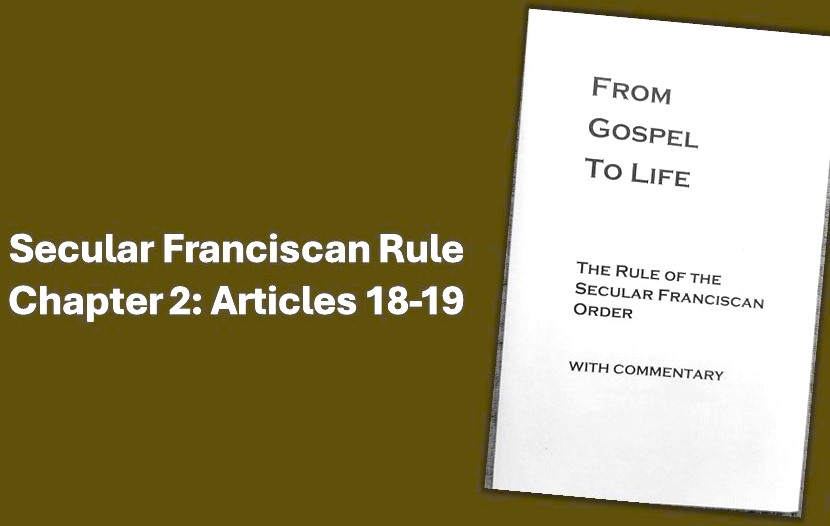
Formation Friday – April 5, 2024
The OFS-USA National Fraternity has recently published “From Gospel to Life,” the OFS Rule with Commentary. This occasional series highlights the Prologue (See November 17th and 24th) and the articles of the Rule, the commentary, and questions based on this publication for fraternity discussion. You may order “Gospel to Life” by clicking on the blue font.
Rule of the Secular Franciscan Order
Chapter 2 Articles 18-19
Article 18: Moreover, they should respect all creatures, animate and inanimate, which “bear the imprint of the Most High,”30 and they should strive to move from the temptation of exploiting creation to the Franciscan concept of universal kinship.
Article 19: Mindful that they are bearers of peace which must be built up unceasingly, they should seek out ways of unity and fraternal harmony through dialogue, trusting in the presence of the divine seed in everyone and in the transforming power of love and pardon.31
Messengers of perfect joy in every circumstance, they should strive to bring joy and hope to others.32
Since they are immersed in the resurrection of Christ, which gives true meaning to Sister Death, let them serenely tend toward the ultimate encounter with the Father.33
Commentary
Article 18: Ecology (the relationship of creatures with themselves, their environment, and their God) is a fourth expression of the Franciscan apostolate (18). Francis saw all creation—the sun and moon, the weather and water, fire and earth, forgiving people and death itself—as symbols of the union between God and his people. Hence, all creation has a sacred quality and enjoys a oneness with people in the history of salvation. Following the example of Francis, the Secular Franciscans express a profound respect for all creation and use it for its intended God-given purpose. Furthermore, they ennoble nature and technology and build a community conscience toward using natural resources. This ministry toward creation will stem the selfish tide of abuse and waste and exploitation in this world.
Article 19: A particularly Franciscan ministry is peace-making (19). Peace grows out of the search for personal integrity and harmony with others and the discovery of God’s presence everywhere. It is built up by affirming oneself, seeing others as revealers of God’s love, taking a positive approach to solutions, and communicating constantly with the Lord. It is putting aside all thought of violence and embracing a largeness of heart. The result of peace is joy and hope. A special application of this ministry of peace-making is preparation for death, at which time a person arrives at that ultimate encounter with God and an eternal peace in his presence that fulfill the earthly quest for peace.
For discussion with a partner, in a group, or to comment on in your journal:
+Re-read article 18 and the commentary:
–Caring for creation
- How is your relationship with the environment?
- Please describe what “universal kinship” with all of creation means to you.
+Re-read article 19 and the commentary:
—Peacemakers and messengers of “perfect joy”
- Please give some examples of how you have served as a peacemaker.
- Who is the best Franciscan peacemaker you know? What example do they set for others?
- What are some ways that we, individually and as a fraternity, can bring “joy and hope” to others?
Diane F. Menditto, OFS
Vice Minister, National Fraternity, Secular Franciscan Order USA
Listen – Discern – Go Forth National Theme 2022-2025
*************************
Formation Friday – March 29, 2024
Since today is Good Friday, it is an extra special time to follow Saint Clare’s Gazing on the cross of our Lord Jesus Christ as found in her second letter to Saint Agnes of Prague.
19“Look upon Him Who became contemptible for you,
and follow Him, making yourself contemptible in this world
for Him.
20Most noble Queen,
gaze,
consider,
contemplate
desiring to imitate Your Spouse,
[Who] though more beautiful than the children of men became, for your salvation, the lowest of men, was despised, struck, scourged untold times throughout His entire body, and then died amid the suffering of the Cross.
21If you suffer with Him, you will reign with Him.
weeping with Him, you will rejoice with Him;
dying on the cross of tribulation with Him,
you will possess heavenly mansions with Him
among the splendor of the saints
22and in the Book of Life your name will be called glorious among
the peoples.”
The Lady Clare of Assisi: Early Documents, CA:ED,49: 19-22
- GAZE: Take some time to gaze at Jesus on the cross.
- CONSIDER: Put yourself there with Jesus. What was he thinking, feeling? What did he see? Hear?
- CONTEMPLATE: Inspired by the Holy Spirit, how are you transformed, made different, by this experience?
- IMITATE: What do you resolve to do in response to this transformation?
For Discussion or to comment on in your journal.
- As you use St. Clare’s “gaze, consider, contemplate and imitate” describe its impact at this moment on you.
- In what ways have you been drawn to Imitate the Crucified prior to this? In what ways has this transformed your life?
- How do you see Christ in your “mirror?”
(See) Fourth Letter to Agnes of Prague CA:ED, 55: 15-32 - Personal Challenge: As we enter the Easter season, how can you be a “mirror of Christ?”
*************************
Formation Friday March 22, 2024
The OFS-USA National Fraternity has recently published “From Gospel to Life,” the OFS Rule with Commentary. This occasional series highlights the Prologue (See November 17th and 24th) and the articles of the Rule, the commentary, and questions based on this publication for fraternity discussion. You may order “Gospel to Life” by clicking on the blue font.
Rule of the Secular Franciscan Order
Chapter 2 Articles 15, 16, and 17
Article 15: Let them individually and collectively be in the forefront in promoting justice by the testimony of their human lives and their courageous initiatives. Especially in the field of public life, they should make definite choices in harmony with their faith.26
Article 16: Let them esteem work both as a gift and as a sharing in the creation, redemption, and service of the human community.27
Article 17: In their family they should cultivate the Franciscan spirit of peace, fidelity, and respect for life, striving to make of it a sign of a world already renewed in Christ. 28
By living the grace of matrimony, husbands and wives in particular should bear witness in the world to the love of Christ for his Church. They should joyfully accompany their children on their human and spiritual journey by providing a simple and open Christian education and being attentive to the vocation of each child.29
Commentary
Article 15: The second grouping (15–19) of the ways Secular Franciscans spread the gospel and witness to Jesus Christ deals with concrete action. Not only does gospel living take place in a special lifestyle, but it also expresses itself in a specific mode of apostolic activity or ministry.
The first particular aspect of the Secular Franciscans’ evangelical action is social justice (15), both on the individual level and on the level of community participation. They must show justice themselves and motivate justice in others, not just in their private lives but also in the public forum of politics, business, economics, and the like. This mandate for advancing social justice as an organized group overturns previous prohibitions against a public common expression of rights when it is carried out as a means of demonstrating the convictions of faith.
Article 16: Another concrete means of proclaiming the Good News of Jesus Christ is expressed in attitudes toward work (16). Through working, the Secular Franciscans discover their workaday world as the arena of their salvation and at the same time exemplify the saving Christ to others. So, human labor is a blessing, both received and bestowed. By working, a person shares in the creative power of the Father, renews the face of the earth along with the Son, and brings the love of the Holy Spirit to the human community. Such an attitude toward work can reshape one’s own and others’ values and actions regarding labor and management, business and economics, living wages and welfare, proper use of one’s own talents, and the resources of others.
Article 17: A third apostolic expression of gospel living concerns family life (17). The family is the God-given basic unit of human society and a miniature of the total world already redeemed by Christ. Hence, Franciscan-oriented families present a renewed world of love and dignity, are an example of Christ’s love for his Church, and reflect the light of Christ in affront to the darkness of today’s shattered families and prevailing godless values. Husbands and wives, then, have a special ministry in the Church to the world. This ministry is exercised in two ways: by leading and educating their children to experience Christ and by witnessing to others that God is present in the family. This Christian family living is one of the most particular expressions of the laity’s life and mission in the Church.
For discussion with a partner, in a group, or to comment on in your journal:
+Re-read article 15 and the commentary:
–Promoting justice; courageous initiatives
- How does your fraternity promote justice?
- Does promoting justice always require courageous initiatives?
+Re-read article 16 and the commentary
—The significance of work in our lives as lay persons…
- How is the work that you do important to your life as a Secular Franciscan?
- How does your work help to evangelize others?
+Re-read article 17 and the commentary
—As lay persons, we live in the “community of our families.”
- How would you say that your family is a Franciscan family? (See commentary)
- How does your family reflect the light of Christ?
*************************
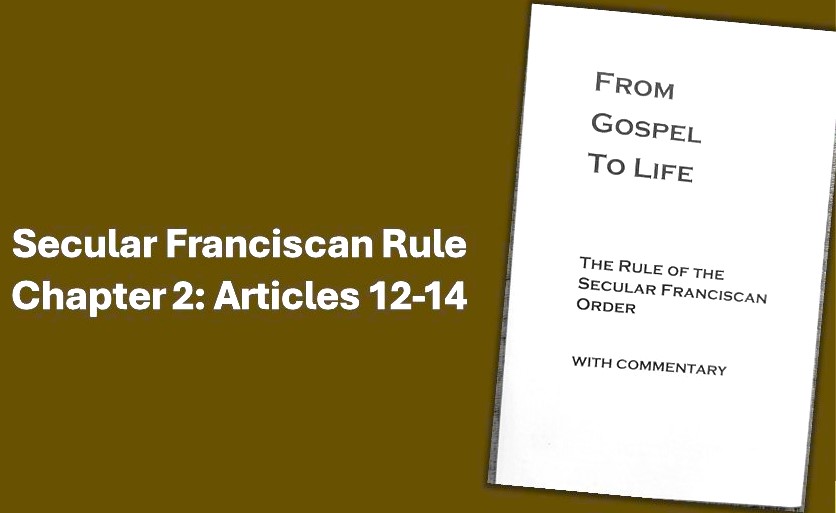
Formation Friday March 15, 2024
The OFS-USA National Fraternity has recently published “From Gospel to Life,” the OFS Rule with Commentary. This occasional series highlights the Prologue (See November 17th and 24th) and the articles of the Rule, the commentary, and questions based on this publication for fraternity discussion. You may order “Gospel to Life” by clicking on the blue font.
Rule of the Secular Franciscan Order
Chapter 2 Articles 12, 13, and 14
Article 12: Witnessing to the good yet to come and obliged to acquire purity of heart because of the vocation they have embraced, they should set themselves free to love God and their brothers and sisters.21
Article 13: As the Father sees in every person the features of his Son, the firstborn of many brothers and sisters,22 so the Secular Franciscans with a gentle and courteous spirit accept all people as a gift of the Lord and an image of Christ.23
A sense of community will make them joyful and ready to place themselves on an equal basis with all people, especially with the lowly for whom they shall strive to create conditions of life worthy of people redeemed by Christ.24
Article 14: Secular Franciscans, together with all people of good will, are called to build a more fraternal and evangelical world so that the kingdom of God may be brought about more effectively. Mindful that anyone “who follows Christ, the perfect man, becomes more of a man himself,” let them exercise their responsibilities competently in the Christian spirit of service.25
Commentary
Article 12: The result of simple living in gospel poverty is freedom to seek and share the great treasure of the kingdom: loving God and neighbor (12).
Article 13: Hand in hand with simple living is coming to recognize that in Christ all are equally brothers and sisters (13). There is no room for prejudice or exclusiveness in the Franciscan way of life. In fact, the sense of community and the will toward community compel the Secular Franciscans to discover Christ in everyone, especially the lowly and poor and disadvantaged.
Article 14: The natural consequence to simple living and a sense of community is selfless service (14). Secular Franciscans expend themselves by using their special talents, competence, and responsibility. Thus, they bring to others the experience of God and the hope for achieving their full humanity.
For discussion with a partner, in a group, or to comment on in your journal:
+Re-read article 12 and the commentary:
–What do you think “set themselves free means?”
- How do you set yourself free to love God?
- How do you set yourself free to serve others?
- How can you simplify your life so that living the gospel becomes possible?
+Re-read article 13 and the commentary
—How do you see Christ in others?
- What is challenging about accepting everyone as a “gift of the Lord and an image of Christ?”
- How do our relationships with others affect fraternity and family life?
+Re-read article 14 and the commentary
—What does carrying out our responsibilities effectively mean to you?
- How do you use your talents in service to others?
- How do you set priorities in your service to others?
*************************
Formation Friday March 8, 2024
(En español abajo)
The OFS-USA National Fraternity has recently published “From Gospel to Life,” the OFS Rule with Commentary. This occasional series highlights the Prologue (See November 17th and 24th) and the articles of the Rule, the commentary, and questions based on this publication for fraternity discussion. Click on the blue font to order “Gospel to Life”.
Rule of the Secular Franciscan Order
Chapter 2 Articles 10-11
Article 10: Uniting themselves to the redemptive obedience of Jesus, who placed his will into the Father’s hands, let them faithfully fulfill the duties proper to their various circumstances of life.17 Let them also follow the poor and crucified Christ, witness to him even in difficulties and persecutions.18
Article 11: Trusting in the Father, Christ chose for himself and his mother a poor and humble life,19 even though he valued created things attentively and lovingly. Let the Secular Franciscans seek a proper spirit of detachment from temporal goods by simplifying their own material needs. Let them be mindful that according to the gospel they are stewards of the goods received for the benefit of God’s children.
Thus, in the spirit of “the Beatitudes”, and as pilgrims and strangers on their way to the home of the Father, they should strive to purify their hearts from every tendency and yearning for possession and power.20
Commentary
Article 10: The first phase of evangelizing shows how the Secular Franciscans live in this world (10–12). Those who go “from gospel to life” have simple living (10–12), an experience of togetherness (13), and selfless service (14) as qualities of everyday living.
Simple living begins with the choice to unite with Christ so intensely that one is willing to share even his passion: the burdens of hardship and pain within oneself or from outside sources.
Article 11: Simple living also takes shape (11) by reducing material needs, by curbing a thirst for possessions and the domineering power that comes from ownership, and by using all God’s gifts in a spirit of generosity, justice, and moderation. Gospel poverty for Secular Franciscans, then consists in acquiring possessions justly, keeping needs to a minimum, and using what they have as custodians for the generous benefit of others. In this way they live for the kingdom of God and not for this world, according to the charter for happiness given in the “Beatitudes.”
For discussion with a partner, in a group, or to comment on in your journal:
+Re-read article 10 and the commentary:
–What are the “circumstances” of your life?
- How does the fulfillment of your responsibilities reflect your relationship with Jesus?
- Give examples of how you “go from gospel to life and life to the gospel.”
- How can you simplify your life so that living the gospel becomes possible?
—How does fulfilling your duties as a layperson help to evangelize others?
+Re-read article 11 and the commentary
—Reflect on “gospel poverty.”
- How can you live in moderation? (Not only possessions but attitudes and relationships with others.)
- Explain what you think living as “pilgrims and strangers” means. Can you think of some concrete examples?
- What do you think the “spirit of the Beatitudes” means?
*************************
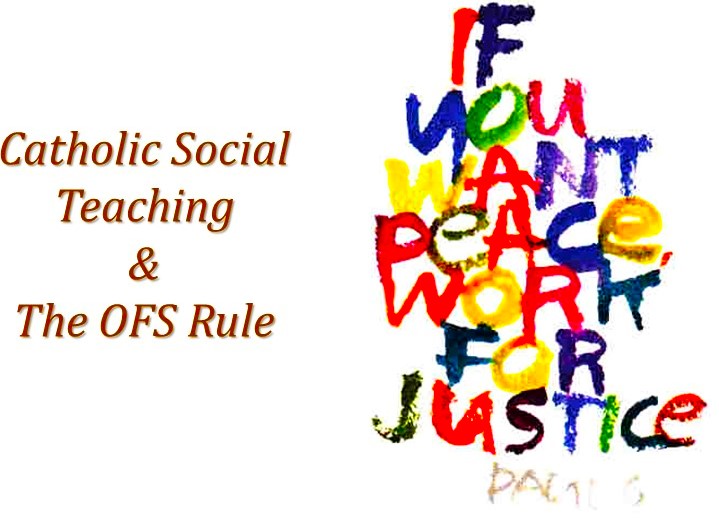
*************************
Formation Friday, March 1, 2024
Catholic Social Teaching—From St. Francis to the Secular Franciscan Rule
In the Legend of the Three Companions, we read: He [Francis] used to tell them: “As you announce peace with your mouth, make sure that greater peace is in your hearts. Let no one be provoked to anger or scandal through you, but may everyone be drawn to peace, kindness, and harmony through your gentleness. For we have been called to this: to heal the wounded, bind up the broken, and recall the erring. In fact, many who seem to us to be members of the devil will yet be disciples of Christ.”
The Founder p. 102
The Catholic Church has given us the Seven Themes of Catholic Social Teaching. The Secular Franciscan Rule of 1978 helps us to make them part of our daily lives. Lent is the perfect time for us to reflect on this comparison.
1- CST: LIFE AND DIGNITY OF THE HUMAN PERSON—The Catholic Church proclaims that human life is sacred and that the dignity of the human person is the foundation of a moral vision for society.
+OFS RULE: Articles 15 and 17:Promote justice and peace and respect for life
2- CST: CALL TO FAMILY, COMMUNITY, AND PARTICIPATION—We are both sacred and social; part of society.
+OFS RULE: Articles 13 and 17: A sense of community—ready to place themselves on an equal basis with all people; Cultivate a spirit of peace, fidelity, and respect for life in the family. Husbands and wives should bear witness in the world of the love of Christ for his Church.
3- CST: RIGHTS AND RESPONSIBILITIES—The Catholic tradition teaches that human dignity can be protected and a healthy community can be achieved only if human rights are protected, and responsibilities are met.
+OFS RULE: Article 14: [We] are called to build a more fraternal and evangelical world; exercise our responsibilities competently.
4- CST: OPTION FOR THE POOR AND VULNERABLE—How are the most vulnerable faring?
+OFS RULE: Articles 13 and 15: Accept all people as a gift of the Lord. Place ourselves on an equal basis with the lowly…; Be in the forefront of promoting justice…
5- CST: THE DIGNITY OF WORK AND THE RIGHTS OF WORKERS—The economy should serve people not vice versa.
+OFS RULE: Article 16: Let them esteem work both as a gift and as a sharing in the creation, redemption, and service of the human community.
6- CST: SOLIDARITY—We are one human family.
+OFS RULE: Articles 13 and 19: …place themselves on an equal basis with all people, especially the lowly. …trusting in the presence of the divine seed in everyone and in the transforming power of love and pardon.
7- CST: CARE FOR GOD’S CREATION—We show respect for the Creator by taking care of His creation.
+OFS RULE: Article 18: They should respect all creatures which bear the imprint of the Most High,…
Seven Themes of Catholic Social Teaching Handout
For discussion or to answer in your journal
+How does Catholic Social Teaching (CST) apply to us as Secular Franciscans? Give “daily life” examples.
+In what ways do you live out the articles of the Rule mentioned above?
+How can our fraternities live out Catholic Social Teaching through our apostolates? Give examples of what you are already doing? What more can you do?
*************************
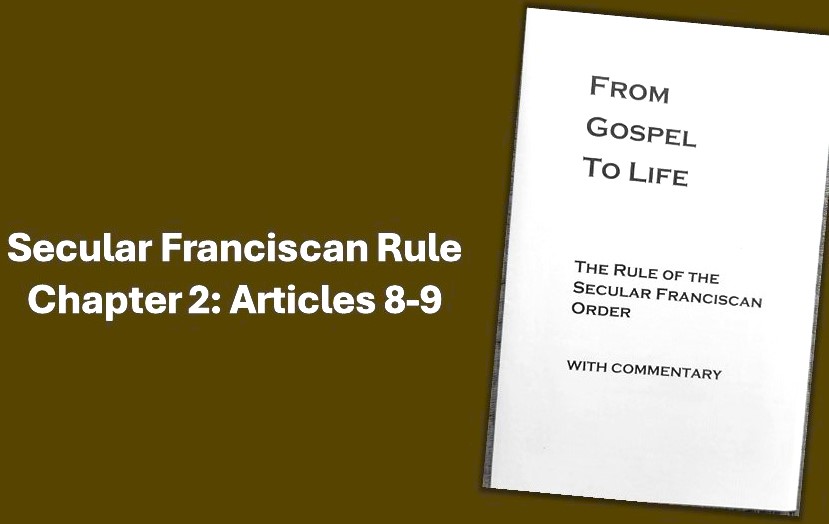
Formation Friday February 23, 2024
(En español abajo)
The OFS-USA National Fraternity has recently published “From Gospel to Life,” the OFS Rule with Commentary. This occasional series highlights the Prologue (See November 17th and 24th) and the articles of the Rule, the commentary, and questions based on this publication for fraternity discussion. You may order “Gospel to Life” at this link: https://www.secularfranciscansusa.org/wp-content/uploads/Order-Form_October_2023rev.pdf
Rule of the Secular Franciscan Order
Chapter 2 Articles 8-9
Article 8: As Jesus was the true worshipper of the Father, so let prayer and contemplation be the soul of all they are and do.
Let them participate in the sacramental life of the Church, above all the Eucharist. Let them join in liturgical prayer in one of the forms proposed by the Church, reliving the mysteries of the life of Christ.
Article 9: The Virgin Mary, humble servant of the Lord, was open to his every word and call. She was embraced by Francis with indescribable love and declared the protectress and advocate of his family. The Secular Franciscans should express their ardent love for her by imitating her complete self-giving and by praying earnestly and confidently.
Commentary
Article 8: The [second] precondition is to make worship of the Father as central in our own lives as it was in Christ’s. The Secular Franciscan, then, communicates and unites with the Lord through the sacraments (again, especially the Eucharist), the liturgy of the hours, contemplation, and any other expression of prayer.
Article 9: The description of the way of life now moves to the manner of proclaiming the gospel every day by lifestyle (10–14) and ministry or apostolic activity (15–19).
First of all, Mary’s self-giving and prayer are set up as the primary example of gospel living. Devotion to her has always been a hallmark of the Franciscan calling, both as a way of expressing love for her and as an important way of finding Jesus himself.
For discussion with a partner, in a group, or to comment on in your journal:
+Re-read article 8 and the commentary:
–Give examples of how your prayer life follows what is asked for in Article 8
- Do you spend time in silent prayer and meditation? How does this practice affect your daily life?
- Do you pray the Liturgy of the Hours each day? (Perhaps at least one of the hours?) Why is this important for us as Secular Franciscans? Why do you think we are asked to do this?
- In what other ways do you pray? How can you strengthen your prayer life?
—How important is the Eucharist to you?
- Do you receive communion frequently?
- Do you participate in Adoration? What effect does this have on your prayer life?
- Do you receive the Sacrament of Reconciliation often? How does this sacrament help your “daily conversion.”
+Re-read article 9 and the commentary
—What is your relationship with the Blessed Mother?
- Why has devotion to Mary always been important to Franciscans?
- Describe how Mary’s example can have an influence on our prayer lives?
*************************
Formation Friday February 16, 2024
The OFS-USA National Fraternity has recently published “From Gospel to Life,” the OFS Rule with Commentary. This occasional series highlights the Prologue (See November 17th and 24th) and the articles of the Rule, the commentary, and questions based on this publication for fraternity discussion. You may order “Gospel to Life” at this link: https://www.secularfranciscansusa.org/wp-content/uploads/Order-Form_October_2023rev.pdf
Rule of the Secular Franciscan Order
Chapter 2 Articles 6-7
Article 6: They have been made living members of the Church by being buried and raised with Christ in baptism; they have been united more intimately with the Church by profession. Therefore, they should go forth as witnesses and instruments of her mission among all people, proclaiming Christ by their life and words.
Called like Saint Francis to rebuild the Church and inspired by his example, let them devote themselves energetically to living in full communion with the pope, bishops, and priests, fostering an open and trusting dialogue of apostolic effectiveness and creativity.10
Article 7:
United by their vocation as “brothers and sisters of penance,”11 and motivated by the dynamic power of the gospel, let them conform their thoughts and deeds to those of Christ by means of that radical interior change which the gospel itself calls “conversion.” Human frailty makes it necessary that this conversion be carried out daily.12
On this road to renewal the sacrament of reconciliation is the privileged sign of the Father’s mercy and the source of grace. 13
Commentary
Article 6: Sharing Christ’s mission through life in the Church is the third point developed on the meaning of gospel living (6). By word and example the Secular Franciscans bring to those around them the living Christ they have experienced. As it were, they become a living gospel for all to read. This evangelization is based on obedience to the Holy Spirit, who inspires and forms the Church, the body of Christ. So, the Secular Franciscans foster an openness to the Spirit and creatively exercise their mission. Furthermore, they hear the call of the Spirit through loyalty, frank dialogue, and cooperation with legitimate Church authority. This obedience makes ministry authentic and consistent without stifling their creativity.
Article 7: The next section of the rules (7 and 8) explains the personal disposition or preconditions (conversion and worship) necessary for achieving the union with Jesus Christ and with one’s neighbor described above.
An ongoing change of heart or a continual spiritual renewal is the first condition (7) for modeling one’s own thought and deeds on those of Christ. As Francis himself points out in his letter used as the prologue, if we all love the Lord with all we are, build a eucharistic community, and remove those things that prevent such a union, we become one with him, fulfill the father’s will, and project his image onto the world. Thus, our daily conversion becomes a primary means for putting on Christ and conforming ourselves to him. The sacrament of reconciliation, then, is a privileged means and practical assistance for achieving this objective.
For discussion with a partner, in a group, or to comment on in your journal:
+Re-read article 6 and the commentary:
—How do we, as Secular Franciscans help to rebuild the Church?
—How do we respond to what the Holy Spirit asks of us?
+Re-read article 7 and the commentary:
—How do you seek conversion of heart each day? What tips would you give a new member?
—What is the value of the Sacrament of Reconciliation for us as Secular Franciscans?
*************************
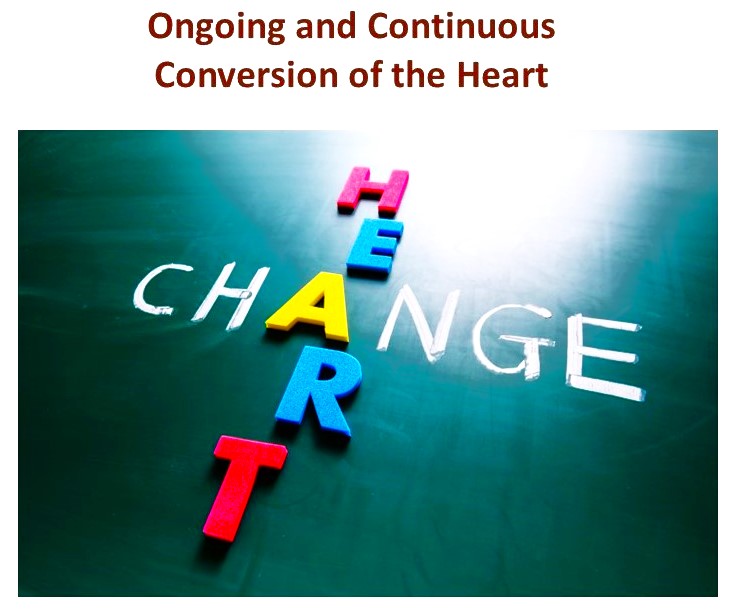
Formation Friday – February 9, 2024
We have interrupted our series on the Rule with commentary for some Lenten inspiration. We publish the resources below each year in hopes that they will help everyone to focus on penance and conversion, so important in the life of a Secular Franciscan.
Thank you to the National Formation Commission for collaborating on this piece.
The Conversion Process: Ongoing and continuous conversion of the heart
For each week of Lent focus on one action item below that you would like to cultivate in a special way as part of your Lenten journey.
- Make an act of reparation or a modification of behavior to show sorrow for sin.
- Be willing to recognize and accept suffering as the consequence of separating myself from God. (Offer sufferings for the benefit of others.)
- Commit to a plan for prayer, fasting, almsgiving. (See: Joel 2:12-18)
- Intentionally evangelize a lukewarm or nonbeliever.
- Ask the Holy Spirit to make me aware of a specific moral shortcoming and for the grace to change.
- Consciously live the Beatitudes.
- Seek personal conversion through deeper prayer.
- Radically commit to the Gospel life centered on the person of Jesus.
- Savor God’s mercy, experiencing the love of God which unceasingly calls us back to Himself.
- Accept myself as I am now and strive to reach a deeper level of conversion.
- Journal on my spiritual journey made up of failures and falls and also made up of new beginnings, new discoveries.
- Use St. Francis’s paraphrase of the Lord’s Prayer for meditation.
(Click on picture below)
Questions for discussion or to answer in your journal.
+Explain how you plan to carry out the items you chose from the list above.
+Which of all the statements above might be most beneficial to your personal conversion?
+Which of the statements are the most challenging for you?
Diane F. Menditto, OFS
Vice Minister, National Fraternity, Secular Franciscan Order USA
Listen – Discern – Go Forth National Theme 2022-2025
Diane F. Menditto, OFS
Vice Minister, National Fraternity, Secular Franciscan Order USA
Listen – Discern – Go Forth National Theme 2022-2025
*************************
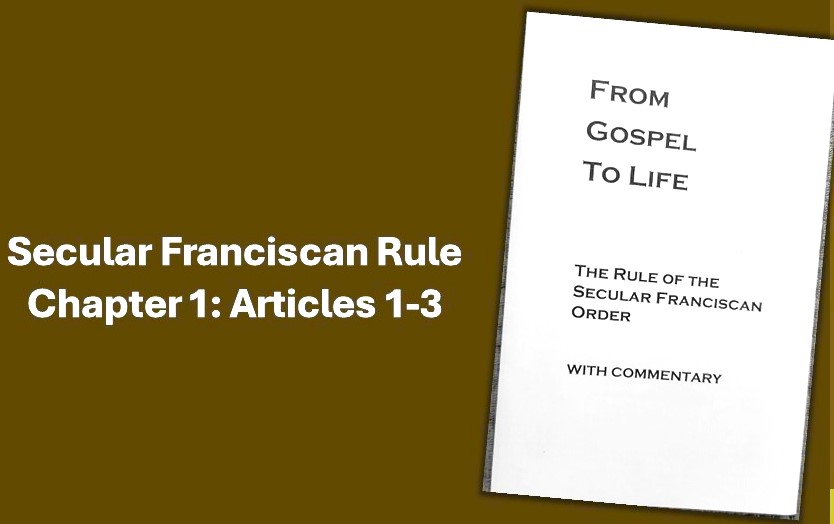
Formation Friday February 2, 2024
(En español abajo)
The OFS-USA National Fraternity has recently published “From Gospel to Life,” the OFS Rule with Commentary. This occasional series highlights the Prologue (See November 17th and 24th) and the articles of the Rule, the commentary, and questions based on this publication for fraternity discussion. You may order “Gospel to Life” at OFS-USA BOOKSTORE
Rule of the Secular Franciscan Order
Chapter 2 Articles 4-5
Article 4: The rule and life of the Secular Franciscans is this: to observe the gospel of our Lord Jesus Christ by following the example of Saint Francis of Assisi, who made Christ the inspiration and the center of his life with God and people.6
Christ the gift of the Father’s love, is the way to him, the truth into which the Holy Spirit leads us, and the life which he has come to give abundantly.7
Secular Franciscans should devote themselves especially to careful reading of the gospel, going from gospel to life and life to the gospel.8
Article 5: Secular Franciscans, therefore, should seek to encounter the living and active person of Christ in their brothers and sisters, in Sacred Scripture, in the Church, and in liturgical activity. The faith of Saint Francis, who often said, “I see nothing bodily of the Most High Son of God in this world except his most holy body and blood,”9 should be the inspiration and pattern of their eucharistic life.
Commentary:
The second chapter of the rule is a thorough and detailed description of the Secular Franciscan way of life. The first part (4–6) gives the meaning of the gospel in the Franciscan tradition. Then conversion and worship are explained as the necessary preconditions for achieving this gospel life (7–8). Finally, 9–19 describes the manner of sharing the Good News of Jesus Christ by how the Secular Franciscans live (10–14) and what they do (15–19). In the light of Scripture and the teachings of Vatican II, this chapter is envisioned as a program for evangelization: how we ourselves are evangelized after the manner of Francis and secondly how we evangelize others.
Article 4: Summarizes the heart of the rule: the very core of the gospel life in intimate union with Christ, or, in the words of St. Paul, “the life I live now is not my own; Christ is living in me” (Gal 3:20). And so, the Secular Franciscan, alive with the spirit of Francis, knows and experiences the Lord Jesus intensely, binding one’s own person with the person of Christ.
Article 5. As the process develops, then the Secular Franciscan seeks out the living and active person of Christ in all spheres of life: liturgical activity (especially the Eucharist), Scripture, Church, and one another (5). Since the sacrificial union with Christ is the most intense and comprehensive experience of his real presence, the celebration becomes the key encounter, as patterned by Francis himself.
For discussion with a partner, in a group, or to comment on in your journal:
+Re-read article 4 and the commentary:
—How is Jesus the “inspiration and center of your life?”
—Explain the meaning of “going from gospel to life and life to the gospel.”
—Challenge yourself to read a portion of the gospel each day—perhaps the gospel of the daily mass. After some time, reflect on how it has influenced your daily life. Has it changed you at all? Why or why not?
+Re-read article 5 and the commentary:
—When do you find it most difficult to see the “living and active person of Christ” in your brothers and sisters? How do you deal with this?
–What is your relationship with the Eucharist? (The answer to this may require much prayer and silence before the Blessed Sacrament.)
Diane F. Menditto, OFS
Vice Minister, National Fraternity, Secular Franciscan Order USA
Listen – Discern – Go Forth National Theme 2022-2025
*************************

Formation Friday January 26, 2024
The OFS-USA National Fraternity has recently published “From Gospel to Life,” the OFS Rule with Commentary. This occasional series highlights the Prologue (See November 17th and 24th) and the articles of the Rule, the commentary, and questions based on this publication for fraternity discussion. You may order at the blue link: “Gospel to Life”
Rule of the Secular Franciscan Order
Chapter 1 Articles 1-3
Article 1: The Franciscan family, as one among many spiritual families raised up by the Holy Spirit in the Church, unites all members of the people of God – laity, religious, and priests – who recognize that they are called to follow Christ in the footsteps of St. Francis of Assisi.
In various ways and forms but in life-giving union with each other, they intend to make present the charism of their common Seraphic Father in the life and mission of the Church.
Article 2: The Secular Franciscan Order holds a special place in this family circle. It is an organic union of all Catholic fraternities scattered throughout the world and open to every group of the faithful. In these fraternities the brothers and sisters, led by the Spirit, strive for perfect charity in their own secular state. By their profession they pledge themselves to live the gospel in the manner of St. Francis by means of this rule approved by the Church.
Article 3: The present rule, succeeding “Memoriale propositi” (1221) and the rules approved by the Supreme Pontiffs Nicholas IV and Leo XIII, adapts the Secular Franciscan Order to the needs and expectations of the Holy Church in the conditions of changing times. Its interpretation belongs to the Holy See and its application will be made by the General Constitutions and particular statutes.
Commentary
Article 1– This first chapter details the place of the Secular Franciscan Order in the Church, the Franciscan Family, and in the history of the Order itself.
The first paragraph shows how the Franciscan Family, as one of the many spiritual families in the Church, is united with all the people of God by the call of the Holy Spirit and the following of Jesus Christ. Still, in addition to this, the way of Francis gives the Franciscan Family, with its common charism but varied expressions, a distinctive cast, as it strives for holiness and binds together the laity, religious, and clergy in the life and mission of the Church.
Article 2- The second paragraph identifies the Secular Franciscan Order as a vital part of the whole family of Francis and points out its special secular character. It also stresses that all the necessary prerequisites are present to make it an official Order within the Catholic Church.
Article 3- The continuity with past rules, its influence in today’s world, and its approval by the Church are discussed in this third paragraph. This rule is the fourth expression in eight centuries. It makes the unchanging principles of Franciscan gospel living applicable and relevant today. The leaders of the Church constantly guide this movement from gospel to life.
For discussion with a partner, small group, or to comment on in your journal:
+As a professed member (or candidate) in the Secular Franciscan Order, in what ways do you feel that you are a member of the Franciscan Family?
+What is “special” about being a Secular Franciscan?
+What is the significance of the Rule in YOUR life as a Secular Franciscan? Give examples.
Diane F. Menditto, OFS
Vice Minister, National Fraternity, Secular Franciscan Order USA
Listen – Discern – Go Forth National Theme 2022-2025
*************************
Formation Friday, January 19, 2024
(En español abajo)
Focus on the Admonitions (#2 and #3)
(Click on Icon below)
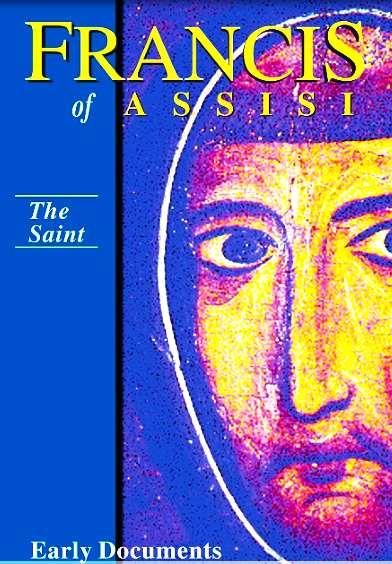
[II. The Evil of Self-Will]b
1The Lord said to Adam: Eat of every tree; you may not eat, however, of the tree of the knowledge of good and evil. Gn 2:16 Gn 2:17
2He was able to eat of every tree of paradise, because he did not sin as long as he did not go against obedience. 3For that person eats of the tree of the knowledge of good who makes his will his own and, in this way, exalts himself over the good things the Lord says and does in him. 4And so, through the suggestion of the devil and the transgression of the command, it became the apple of the knowledge of evil. 5Therefore it is fitting that he suffer the punishment.
[III. Perfect Obedience]
1The Lord says in the Gospel: Whoever does not renounce all that he possesses cannot be my disciple; Lk 14:33 2and: Whoever wishes to save his life must lose it. Lk 9:24
3That person who offers himself totally to obedience in the hands of his prelate leaves all that he possesses and loses his body.a 4And whatever he does and says which he knows is not contrary to his will is true obedience, provided that what he does is good.
5And should a subject see that some things might be better and more useful for his soul than what a prelate commands, let him willingly offer such things to God as a sacrifice; and, instead, let him earnestly strive to fulfill the prelate’s wishes. 6For this is loving obedience because it pleases God and neighbor. 1 Pt 1:22
7If the prelate, however, commands something contrary to his conscience, even though he may not obey him, let him not, however, abandon him. 8And if he then suffers persecution from others, let him love them all the more for the sake of God. 1 Jn 3:15 1 Jn 3:16 9For whoever chooses to suffer persecution rather than wish to be separated from his brothers truly remains in perfect obedience because he lays down his life for his brothers. Jn 15:13 10In fact, there are many religious who, under the pretext of seeing things better than those which the prelate commands, look back, Lk 9:62 and return to the vomit Prv 26:11 of their own will. 11These people are murderers 2 Pt 2:22 and, because of their bad example, cause many to lose their souls
Questions to discuss or to comment on in your journal.
+ Come, Holy Spirit! Open my mind and heart as I contemplate Admonition II.
—As Secular Franciscans, we do not promise “obedience” as such. However, how does sacrificing our own will help us to live out our Rule?
—When do I have the most difficulty following the directives of my lawful superiors?
+ Come, Holy Spirit! Open my mind and heart as I contemplate Admonition III.
—How is obedience related to simplicity and humility?
—What are some ways that I can seek to have a well-informed conscience?
—How does having trust in the Lord help me to let go of my own will?
Diane F. Menditto, OFS
Vice Minister, National Fraternity, Secular Franciscan Order USA
Listen – Discern – Go Forth National Theme 2022-2025
*************************
Formation Friday January 12, 2024
As we begin 2024, we turn from Greccio to Mt. Alverna, (LaVerna) from the Crib to the Cross. This year the Franciscan family will be commemorating St. Francis’s marking with the Stigmata. Although the actual day is September 17, 1224, there will be many opportunities during this year to allow these special marks to mark our lives as Secular Franciscans. We start with an excellent synopsis compiled from the Legenda Minor of St. Bonaventure and shared with us by Deacon David and Thérèse Ream, OFS. Also included below are other resources and some introductory discussion questions.
Stigmata: September 17 (Legenda Minor of St. Bonaventure)
Two years before Francis, the faithful servant of Christ, gave his soul back to God, he was alone on the top of Mt. Alverna. There he had begun a fast of forty days in honor of the archangel Michael and was immersed more deeply than usual in the delights of heavenly contemplation. His soul became aglow with the ardor of fervent longing for heaven as he experienced within himself the operations of grace.
As he was drawn aloft through ardent longing for God one morning near the feast of the Exaltation of the Cross [September 14], and was praying on the mountainside, he saw what appeared as a seraph with six bright wings gleaming like a fire descending from the heights of heaven. As this figure approached in swift flight and came near the man of God, it appeared not only winged but also crucified. The sight of it amazed Francis and his soul experienced joy mingled with pain. He was delighted with the sight of Christ appearing to him so graciously and intimately and yet the awe-inspiring vision of Christ nailed to the cross aroused in his soul a joy of compassionate love.
When the vision vanished after a mysterious and intimate conversation, it left Francis aglow with seraphic love in his soul. Externally, however, it left marks on his body like those of the Crucified as if the impression of a seal had been left on heated wax. The figures of the nails appeared immediately on his hands and feet. The heads of the nails were inside his hands but on top of his feet with their points extending through to the opposite side. His right side too showed a blood-red wound as if it had been pierced by a lance, and blood flowed frequently from it.
Because of this new and astounding miracle unheard of in times past, Francis came down from the mountain a new man adorned with the sacred stigmata, bearing in his body the image of the Crucified not made by a craftsman in wood or stone, but fashioned in his members by the hand of the living God. [Francis was the first person in the history of Christianity to receive the sacred stigmata. The Franciscan Family celebrates the Feast of the Stigmata on September 17.]
Resources:
The Life of St. Francis by Thomas of Celano (FA:ED Vol. 1 p. 263 (Chapter III)
Francis of Assisi: Early Documents – The Saint – (Click on picture)
Centenary Resources: Stigmata
The Stigmata Celebration of the 800th Anniversary
Questions for discussion or to answer in your journal:
+What struck you about the description given above?
+How does meditating on this great gift given to St. Francis help you to come closer to Christ?
+What puzzles or surprises you about Francis’s receiving the stigmata?
+List some incidents in Francis’s life or passages in his writings that help you to understand why God might have given Francis this gift
*************************
Formation Friday January 5, 2024
(Recursos en español abajo)
Taking Stock 2024 Our Lives of Prayer as Secular Franciscans
“As Minister General of a large Order, St. Bonaventure provided, among other things, spiritual direction for those seeking God. In a letter to Poor Clare nuns, he offered directives as to how we might enter into prayer by way of ‘descent.’
“The steps are summarized as follows:
- Return to yourself; Enter into your heart;
- Ponder what you were, are, should have been, called to be;
- What you are by nature;
- What you are through sin;
- What you should have been through effort;
- What you can still be through grace;
- Meditate in your heart;
- Let your spirit brood. (Are you resentful, angry, jealous?);
- Plow this field, work on yourself;
- Strive for freedom within, the freedom that leads to relationship with God, realizing that God will never force us to love him;
- Lack of self-knowledge and failure to appreciate one’s own worth make for faulty judgment in all other matters;
- If you are not able to understand (and accept) your own self, you will not be able to understand (or accept) what is beyond you.”
Bonaventure, Perfectione vitae ad sorores (Perf. Vit.) 1.5 (VIII, 109). Engl. trans. Jose de Vinck, “On the Perfection of Life, Addressed to Sisters,” in The Works of Bonaventure, vol. 1, Mystical Opscula (Paterson, N.J.: Saint Anthony Guild Press, 1960), 214.
Quoted in: Delio, Ilia. Franciscan Prayer (Kindle Locations 613-616). Kindle Edition.
For our Prayer Journey as Secular Franciscans
- We take as our “book” the poor and crucified Christ
- Our “inspiration” the writings of Francis, Clare, Bonaventure
- Our “guide” the Holy Spirit
- Our “model” Mary
- Our “core” the gospel
- Our “focus” the life of penance we profess to live
- Our “sustenance” the Eucharist, Sacraments and prayer.
FUN Manual The rule of the SFO page 27 of 46
Questions for discussion or to comment on in your journal
+How has your prayer life changed over the years?
+If you are a Secular Franciscan, how does your prayer reflect who you are as member (or candidate) of the Order?
+Does prayer influence how you live your life?
+Based on St. Bonaventure’s directives above, how can you strengthen your prayer life?
